NFL
Super Bowl Tournament: A Big Game Bracket to Crown the Greatest NFL Champion of All Time
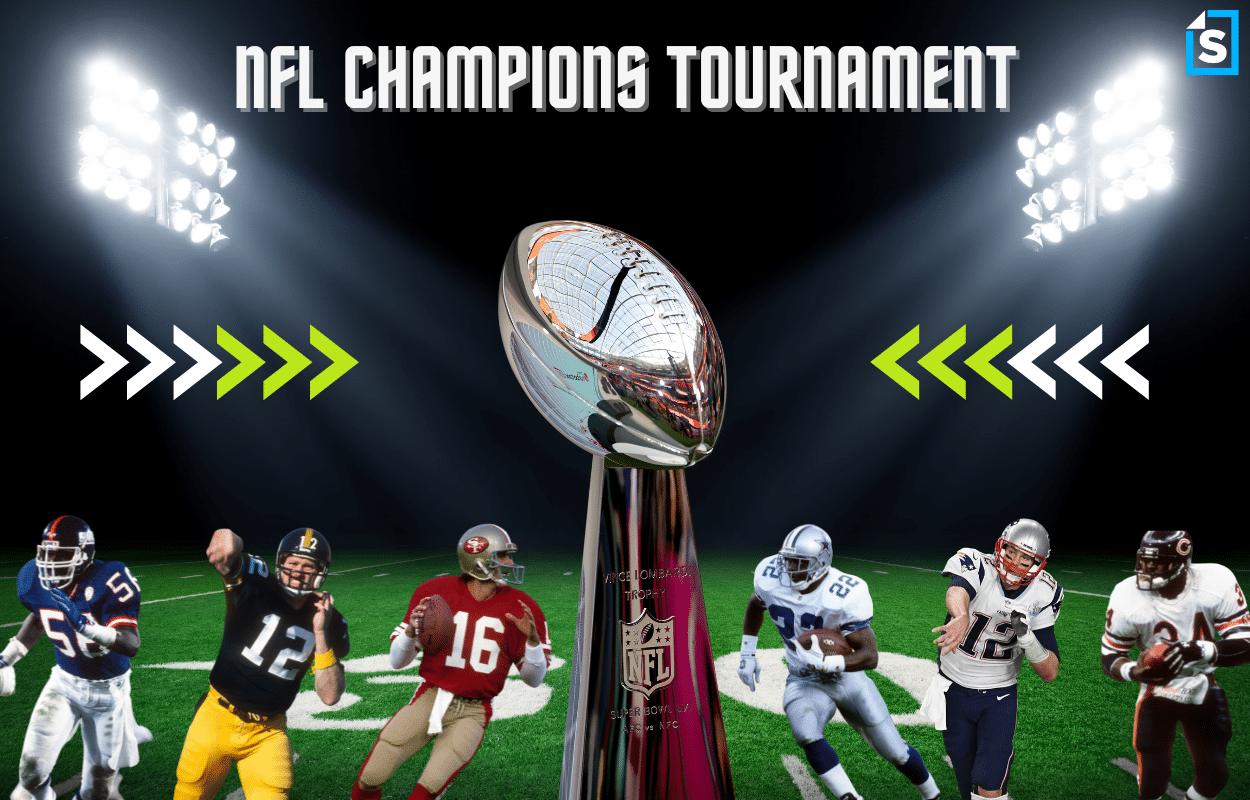
Welcome to Sportscasting’s Super Bowl tournament to crown the greatest NFL champion of all time.
The format here is simple. As this started prior to the 2022 campaign, we assigned seeds to the first 56 Big Game winners, creating matchups you’ve likely never even thought about.
As for how the seeding was done, we took emotion out of the process to create a fair and impartial bracket. Regular-season winning percentage was the primary determinant. As there were obviously plenty of ties in that department, the first tiebreaker was the margin of victory in the Super Bowl.
As this is a Super Bowl tournament, that had to come into play somewhere, right?
When a second tiebreaker was needed — and it did come up a few times — the overall point differential from each team’s respective season was used. And that was enough to get our bracket.
With 56 teams involved, the top eight seeds received an opening-round bye, and here are those eight teams:
- 1972 Miami Dolphins
- 1985 Chicago Bears
- 1984 San Francisco 49ers
- 1976 Oakland Raiders
- 1982 Washington Commanders
- 1989 San Francisco 49ers
- 1986 New York Giants
- 1998 Denver Broncos
And the best part is that you, our loyal Sportscasting readers, decided the outcome with a fan vote for each and every game.
Super Bowl Tournament Opening Round
(32) 2000 Baltimore Ravens vs. (33) 2002 Tampa Bay Buccaneers
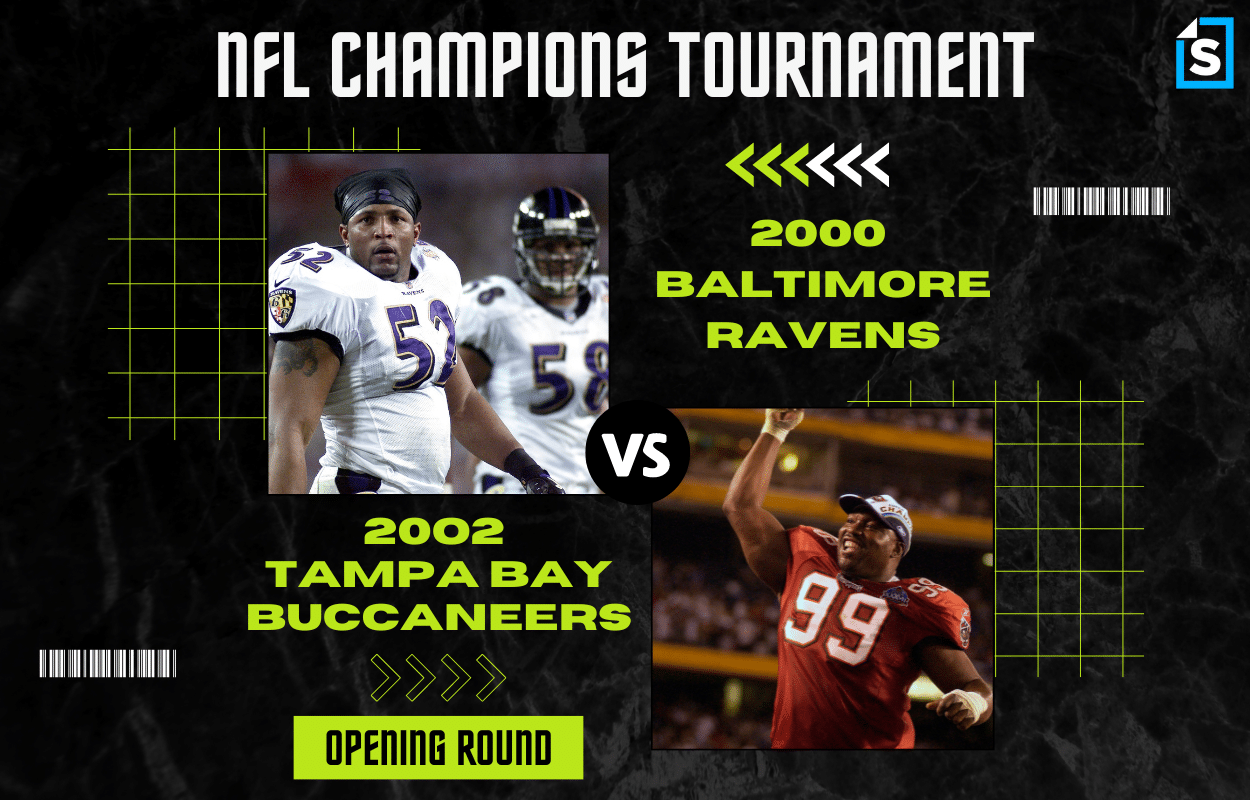
In their first four years of existence, the Baltimore Ravens had never even finished above .500, their best season coming in 1999 at 8-8. But that all changed in 2000 as Brian Billick led the team to a 12-4 mark, good for second place in the AFC Central and the No. 4 seed on the AFC side of the postseason bracket.
After dismantling the fifth-seeded Denver Broncos in the Wild Card Round, 21-3, Ray Lewis and the vaunted Baltimore defense stifled the top-seeded Tennessee Titans in a surprise 24-10 victory. Baltimore then knocked off the second-seeded Oakland Raiders, 16-3, in the AFC Championship Game before dismantling the New York Giants, 34-7, in Super Bowl 35.
Riding a string of three consecutive playoff appearances, the 2002 Tampa Bay Buccaneers won the NFC South with a 12-4 record, earning them the No. 2 seed in the postseason and a first-round bye.
Led by Defensive Player of the Year Derrick Brooks, the Bucs’ defense displayed its dominance in the Divisional Round as Tampa Bay trounced the fourth-seeded San Francisco 49ers, 31-6. Jon Gruden’s group scored another big win in the NFC Championship, easily knocking off the top-seeded Philadelphia Eagles, 27-10, before stomping the Oakland Raiders in the Super Bowl, 48-21.
| Team | 2000 Ravens | 2002 Buccaneers |
|---|---|---|
| Record | 12-4 | 12-4 |
| Super Bowl | Def. NY Giants 34-7 | Def. Oakland Raiders 48-21 |
| SB MVP | Ray Lewis | Dexter Jackson |
It doesn’t get much more evenly matched than this, which is why this is the 32 vs. 33 matchup. You’ve got the same regular-season record and the same margin of victory in the Super Bowl. Both defenses were incredible, and there’s no edge at quarterback, with Trent Dilfer under center for the Ravens and Brad Johnson taking snaps for the Bucs.
Winner: 2000 Baltimore Ravens
While the seeding was close here, the vote wasn’t as Ray Lewis and the Ravens took 75% of the vote. And that was the right call. Had the seeding not been calculated formulaically, I certainly would’ve had Baltimore higher, given that defense.
So what is the Ravens’ prize for this victory? A date in the opening game of the Round of 32 with the top-seeded and undefeated 1972 Miami Dolphins. Look for that one come Week 9.
(17) 1975 Pittsburgh Steelers vs. (48) 2005 Pittsburgh Steelers
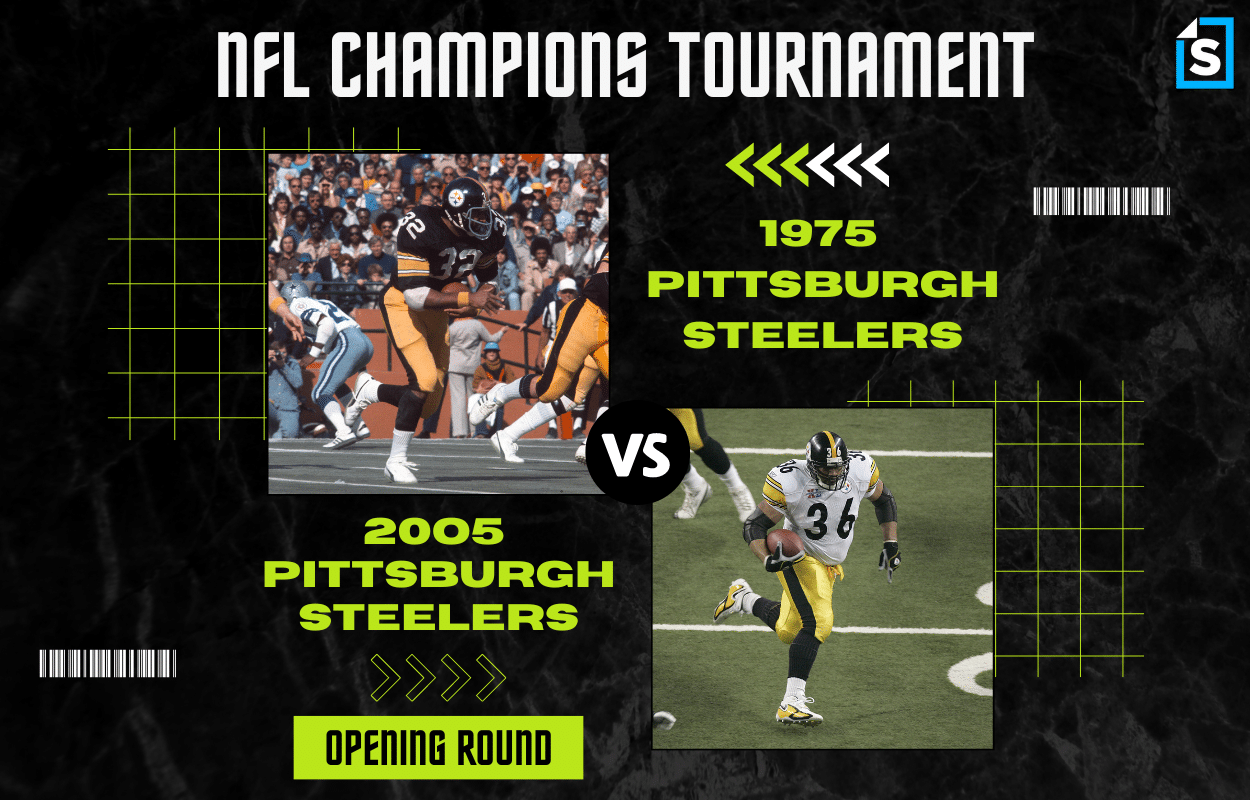
You just have to love what random seeding can create, don’t you? Holding six of the 56 slots in this tournament, the Pittsburgh Steelers are tied for the most Super Bowl victories of all time. But one of those squads is going home early.
Coming off the franchise’s first Super Bowl win, the 1975 Steelers dominated for a second straight season, going 12-2 in the regular season to claim the No. 1 seed in the AFC. Defensive Player of the Year Mel Blount led a dominating defense that put up its best numbers since 1946, and Terry Bradshaw led an offense that scored more points than any other team in Steelers history up to that point, a mark that wouldn’t be broken until 2010.
Pittsburgh gave up just 10 points each to the Colts and Raiders in the AFC Playoffs but did get a test in Super Bowl 10 from Tom Landry’s Cowboys. But the Steelers had enough to pull out a four-point victory, a win that featured MVP Lynn Swann’s famous grab.
Despite an 11-5 record, the 2005 Steelers just snuck into the postseason as the sixth and final seed in the AFC, needing a four-game win streak to close out the year to do so. But once they were in, Ben Roethlisberger & Co. did some damage.
Pittsburgh first knocked off the rival Bengals, who won the AFC North with the same 11-5 record, and did so in convincing fashion, 31-17. They then shocked Peyton Manning and the top-seeded 14-2 Colts in the Divisional Round, 21-18, before stomping the second-seeded 13-3 Broncos in the AFC title game, 34-17. The Steelers became only the second team in NFL history and the first in two decades to win three postseason games on the road.
They then locked up title number five as they bested the Seattle Seahawks in Super Bowl 40, 21-10, sending Jerome Bettis into retirement as a champion.
| Team | 1975 Steelers | 2005 Steelers |
|---|---|---|
| Record | 12-2 | 11-5 |
| Super Bowl | Def. Dallas Cowboys 21-17 | Def. Seattle Seahawks 21-10 |
| SB MVP | Lynn Swann | Hines Ward |
If nothing else, wouldn’t you love to see Chuck Noll and Bill Cowher on opposing sidelines just scowling at one another?
The ’75 Steelers are obviously the favorite here. You’ve got loads of Hall of Famers and the historic Steel Curtain defensive line, which might not bode too well for Big Ben, who currently holds the record for the most times sacked in NFL history. But just imagine the collisions when Bettis attempts to ram through that line. Oh, the humanity.
Winner: 1975 Pittsburgh Steelers
This was another blowout, which it should have been, as the ’75 Steelers easily took care of their counterparts from 40 years later by earning a whopping 88.9% of the vote. There’s really not much analysis needed here. The old-school squad simply had more weapons.
Up next for Bradshaw and his boys is a date with another famous No. 12.
(16) 1977 Dallas Cowboys vs. (49) 2018 New England Patriots
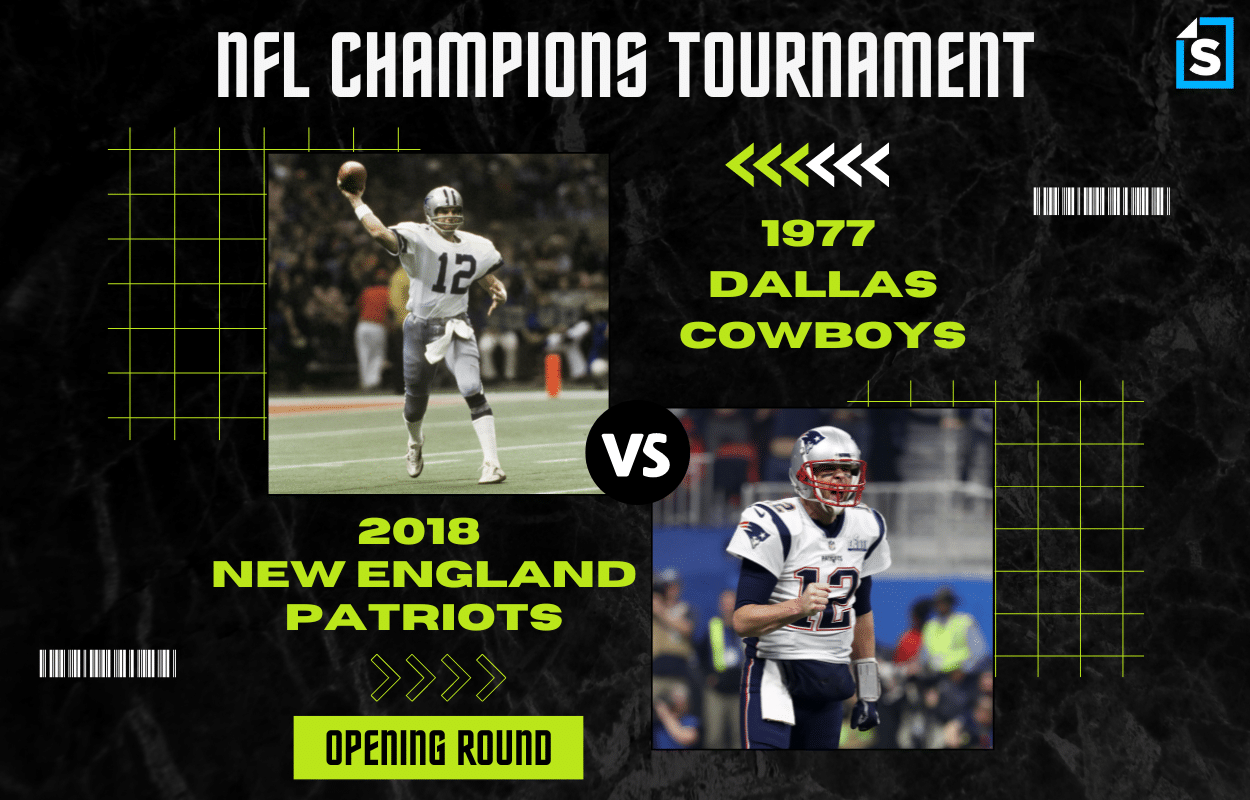
Closing out the first trio of opening-round games sees a matchup of two of the best to wear No. 12 as Roger Staubach and the 1977 Dallas Cowboys take on Tom Brady and the 2018 New England Patriots.
The ’77 Cowboys were the last Super Bowl-winning team to play a 14-game regular season, as two games were added to the schedule the following year. And it was quite the regular season for America’s Team as they went 12-2 to easily lock up the No. 1 seed in the NFC.
While the league scoring average was just 17.2 points per game, the Cowboys averaged an NFL-best 24.6, thanks in large part to rookie running back Tony Dorsett, who became just the second player in franchise history to rush for 1,000 yards. He also added a dozen touchdowns.
But the defense was just as strong as Defensive Player of the Year Harvey Martin and company held opponents to just 12.47 points per game. The Cowboys breezed through the NFC bracket, beating the Bears and Vikings by a combined 47 points, and then torched the Broncos in Super Bowl 12, 27-10. Martin and Randy White shared MVP honors.
Coming off a gut-wrenching loss to the Eagles in Super Bowl 52, the 2018 Patriots got off to a rocky start on their journey back to the title game. Bill Belichick & Co. started 1-2 and took double-digit losses to the Jaguars and Lions, which is never fun. But the Pats righted the ship and won 10 of their next 13 games to finish with an 11-5 mark, good enough for a 10th straight AFC East title and the No. 2 seed in the AFC.
The 2018 campaign saw the emergence of a young Patrick Mahomes, who won NFL MVP in leading the Kansas City Chiefs to the top seed with a 12-4 mark. Seen as Brady’s heir apparent in the AFC, the second-year stud was ready to take his place among the elite, but TB12 had other plans.
After New England disposed of the Chargers in the Divisional Round, they traveled to Kansas City for a high-profile showdown that lived up to its billing. With the score tied at 31 after 60 minutes, Brady didn’t even let young Mahomes touch the ball, leading the Pats on a 75-yard drive in overtime to secure a 37-31 win.
And in Super Bowl 53, Brady didn’t even have to do that much work as the New England defense held the LA Rams to just a field goal in a 13-3 victory. This was the Patriots’ sixth and final Super Bowl victory.
| Team | 1977 Cowboys | 2018 Patriots |
|---|---|---|
| Record | 12-2 | 11-5 |
| Super Bowl | Def. Denver Broncos 27-10 | Def. LA Rams 13-3 |
| SB MVP | Harvey Martin/Randy White | Julian Edelman |
Some may think the 2018 Patriots are seeded a bit low at No. 49. Honestly, though, that just shows how strong every team in this tournament is. And, come on, I know a lot of you love seeing Brady seeded so low.
Truthfully, this wasn’t Belichick’s strongest unit. But wouldn’t it be a blast to see what Brady could do against that vaunted Cowboys defense? On the flip side, it might not be fun for the New England defense, who didn’t even crack the top 20 in 2018, against Staubach and the Dallas offense.
Winner: 2018 New England Patriots
Ladies and gentlemen, we have our first upset as the 49th-seeded Patriots knock off the 16th-seeded Cowboys, earning them a date with the ’75 Steelers. What, nobody wanted to reminisce about those old-school Dallas-Pittsburgh Super Bowl matchups in the ’70s?
It was a close vote as Brady & Co. just edged out Staubach’s squad, earning 54.5% of the vote. Honestly, this wasn’t much of a surprise to me. Given the divisive nature of both of these franchises, I expected a tight race, and that’s what we got. In an actual game, I’d also predict a close matchup, with both teams having a shot at the end to win.
(9) 1991 Washington Commanders vs. (56) 2011 New York Giants
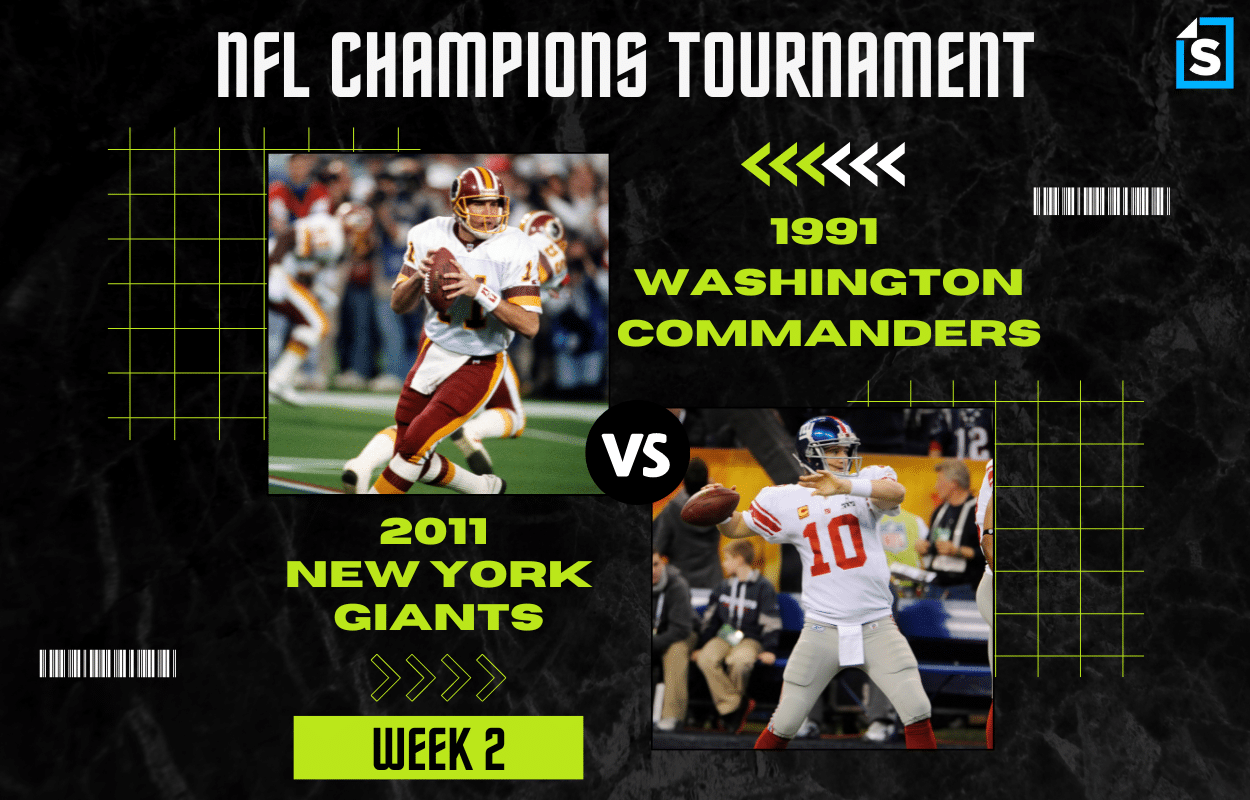
Coming off a solid 10-6 season in 1990 that ended in a Divisional Round loss to the San Francisco 49ers, the Washington Commanders (go ahead and scream at me all you want — I’m not using the old name) came back in 1991 with one of the strongest seasons in franchise history.
NFL Coach of the Year Joe Gibbs led his squad to a league-best 14-2 record and the No. 1 seed in the NFC Playoffs. And those two losses were by a combined five points. Washington led the NFL in offense, scoring 485 points, and allowed the second-fewest points at 224.
They coasted through the NFC bracket, first taking out the sixth-seeded Falcons, 24-7, and then destroyed Barry Sanders and the second-seeded Lions in the conference title game, 41-10. Washington then easily disposed of Buffalo in Super Bowl 26, 37-24, handing the Bills their second of four straight losses in the Big Game. Mark Rypien led the way with 292 yards and two touchdown passes and was named the game’s Most Valuable Player.
With the worst regular-season record of any Super Bowl champion at 9-7, the 2011 New York Giants are the lowest-seeded team in our tournament. Earning the fourth seed in the conference due to a weak NFC East that season, the Giants went on an incredible postseason run as they had four years earlier.
In the Wild Card Round, the G-Men knocked off the fifth-seeded Falcons, 24-2. In the Divisional Round, New York roughed up the top-seeded Packers at Lambeau Field, 37-20. And in the NFC title game, New York bounced second-seeded San Francisco in overtime, 20-17.
And, again, just as he’d done four years earlier, Eli Manning did what nobody thought he could and beat Tom Brady and the heavily-favored Patriots in the Super Bowl, winning MVP for a second time. He completed 30 of 40 passes for 296 yards and a touchdown in the Giants’ 21-17 victory.
| Team | 1991 Commanders | 2011 Giants |
|---|---|---|
| Record | 14-2 | 9-7 |
| Super Bowl | Def. Buffalo Bills 37-24 | Def. New England Patriots 21-17 |
| SB MVP | Mark Rypien | Eli Manning |
ln my eyes, the Giants are the lowest-seeded team in this tournament for a reason. But there’s no denying that Eli’s group knew how to get it done when it mattered, even against clearly better teams. And that 1991 Washington squad is the better team from top to bottom. And, yes, that’s me saying that Mark Rypien was better than Eli Manning, which I genuinely believe.
Winner: 1991 Washington Commanders
This was far closer than it should have been, with Washington’s 1991 unit grabbing just 54.5% of the vote. Do you think it’s because Eli has become a lot more likable these days with the ManningCast? Whatever the reason, his 2011 Giants snagged a surprising 45.5% of the vote. We’ll see him again down the line when his 55th-seeded 2007 team gets another shot at Tom Brady.
As for Washington, Rypien & Co. will square off with the blowout winner of this next matchup.
(24) 2017 Philadelphia Eagles vs. (41) 1974 Pittsburgh Steelers
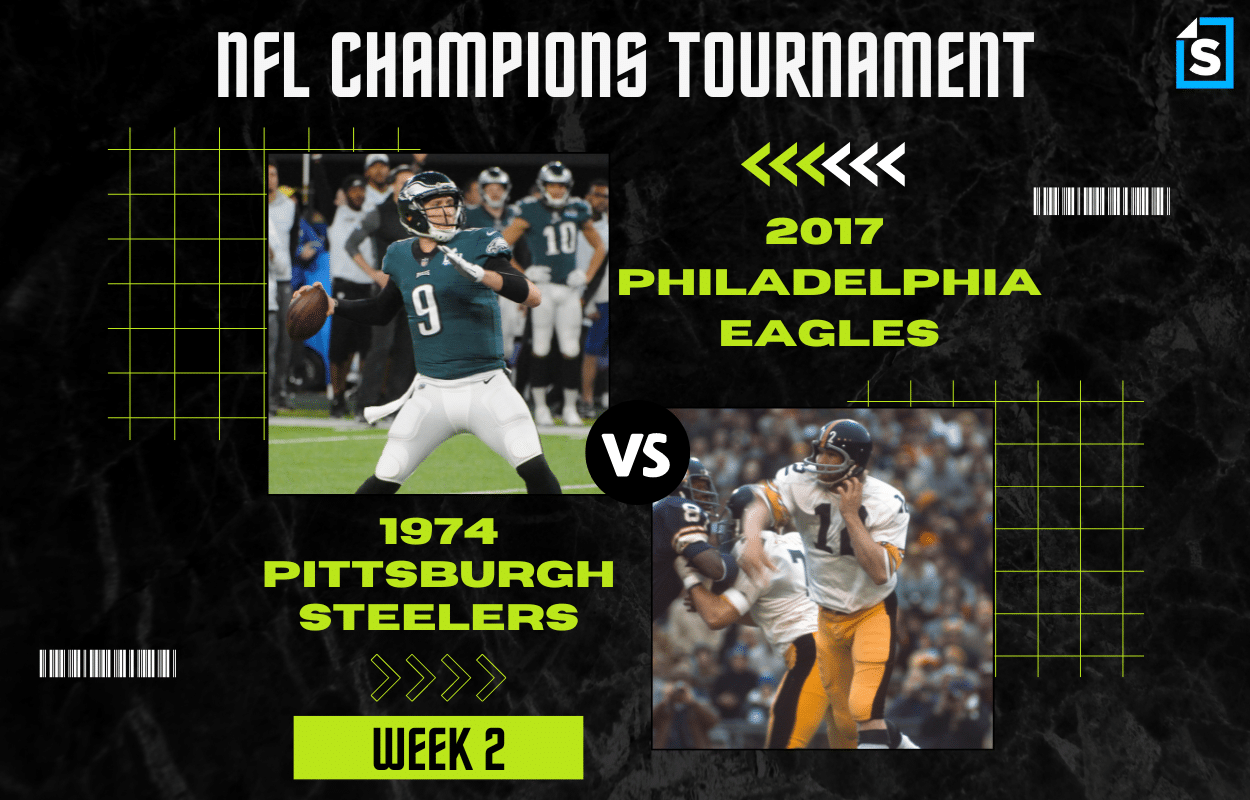
Some might be surprised that the 2017 Philadelphia Eagles are the higher seed here. But given how things played out with the underdog mentality that came when Nick Foles was forced to replace an injured Carson Wentz, it’s easy to forget the Birds went 13-3 in the regular season to earn the top seed in the NFC.
While a lot of experts counted the Eagles out when Wentz went down in Week 14, Philly just kept going. After edging out the sixth-seeded Falcons in the Divisional Round, 15-10, the Eagles torched the second-seeded Vikings in the NFC Championship, 38-7, setting up a matchup with NFL MVP Tom Brady and the defending champion New England Patriots.
And what a matchup it was. In a dramatic affair that saw several Super Bowl records fall, Foles refused to let the Eagles lose, throwing for 373 yards and three touchdowns and catching one of his own in the famed “Philly Special” play call on the way to a 41-33 victory.
The 1974 Pittsburgh Steelers kicked off the dynasty that won four Super Bowls in six seasons. Led by a defense that included Defensive Rookie of the Year Jack Lambert and Defensive Player of the Year “Mean” Joe Greene, the Steelers went 10-3-1 in the regular season to win the first of six consecutive AFC Central titles.
Pittsburgh breezed through the AFC Playoffs, first beating the wild-card Bills, 32-14, before knocking off the rival Oakland Raiders in the AFC title game, 24-13. It was the third straight year the Steelers and Raiders met in the postseason, with Pittsburgh winning twice. They’d meet again the next two years, each winning once.
In Super Bowl 9, Pittsburgh matched up with Fran Tarkenton and the Minnesota Vikings, who’d lost the Super Bowl the previous year to the Miami Dolphins. And while the Vikes’ Purple People Eaters defense held Terry Bradshaw to just 96 yards passing, they couldn’t stop Franco Harris, who rushed for 158 yards and a touchdown to win MVP honors.
And the Steelers’ defense certainly did its job, holding the Vikings to just six points in the 10-point victory.
| Team | 2017 Eagles | 1974 Steelers |
|---|---|---|
| Record | 13-3 | 10-3-1 |
| Super Bowl | Def. New England Patriots 41-33 | Def. Minnesota Vikings 16-6 |
| SB MVP | Nick Foles | Franco Harris |
A high-octane Eagles offense against the always-tough Steelers defense? Yes, please. So who do you have taking this battle of Pennsylvania?
Winner: 1974 Pittsburgh Steelers
I guess Nick Foles didn’t have another upset in him, as his ’17 Eagles were blown out in this matchup by the ’74 Steelers, who earned a whopping 83.3% of the vote.
While this is technically an upset, given the seeding, it really doesn’t feel like one. As mentioned, this was the Steelers team that kicked off the Pittsburgh dynasty, and it was loaded on both sides of the football. Up next for the black and gold is a date with another NFC East team as Bradshaw & Co. take on the ’91 Commanders in the Round of 32.
(25) 1999 St. Louis Rams vs. (40) 1995 Dallas Cowboys
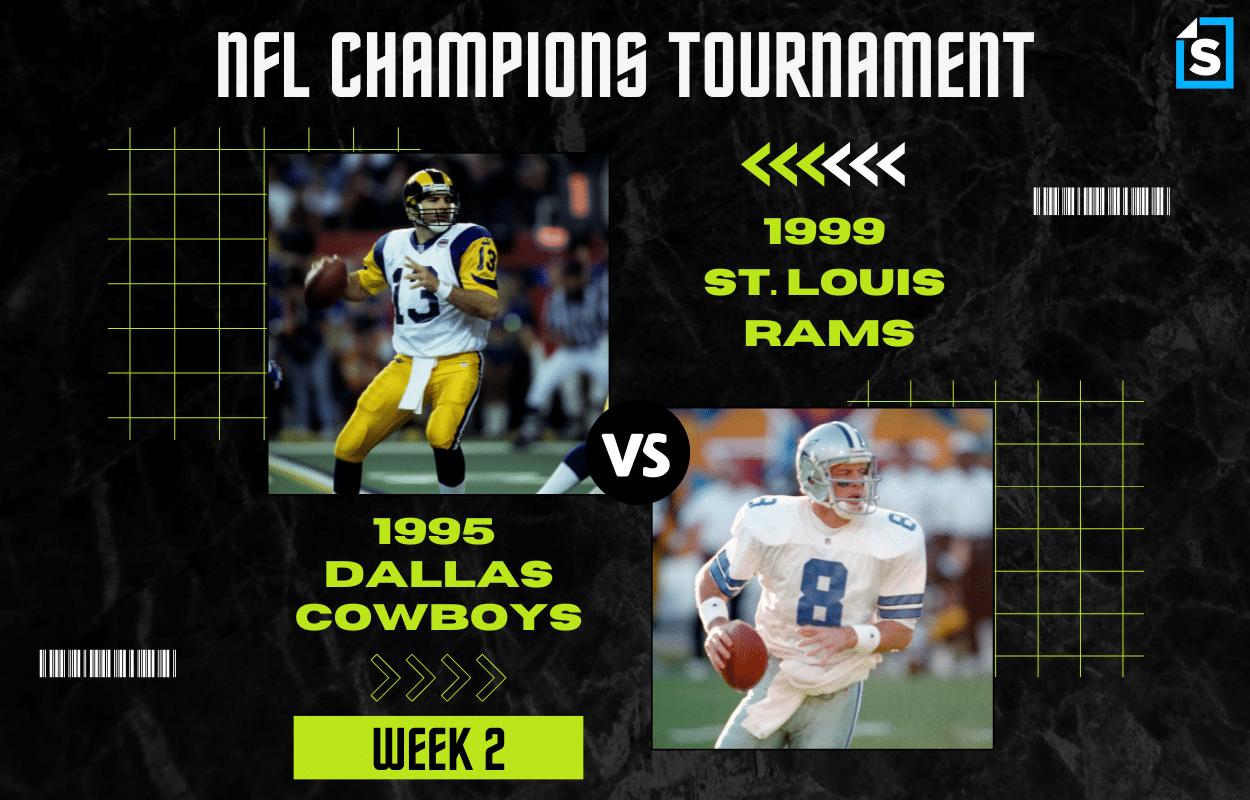
What’s not to love about the 1999 St. Louis Rams? The franchise hadn’t had a winning season in a decade but made some significant changes ahead of the ’99 campaign, most notably bringing in running back Marshall Faulk, who had a phenomenal year and was the runner-up in the NFL MVP vote.
And to whom did he lose? That would be Rams QB Kurt Warner, a true journeyman who came out of nowhere to lead St. Louis to a 13-3 record and the top seed in the NFC. With Faulk and wideouts Isaac Bruce and Torry Holt, the famed “Greatest Show on Turf,” which I recently calculated would still be the No. 1 offense in today’s NFL, was an absolute joy to watch and put up 6,412 yards and averaged nearly 33 points per game.
After knocking out the Vikings and Buccaneers en route to Super Bowl 34, the Rams engaged in one of the most dramatic title games of all time against the Tennessee Titans, winning 23-16. Oddly enough, it was a play from the St. Louis defense that’s most remembered as linebacker Mike Jones famously stopped Titans wideout Kevin Dyson one yard short of the goal line as time expired.
Some see the 1995 Dallas Cowboys as the weakest of Jerry Jones’ three title teams in the ’90s, but they were still pretty damn good. As if America’s Team didn’t have enough star power (total pun intended) with the trio of Troy Aikman, Emmitt Smith, and Michael Irvin, Deion Sanders, who helped the 49ers beat Dallas the previous year in the NFC title game, was added to the mix.
After going 12-4 in the regular season to earn the No. 1 seed in the NFC, the Cowboys matched up in the Divisional Round with the rival Eagles, who’d scored 58 points in their wild-card win over the Lions. But the Dallas defense held them to just 11 points in a 19-point win. The Cowboys then knocked off Brett Favre and the Packers in the conference championship game, 38-27, setting up a date with the Steelers in Super Bowl 30.
While Dallas won the game by 10, 27-17, it was actually a lot closer. And despite all the stars (sorry, I can’t help myself) on their roster, Larry Brown emerged as the hero, picking off two passes to become the first cornerback to take MVP honors. Although some might say Steelers quarterback Neil O’Donnell was the real MVP as it almost looked as if he was actually targeting Brown on those two game-changing interceptions.
| Team | 1999 Rams | 1995 Cowboys |
|---|---|---|
| Record | 13-3 | 12-4 |
| Super Bowl | Def. Tennessee Titans 23-16 | Def. Pittsburgh Steelers 27-17 |
| SB MVP | Kurt Warner | Larry Brown |
Just think of the buildup this matchup would’ve gotten. Troy Aikman vs. Kurt Warner. Emmitt Smith vs. Marshall Faulk. So many incredible receivers, with Michael Irvin, Jay Novacek, Isaac Bruce, and Torry Holt. And, again, Deion Sanders right there in the mix. I’m not going to lie. This is one of my favorite first-round matchups.
Winner: 1999 St. Louis Rams
This was a fairly close vote, which I expected as I genuinely believe this would have been a very close football game. In the end, the ’99 Rams won out, 60% to 40%, which has me thinking they would have won by a score of 31-21.
While Deion keeps either Bruce or Holt somewhat in check, he can’t cover both. So whichever one he didn’t cover likely torches Larry Brown for two scores. Sorry, Larry, I know you were the Super Bowl MVP, but Kurt Warner ain’t Neil O’Donnell and isn’t gifting you two picks. So two scores from Bruce or Holt, a pair of TDs from Marshall Faulk, and a field goal get the job done.
Up next for “The Greatest Show on Turf” is a date with John Elway and the eighth-seeded 1998 Denver Broncos.
(29) 1969 Kansas City Chiefs vs. (39) 1979 Pittsburgh Steelers
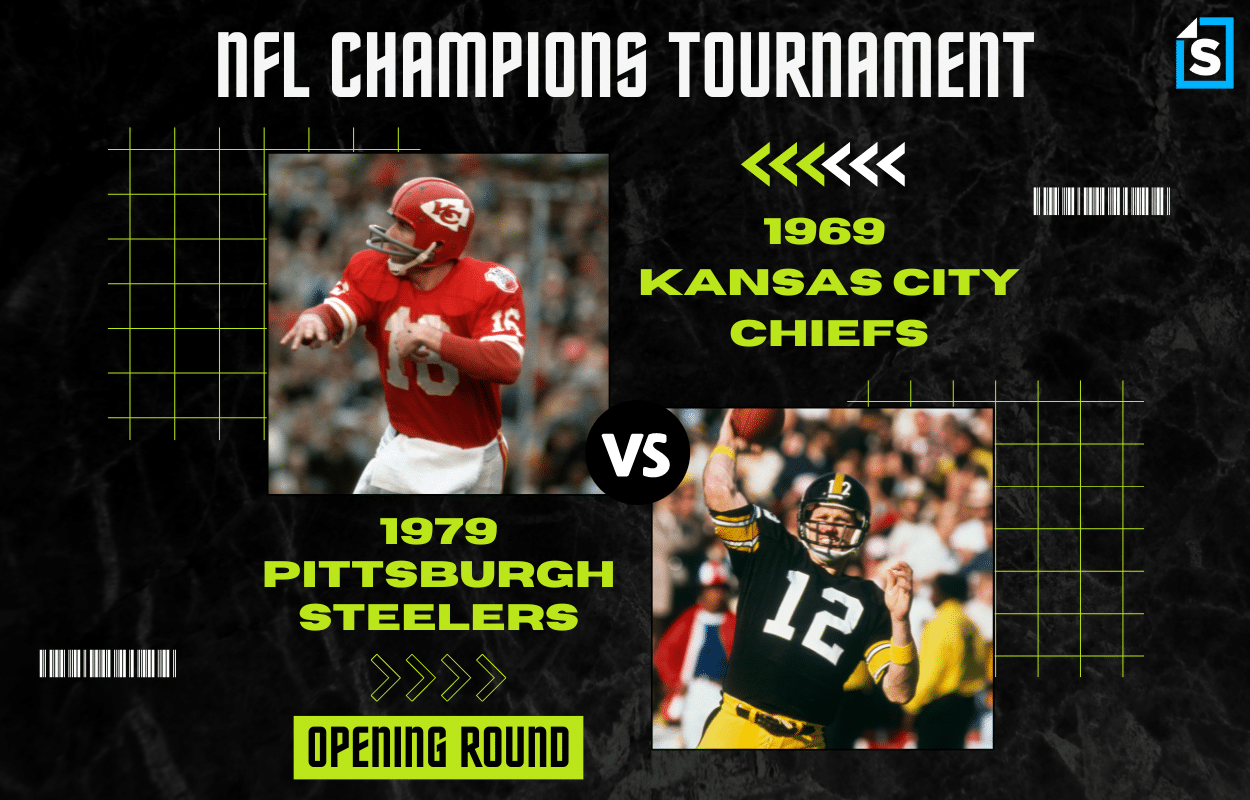
While the NFL was celebrating its 50th season in 1969, the AFL was wrapping up its 10-year existence ahead of the 1970 merger. A year earlier, the Kansas City Chiefs had gone 12-2 to get into the AFL Playoffs but were destroyed in the opening round by their Western Division rivals, the Oakland Raiders, by a score of 41-6.
The ’69 Chiefs season was nearly ruined by an injury to legendary quarterback Len Dawson, but backup Mike Livingston filled in beautifully, going undefeated in his six starts as Kansas City went 11-3 and finished second in the West behind the 12-1-1 Raiders.
The KC defense was incredible that season and was just the fourth team in pro football history to lead its league in the fewest rushing yards allowed, the fewest passing yards allowed, and the fewest total yards allowed. ESPN once ranked this defense as the seventh-best in history.
In the opening round of the AFL Playoffs, the Chiefs knocked off the defending Super Bowl champion New York Jets. They then got revenge on the Raiders in the AFL title game, upsetting their rivals 17-7 to earn a Super Bowl 4 matchup with the Minnesota Vikings.
Kansas City made easy work of the Purple People Eaters in the final AFL-NFL showdown, easily winning 23-7.
The 1979 Steelers were the last Super Bowl-winning team of the ’70s Pittsburgh dynasty and earned the No. 2 seed in the AFC with a 12-4 regular-season record. Jack Lambert was named AFC Defensive Player of the Year for the second time in four years, leading a unit that gave up just 16.4 points per game. And Terry Bradshaw’s offense led the league in scoring, averaging 26 points per game.
Pittsburgh was never truly tested in the AFC bracket, easily taking care of the third-seeded Miami Dolphins in the Divisional Round, 34-14, before disposing of the fourth-seeded Houston Oilers in the conference title game, 27-13.
In Super Bowl 14, the Steelers squared off with the LA Rams, who beat the top two seeds in the NFC, the Dallas Cowboys and Tampa Bay Buccaneers, on their way to the title game. But a third upset wasn’t in the cards, as Pittsburgh was just too much to handle.
Behind 309 yards and a pair of touchdown passes from Bradshaw, who earned his second straight Super Bowl MVP trophy, the Steelers won their fourth title in six years with a 31-19 victory.
| Team | 1969 Chiefs | 1979 Steelers |
|---|---|---|
| Record | 11-3 (AFL) | 12-4 |
| Super Bowl | Def. Minnesota Vikings 23-7 | Def. LA Rams 31-19 |
| SB MVP | Len Dawson | Terry Bradshaw |
Perhaps the most fun fact about the ’79 Steelers? This was the last Super Bowl-winning unit to feature an entire roster of players who’d never suited up for another team. Their 46-man roster featured 40 original draft picks and six free agents out of college. Just a different world today, isn’t it?
Winner: 1979 Pittsburgh Steelers
Well, this wasn’t even close in the slightest, as the ’79 Steelers took a whopping 83.3% of the vote. And while the ’69 Chiefs were the higher seed here, this was probably the right call. I’ll admit to voting for Pittsburgh myself for the upset, but this really isn’t a huge upset in my eyes.
The Steelers were the first great Super Bowl-winning dynasty for a reason, and this ’79 squad now moves on to a huge Round of 32 matchup with another great team from the decade in John Madden’s 1976 Raiders.
(20) 1992 Dallas Cowboys vs. (45) 2021 Los Angeles Rams
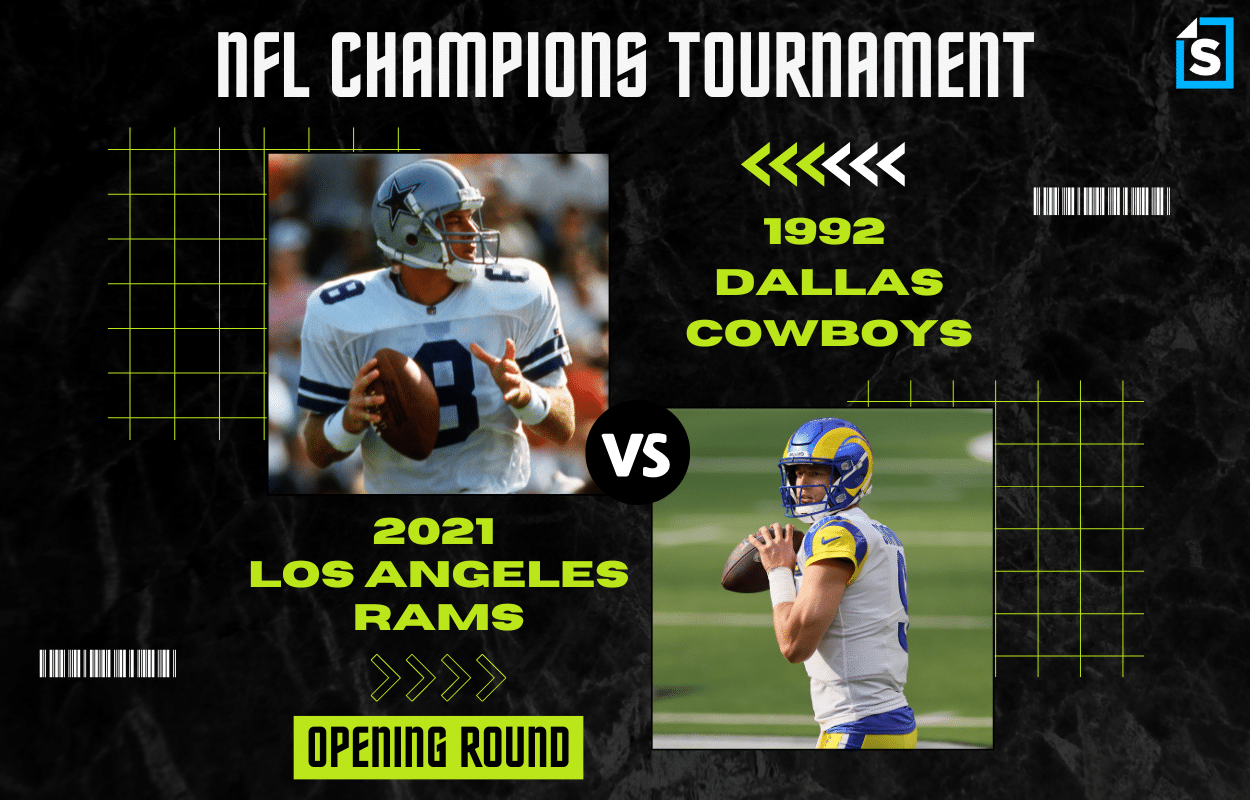
Just three years removed from a 1-15 campaign, Jerry Jones watched his Dallas Cowboys go 13-3 in 1992 to win their NFC East title since 1984.
Led by the trio of Troy Aikman (3,445 passing yards, 23 TDs), Emmitt Smith (1,713 rushing yards, 19 total TDs), and Michael Irvin (1,396 receiving yards, 7 TDs), the Cowboys’ offense was one of the highest-ranked in the NFL that year, averaging 25.6 points per game.
But while it’s often easy to remember the Triplets, let’s not forget the Dallas defense was ranked No. 1 in 1992, a dynamic group that featured the likes of Ken Norton Jr., Charles Haley, Tony Tolbert, and Russell Maryland, among others.
While experience is often essential when making a Super Bowl run, that wasn’t an overall factor for the ’92 Cowboys, as they were the youngest team in the NFL.
Dallas entered the postseason as the No. 2 seed in the NFC and made easy work of the rival Eagles in the Divisional Round, winning 34-10 to set up another rivalry game with the top-seeded 14-2 San Francisco 49ers for the right to go to Super Bowl 27.
The Niners were the only team to average more points than the Cowboys in the regular season, but the Dallas defense held Steve Young and Jerry Rice’s group to 20 points in a 30-20 upset.
In the Super Bowl, America’s team squared off with the Buffalo Bills, who made their third consecutive appearance in the title game. But Jim Kelly & Co. never stood a chance as the Cowboys rolled over the Bills, 52-17, behind MVP Troy Aikman, who completed 73.3% of his passes for 273 yards and four touchdowns with no interceptions.
Despite leading the LA Rams to a Super Bowl just a few years earlier, Jared Goff was traded prior to the 2021 season for longtime Lions QB Matthew Stafford. And it’s safe to say the move worked out quite nicely for Sean McVay.
Stafford quickly developed fantastic chemistry with Cooper Kupp, who had one of the most outstanding wide receiver campaigns in NFL history, winning the Triple Crown with 145 catches for 1,947 yards and 16 touchdowns. And it certainly didn’t hurt Stafford when the Rams signed Odell Beckham Jr. midway through the season.
In another significant move near the halfway point, LA added former Super Bowl MVP to a defense that already featured three-time NFL Defensive Player of the Year Aaron Donald.
Following a three-game losing streak after starting the year 7-1, the Rams only lost once the rest of the way, a Week 18 overtime defeat to the San Francisco 49ers, which didn’t mean much as they’d already locked up the NFC West.
They entered the postseason as the No. 4 seed in the NFC and decimated the Cardinals in the Wild Card Round, 34-11, before upsetting Tom Brady and the reigning Super Bowl champion Buccaneers in the Divisional Round, 30-27. LA then ended the Cinderella run of the sixth-seeded Niners in the NFC Championship Game, 20-17.
The Rams got another tough battle in Super Bowl 56 against the No. 4 seed in the AFC, the Cincinnati Bengals. But despite losing OBJ early, LA hung tough and walked away with a 23-20 victory. Kupp finished off his dominant year by winning Super Bowl MVP, catching eight passes for 92 yards with two touchdowns.
| Team | 1992 Cowboys | 2021 Rams |
|---|---|---|
| Record | 13-3 | 12-5 |
| Super Bowl | Def. Buffalo Bills 52-17 | Def. Cincinnati Bengals 23-20 |
| SB MVP | Troy Aikman | Cooper Kupp |
You just gotta love the seeding in this tournament sometimes, as we get our second Cowboys vs. Rams matchup in as many weeks. Personally, I think the ’92 Cowboys win this game. It might not be the blowout they had against the Bills in that first of three Super Bowl wins in the ’90s, but with that talent and that youth and that coaching staff, I see Dallas cruising to a 14-point win.
Winner: 1992 Dallas Cowboys
I guess I wasn’t the only one to think the Cowboys would win this one, as they earned exactly three-quarters of the vote here. So that evens things out between these two teams in the tournament, as the ’99 Rams eliminated the ’95 Cowboys a few games back.
But I’ve got a feeling the next game for this edition of America’s team might be a little closer.
(13) 2003 New England Patriots vs. (52) 2010 Green Bay Packers
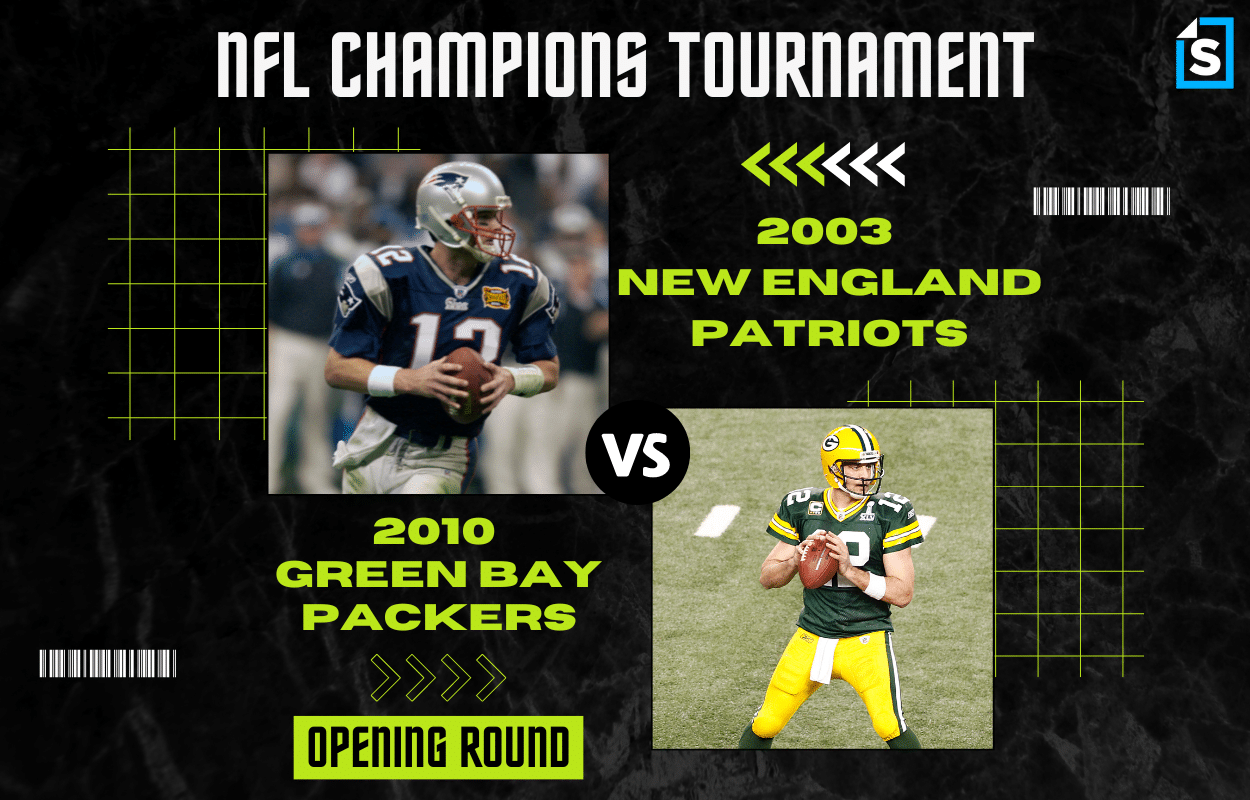
Following their Cinderella run to the Super Bowl in 2001, the New England Patriots actually missed the postseason in 2002, going 9-7.
And the 2003 season didn’t start particularly well either as Bill Belichick & Co. lost two of their first four games, including a 31-0 thumping at the hands of the Buffalo Bills to start the year. But those two defeats were the only two the Pats took.
While Tom Brady and the New England offense were solid enough, scoring 21.8 points per game, good for 12th in the NFL, the defense was the main reason the Patriots went 14-2 to clinch the No. 1 seed in the AFC.
Despite the loss of Lawyer Milloy, a salary-cap casualty just five days before the season began, the Pats’ defense, which included the likes of Ty Law, Richard Seymour, Willie McGinest, Rodney Harrison, and Tedy Bruschi, gave up a league-low 14.9 points per game.
New England survived a scare from the fifth-seeded Tennessee Titans in the Divisional Round, hanging on for a 17-14 victory, and then ousted Peyton Manning and the third-seeded Indianapolis Colts in the AFC title game, 24-14.
In Super Bowl 38, the defense was a little off, giving up 29 points to the Carolina Panthers. But behind 354 yards and three touchdown passes by Brady, who won his second Super Bowl MVP, the New England offense put up 32 for a three-point victory.
Some might not like Aaron Rodgers’ lone Super Bowl win being seeded so low, but it is what it is as his 2010 Green Bay Packers snuck into the postseason as the No. 6 seed in the NFC with a 10-6 record. Rodgers and the Green Bay offense averaged 24.3 points per game, good enough for 10th in the league.
But like the ’03 Pats, the true strength of the ’10 Packers was the defense, led by Clay Matthews and Charles Woodson, which only allowed 15 points per game, second-best in the NFL that season to only the Pittsburgh Steelers.
The Packers kicked off their playoff run with an upset victory over the third-seeded Eagles in Philadelphia, 21-16, but weren’t expected to go any further as they matched up with the top-seeded Atlanta Falcons in the Divisional Round.
But that proved to be no problem for the Packers as they routed Atlanta, 48-21, behind three touchdown passes from Rodgers, who also ran in another to set up a date with the Chicago Bears in the NFC Championship Game.
And as he typically does, Rodgers disposed of Green Bay’s biggest rival, 21-14, to take his team to Super Bowl 45, where the Packers matched up with the aforementioned Steelers. But Pittsburgh’s defense wasn’t so daunting that night at Cowboys Stadium as Rodgers threw for 304 yards and three touchdowns with no picks en route to winning Super Bowl MVP in a 31-25 victory.
| Team | 2003 Patriots | 2010 Packers |
|---|---|---|
| Record | 14-2 | 10-6 |
| Super Bowl | Def. Carolina Panthers 32-29 | Def. Pittsburgh Steelers 31-25 |
| SB MVP | Tom Brady | Aaron Rodgers |
To me, this is a no-brainer, as the ’03 Patriots are just the better team overall. And that’s not solely because of the difference in regular-season records. Of Green Bay’s six losses, none were by more than four points, and two were in overtime. So they were in every game they played.
I just don’t think the Green Bay offense would have enough to take down that New England defense, despite what it did to that Steelers unit in the Super Bowl. Furthermore, history sides with Brady here as he’s only suffered one loss to Rodgers throughout his career, at least at this point. (Update: TB12 lost to Rodgers in Week 3 of the ’22 season, the same week this fictional game was played.)
Winner: 2003 New England Patriots
As it typically goes in the Brady-Rodgers storyline, TB12 came out on top here, with the ’03 Patriots earning 60% of the vote to set up a date with the ’92 Cowboys, which will likely end up being one of my favorite matchups in the Round of 32.
And for those wanting a little more old-school Brady, here you go.
(12) 2004 New England Patriots vs. (53) 1988 San Francisco 49ers
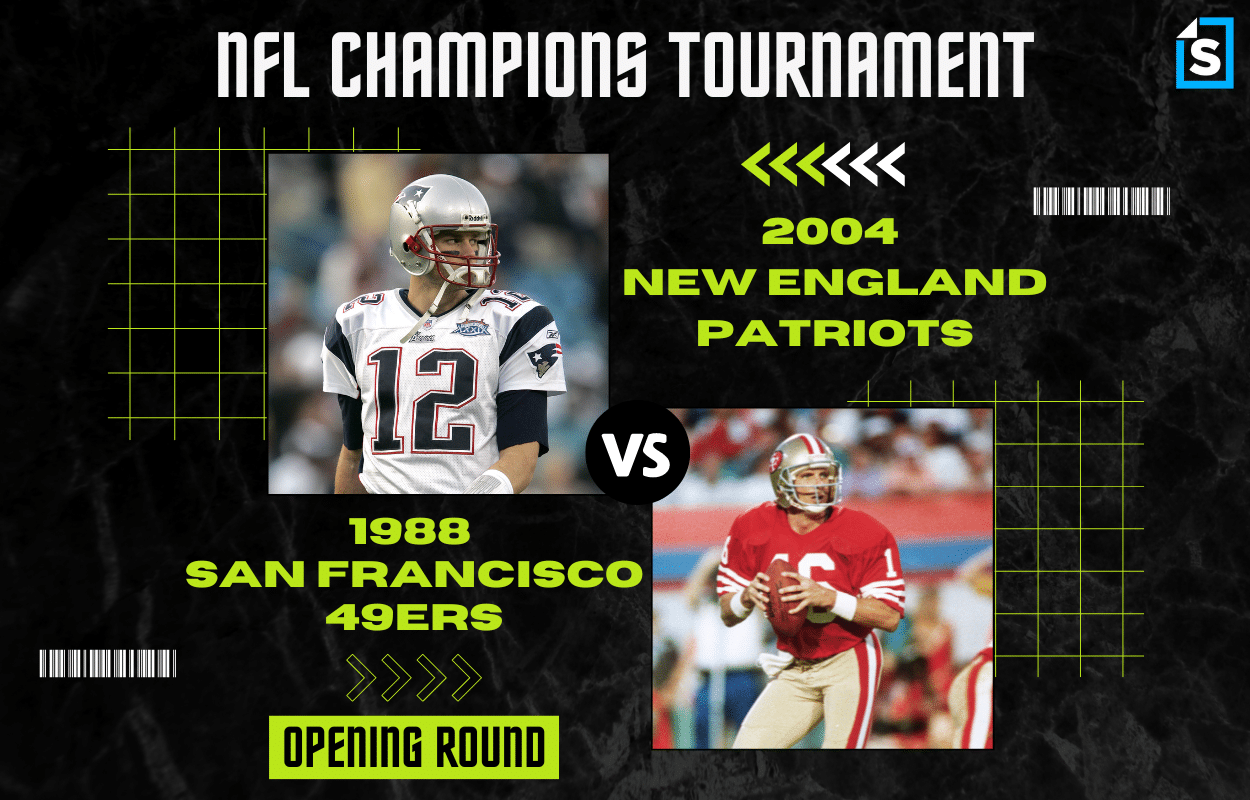
For those who love to compare Tom Brady and Joe Montana, here’s your dream matchup.
Coming off a 14-2 season in 2003 and a second Super Bowl victory in three seasons, the New England Patriots were again dominant in 2004. The Patriots’ offense ranked fourth in the NFL in scoring, averaging 27.3 points per game, behind a solid season from TB12, who threw for 3,692 yards and 28 touchdowns, the latter tying his career-best at the time.
Bill Belichick added running back Corey Dillon to the mix in the offseason, who rushed for a career-high 1,635 yards and 12 touchdowns.
The New England defense took a significant hit when Ty Law suffered a season-ending foot injury in a Halloween loss to the Steelers. Belichick was forced to adjust as the other starting cornerback, Tyrone Poole, had been injured just two weeks earlier. But Asante Samuel, then in just his second season, stepped up, as did undrafted free agent Randall Gay. Even wide receiver Troy Brown chipped in to assist on defense.
And it all worked just fine as the Patriots gave up the second-fewest points in the league en route to a second consecutive 14-2 season.
Despite the impressive mark, New England was the No. 2 seed in the AFC behind the 15-1 Steelers. Following a first-round bye, the Patriots made easy work of Peyton Manning’s Indianapolis Colts in the Divisional Round, 20-3, setting up a showdown with Pittsburgh and highly-touted rookie quarterback Ben Roethlisberger.
But the Pats went into Heinz Field and gave Big Ben his first loss as a starter, picking him off three times in a 41-27 victory to earn a trip to Super Bowl 39, where they faced a strong 13-3 Eagles team.
And this first Super Bowl matchup with Philly went much better for Brady than did the second years later. He completed 23 of 33 passes, nearly half of those to game MVP Deion Branch, for 236 yards and two touchdowns in a 24-21 win.
The Patriots remain the most recent back-to-back Super Bowl winners and were just the second franchise to win three Super Bowls in four years, joining the 1990s Dallas Cowboys.
Eleven games through the 1988 season, the San Francisco 49ers were 6-5 and in danger of missing the playoffs for the first time since the strike-shortened 1982 campaign. And that certainly wasn’t the way Bill Walsh envisioned his final season with the Niners going.
But his team rallied to win four of its final five games to win the NFC West with a 10-6 record to earn the No. 2 seed in the NFC.
Joe Montana didn’t have his most outstanding season, completing just 59.9% of his passes, the lowest percentage of his career as a starter, for 2,981 yards with 18 touchdowns and 10 interceptions. But Roger Craig picked up the slack, winning Offensive Player of the Year with a career-high 1,502 rushing yards with nine touchdowns, also adding 534 receiving yards to accumulate a league-best 2,036 yards from scrimmage.
In the Divisional Round of the postseason, the Niners exacted some revenge on the Vikings, who’d bounced them from the playoffs the year before after San Francisco went 13-2 in the regular season. The 49ers had no trouble with Minnesota this time, easily winning 34-9.
The Niners then upset the top-seeded Chicago Bears in the NFC Championship Game, 28-3, earning a trip to Super Bowl 23, where they faced the Cincinnati Bengals in a title-game rematch from seven years earlier.
Montana had a fantastic showing that night in Miami, completing 23 of 36 passes for 357 yards and two touchdowns. Eleven of those passes were caught by MVP Jerry Rice, who set a Super Bowl record with 215 receiving yards. But John Taylor played the hero, catching a 10-yard, go-ahead touchdown pass with just 34 seconds remaining to give San Francisco a 20-16 victory.
| Team | 2004 Patriots | 1988 49ers |
|---|---|---|
| Record | 14-2 | 10-6 |
| Super Bowl | Def. Philadelphia Eagles 24-21 | Def. Cincinnati Bengals 20-16 |
| SB MVP | Deion Branch | Jerry Rice |
Are the 49ers seeded a little low here? Yeah, maybe. But, again, they were in serious danger of missing the postseason before getting hot late in the year. So that 10-6 record held them back as the seeding played out. Was it the best Montana Niners team? Absolutely not. But they were still pretty damn good.
But, obviously, so were those ’04 Patriots. That group won back-to-back Super Bowls for a reason. Think about it. Including the postseason, Brady & Co. went 34-4 over those two years. And, yes, I know we’re just supposed to focus on the 2004 team. But you know what I mean. They’re a top-12 seed and deservedly so.
Winner: 1988 San Francisco 49ers
Well, the masses have spoken, and it’s Montana over Brady as the 53rd-seeded ’88 Niners took two-thirds of the vote to upset the 12th-seeded ’04 Patriots.
Truthfully, I expected this to be a bit closer. And if I’m really being honest, I went the other way here as I genuinely believe New England was the better overall team here. Take the ’89 Niners, and I might feel differently. But we’ll never know what would have happened there now. And, like all of you, I only get the one vote.
The fun part about this upset is that Montana now squares off with the man who replaced him in San Francisco.
(21) 1994 San Francisco 49ers vs. (44) 1987 Washington Commanders
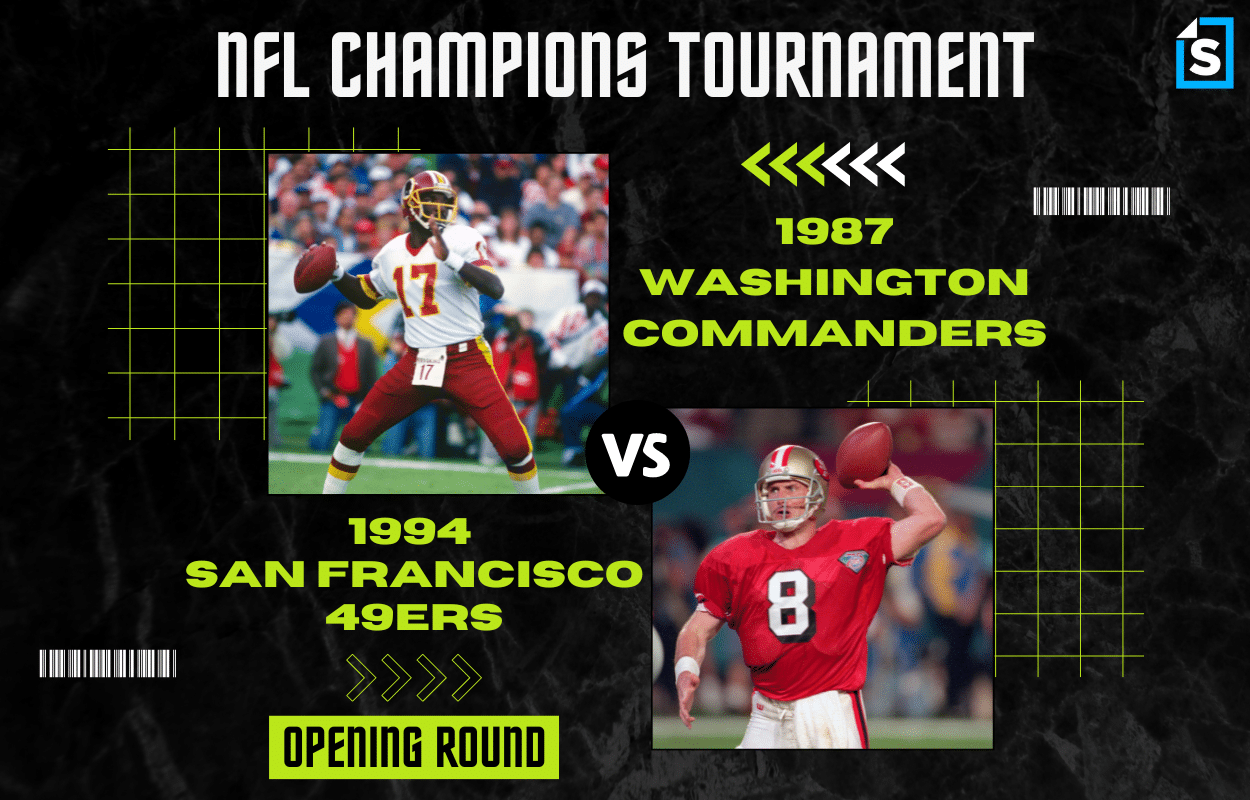
If not for the Dallas Cowboys, we might look at the 1990s San Francisco 49ers with Steve Young and Jerry Rice as one of the great dynasties in NFL history.
After losing the NFC Championship Game to America’s Team following the ’92 and ’93 campaigns, the Niners added a little more firepower by signing Deion Sanders ahead of the ’94 season. And how did “Prime Time” do in his lone season in a San Francisco uniform?
Pretty damn well, I’d say. He won Defensive Player of the Year honors after recording six interceptions, three of which he returned for touchdowns. Two picks were returned at least 90 yards, making Sanders the first NFL player in history to do so. Deion finished fourth in the NFL MVP voting. Another Sanders, Barry, finished second, but the other two were also 49ers. And we’ve already mentioned both their names.
Finishing third in the vote was Jerry Rice, who did Jerry Rice things in catching 112 passes for a league-high 1,499 yards and 13 touchdowns.
But the runaway MVP winner was Niners quarterback Steve Young, who completed a ridiculous 70.3% of his passes, a career-high, for 3,969 yards and an NFL-best 35 touchdowns. He also rushed for 293 yards and seven scores to help the San Francisco offense lead the league in scoring at 31.6 points per game.
The 49ers went 13-3 in the regular season to take the No. 1 seed in the NFC and decimated the sixth-seeded Bears in the Divisional Round, 44-15. The victory set up a third straight NFC title game matchup with the Cowboys, and San Francisco wouldn’t be denied this time around, beating their rivals by 10, 38-28, to earn a trip to Super Bowl 29.
Most saw the NFC Championship Game as the title game that year as the AFC representative in the Super Bowl, the San Diego Chargers, really didn’t stand a chance against either San Francisco or Dallas. And the Niners proved that with a 49-26 win behind a ridiculous performance from Young, who threw six touchdowns, which remains a Super Bowl record to this day.
The 1987 NFL season was certainly interesting as replacement players played several games due to the 24-day strike that began after Week 2, which also shortened the season to 15 games. Honestly, if I’m a Commanders fan, which I’m not, I’d be hoping for some sort of strike every year. There were two NFL strikes in the 1980s, and Washington won the Super Bowl both years.
But this 1987 Washington team was still solid. The previous season, Joe Gibbs’ group had gone 12-4 and knocked the defending champion Bears out of the playoffs en route to the NFC title game, where they lost to the eventual champion New York Giants, who are the No. 7 seed in this tournament.
So this Washington group was legit. In 1987, they finished fourth in offense and sixth in defense on the way to an 11-4 record, good for the No. 3 seed in the NFC.
Gibbs made the interesting choice to bench starting quarterback Jay Schroeder ahead of the playoffs in favor of Doug Williams, who started just two games in the regular season. But the move worked out just fine.
In the Divisional Round, Washington again knocked off the Bears, 21-17, to send Walter Payton into retirement. And they then took care of the Vikings in the NFC Championship, 17-10, to set up a date with John Elway and the Denver Broncos in Super Bowl 22.
The Washington defense gave Elway fits that night at Jack Murphy Stadium in San Diego as No. 7 completed 36.8% of his passes and threw three interceptions. On the other side, Williams played a fantastic game, winning Super Bowl MVP by completing 62.1% of his passes for 340 yards and four touchdowns in a 42-10 romp.
And that was after getting a six-hour root canal done the day before. It was a historic night as Williams became the first Black quarterback to win a Super Bowl.
| Team | 1994 49ers | 1987 Commanders |
|---|---|---|
| Record | 13-3 | 11-4 |
| Super Bowl | Def. San Diego Chargers 49-26 | Def. Denver Broncos 42-10 |
| SB MVP | Steve Young | Doug Williams |
As fun as the ’87 Washington story is with the replacement players (the famous win over a fully-loaded Cowboys team actually inspired The Replacements film with Keanu Reeves) and Doug Williams and beating Elway in the Super Bowl and such, they don’t beat the ’94 Niners.
That San Francisco team was loaded on both sides of the ball, and I don’t even think this game would be close.
Winner: 1994 San Francisco 49ers
It took a little time, but we finally have our first shutout as the 1994 San Francisco 49ers earned 100% of the vote in knocking the 1987 Washington squad out of the tournament. Just look a couple of sentences up, and you’ll see that’s exactly what I expected here. The ’94 Niners just had too much for Joe Gibbs’ team to compete, and I’m obviously not the only one who thought that.
So now we’re set for Young and Rice vs. Montana and Rice in the Round of 32. So that should be an interesting vote.
(28) 1971 Dallas Cowboys vs. (37) 2006 Indianapolis Colts
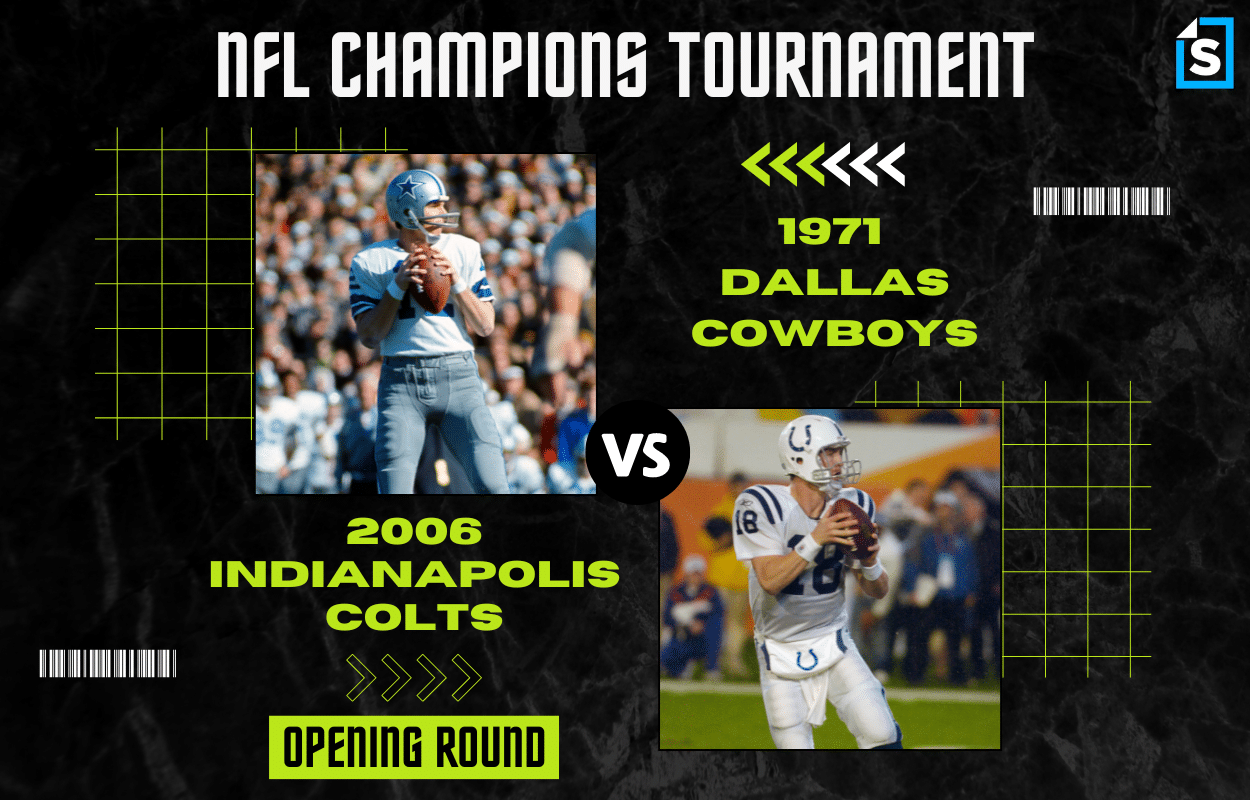
Coming off a heartbreaking three-point loss to the Baltimore Colts in Super Bowl 5, the 1971 Dallas Cowboys didn’t get off to the most remarkable start and were just 4-3 at the midway point of the 14-game regular season.
As third-year quarterback Roger Staubach was coming into his own, Tom Landry alternated him and veteran Craig Morton as the starter in the first half of the year before finally handing the reins to Staubach full-time in Week 8.
And the Cowboys didn’t lose the rest of the way.
Dallas finished with an 11-3 record, good for a sixth consecutive division title. Staubach finished the regular season with a 10-0 record and was the NFL’s highest-rated quarterback, leading the top-ranked Cowboys offense to a league-best 29 points per game.
In the Divisional Round, Dallas knocked off the Central Division champion Vikings, who also went 11-3, by a score of 20-12, setting up an NFC Championship Game rematch with the San Francisco 49ers.
A year earlier, the Cowboys had defeated the Niners on the road, 17-10. And this time around, at home, Dallas emerged triumphant once again, 14-3, setting up a Super Bowl 6 date with the Miami Dolphins.
As it had done against San Francisco, the underrated Dallas defense gave up just a field goal to Miami while the Cowboys offense did its thing in an easy 24-3 win. Staubach wasn’t flashy, completing 12 of 19 passes for 119 yards, but he threw two touchdowns and no picks en route to winning Super Bowl MVP. That was the last game the Dolphins lost for a while.
Coming off a fantastic 2005 regular season in which they went 14-2 but had another disappointing postseason, losing in the Divisional Round, Peyton Manning and the Indianapolis Colts finally got over the hump in 2006.
They weren’t quite as good in the regular season, going 12-4, but it was good enough for a fourth straight division title and the No. 3 seed in the AFC. While the defense wasn’t overly strong, ranking 23rd of 32 teams, the offense was plenty potent, ranking second.
Manning, who finished third in the NFL MVP vote behind LaDainian Tomlinson and Drew Brees, had another fantastic year, completing 65% of his passes for 4,397 yards with a league-best 31 touchdowns against just nine interceptions.
The Colts kicked off the postseason with an easy Wild Card Round victory over the sixth-seeded Chiefs, 23-8, and the Indy defense came through again in the Divisional Round in an ugly 15-6 win over the second-seeded Ravens.
Fittingly, the Colts didn’t face the top-seeded Chargers in the AFC Championship Game as San Diego was upset in the Divisional Round by the fourth-seeded New England Patriots, setting up a Manning-Brady showdown for the ages.
The Pats kept Manning in check in the first half and took a 21-6 lead into the final 30 minutes. But the Colts came out firing in the second half, scoring 15 unanswered points to tie the game at 21-21. Four lead changes later, Indianapolis came out on top, winning 38-34 in an instant classic.
You know how it was almost a foregone conclusion that the Boston Red Sox would win the 2004 World Series after getting past the New York Yankees? That’s how it felt with Manning and the Colts getting past TB12 and the Patriots en route to Super Bowl 41.
With all due respect to the ’06 Chicago Bears, who were the No. 1 seed in the NFC with a 13-3 record, they were never winning that Super Bowl. It may have felt like it when Devin Hester returned the opening kickoff for a touchdown, but this was No. 18’s coronation.
Manning won MVP honors by completing 25 of 38 passes that night in Miami for 247 yards with a touchdown in a 29-17 win, giving the Colts their first championship since Johnny Unitas’ 1970 unit knocked off the Dallas Cowboys in Super Bowl 5.
So how’s that for coming full circle?
| Team | 1971 Cowboys | 2006 Colts |
|---|---|---|
| Record | 11-3 | 12-4 |
| Super Bowl | Def. Miami Dolphins 24-3 | Def. Chicago Bears 29-17 |
| SB MVP | Roger Staubach | Peyton Manning |
Despite the difference in seeding, I see this as a pretty even matchup. As mentioned, the ’06 Colts’ defense wasn’t great, but it stepped up in the postseason. I give Manning the edge over Staubach in the quarterback department, but Staubach won just as many Super Bowls as his counterpart in this game.
Winner: 2006 Indianapolis Colts
Well, it seems as if enough people thought the Indy defense would come through in the clutch again, as the ’06 Colts took 60% of the vote. And I’m good with that. This was a pretty even matchup overall, and Peyton Manning & Co. will next look for a much bigger upset as they take on the fifth-seeded 1982 Washington Commanders.
(31) 1983 Los Angeles Raiders vs. (34) 1993 Dallas Cowboys
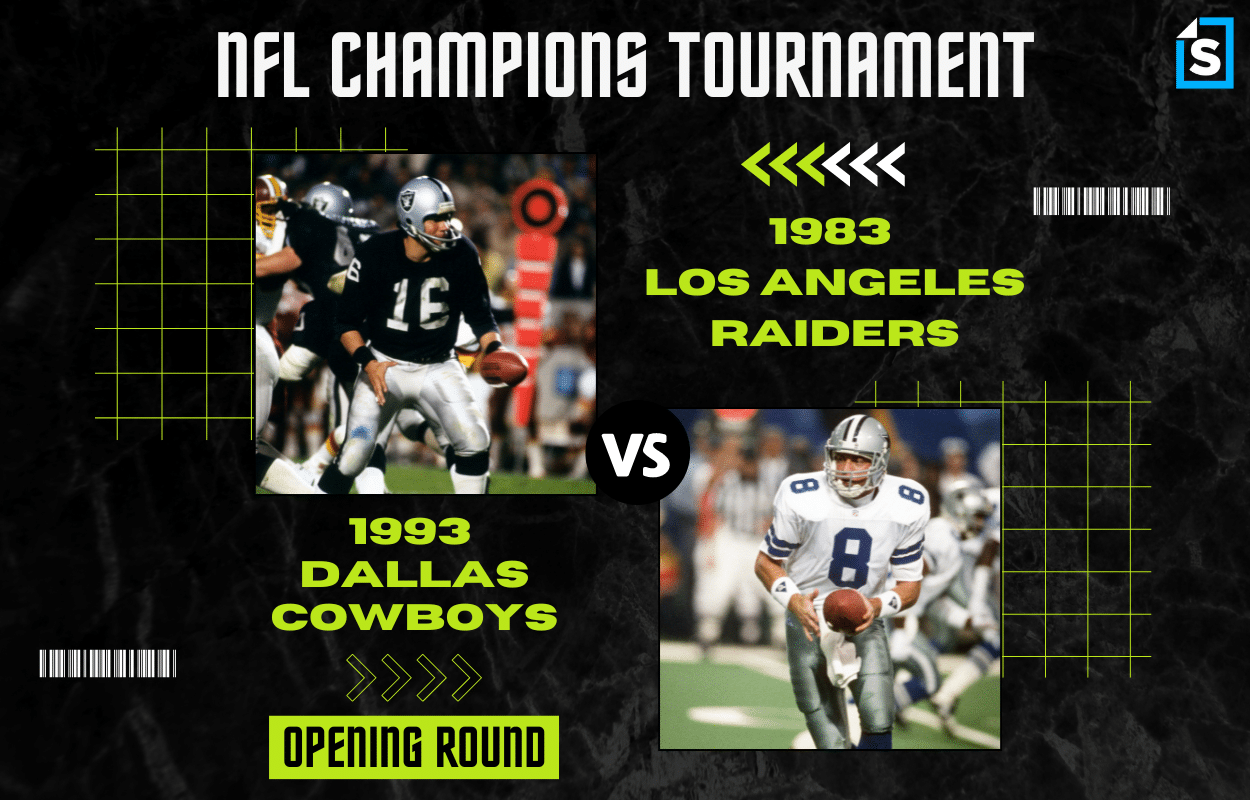
Just three years removed from their second Super Bowl win, the Raiders were in their second season in Los Angeles in 1983 and coming off an 8-1 year in the strike-shortened ’82 campaign that ended in a disappointing playoff loss to the New York Jets.
Ahead of the ’83 season, the Raiders attempted a three-team trade that would have gotten them John Elway in the NFL Draft to replace an aging Jim Plunkett, but the deal was blocked. Plunkett, the Super Bowl MVP three years earlier, actually began the season as a backup to Marc Wilson but got his job back when Wilson went down with an injury.
But while the 36-year-old didn’t have the most remarkable statistical season, completing 60.7% of his passes for 2,935 yards with 20 touchdowns and 18 interceptions, he went 10-3 in 13 games as a starter as the Raiders went 12-4 to earn the No. 1 seed in the AFC.
It certainly didn’t hurt that second-year running back Marcus Allen notched his first 1,000-yard season, rushing for 1,014 yards with nine scores while also catching a pair of touchdown passes and throwing three of his own.
The Raiders’ third-ranked offense carried them to a 38-10 win over the third-seeded Pittsburgh Steelers in the Divisional Round and then to another easy victory in the AFC Championship Game, a 30-14 romp of the Seattle Seahawks.
In Super Bowl 18, LA squared off with the defending Super Bowl champion Washington Commanders, who’d gone a league-best 14-2 in the regular season. Washington had scored 541 points, at the time an NFL record, and was the heavy favorite entering the title game.
But the Raiders’ defense, which ranked just 13th out of 28 teams, shut down the Washington offensive attack in Tampa Stadium that night, surrendering just nine points. The Raiders’ offense, on the other hand, performed just fine.
Plunkett completed 64% of his passes for 172 yards and a touchdown, while Allen earned MVP honors by rushing for 191 yards and two scores in the 38-9 win.
Coming off the franchise’s first Super Bowl win in 15 years and third overall, the Dallas Cowboys got off to an 0-2 start to kick off the 1993 season, mainly due to Emmitt Smith holding out for a new contract.
Upon Smith’s return in Week 3, the Cowboys reeled off seven straight victories. A second two-game losing streak followed, but after a Thanksgiving Day loss to the Miami Dolphins (the Leon Lett gaffe in the snow), Dallas won out to finish 12-4, one game worse than the previous year but still good enough for the No. 1 seed in the NFC.
Despite the two-game holdout, Smith rushed for 1,486 yards and nine touchdowns en route to winning NFL MVP. He was obviously a significant part of a Cowboys offense that averaged 23.5 points per game, good for second in the NFL.
Troy Aikman had another solid campaign, completing 69.1% of his passes for 3,100 yards and 15 touchdowns with only six interceptions. And Michael Irvin recorded his third consecutive 1,000-yard season, catching 88 passes for 1,330 yards and seven scores.
The Dallas defense also ranked second, allowing just 14.3 points per game.
America’s Team kicked off the postseason with a 27-17 win over the Green Bay Packers and then knocked out the San Francisco 49ers in the NFC Championship Game for the second straight year with a 38-21 victory to set up a Super Bowl rematch with the Buffalo Bills.
While Dallas had manhandled Buffalo the previous year, 52-17, Super Bowl 28 was a bit tougher, even if the 30-13 final score doesn’t indicate it. The Bills actually held a 13-6 lead at halftime, but the Cowboys owned the second half, scoring 24 unanswered points to claim a second straight championship.
Emmitt Smith added some more hardware to his trophy case, winning Super Bowl MVP honors with 132 rushing yards and a pair of touchdowns.
| Team | 1983 Raiders | 1993 Cowboys |
|---|---|---|
| Record | 12-4 | 12-4 |
| Super Bowl | Def. Washington Commanders 38-9 | Def. Buffalo Bills 30-13 |
| SB MVP | Marcus Allen | Emmitt Smith |
Had it not been for Smith’s holdout, the ’93 Cowboys likely earn a higher seed, as it’s almost a guarantee that they would’ve won at least one of those first two games. The Leon Lett mistake also cost them a win, but at least he made up for it by causing the big turnover in the Super Bowl that dramatically changed the course of the game.
So while Dallas is technically the lower seed here, I still see them as the better team overall. Both offenses were solid, but the Cowboys’ defense gives them the edge here. But that’s just me.
Winner: 1993 Dallas Cowboys
As I expected, this one wasn’t very close, with the ’93 Cowboys taking 80% of the vote. Jimmy Johnson’s juggernaut just had too much on both sides of the ball. But they won’t have quite as easy of a time in the next round as Dallas squares off with arguably the best team in the entire tournament, the second-seeded 1985 Chicago Bears.
(18) 1970 Baltimore Colts vs. (47) 1980 Oakland Raiders
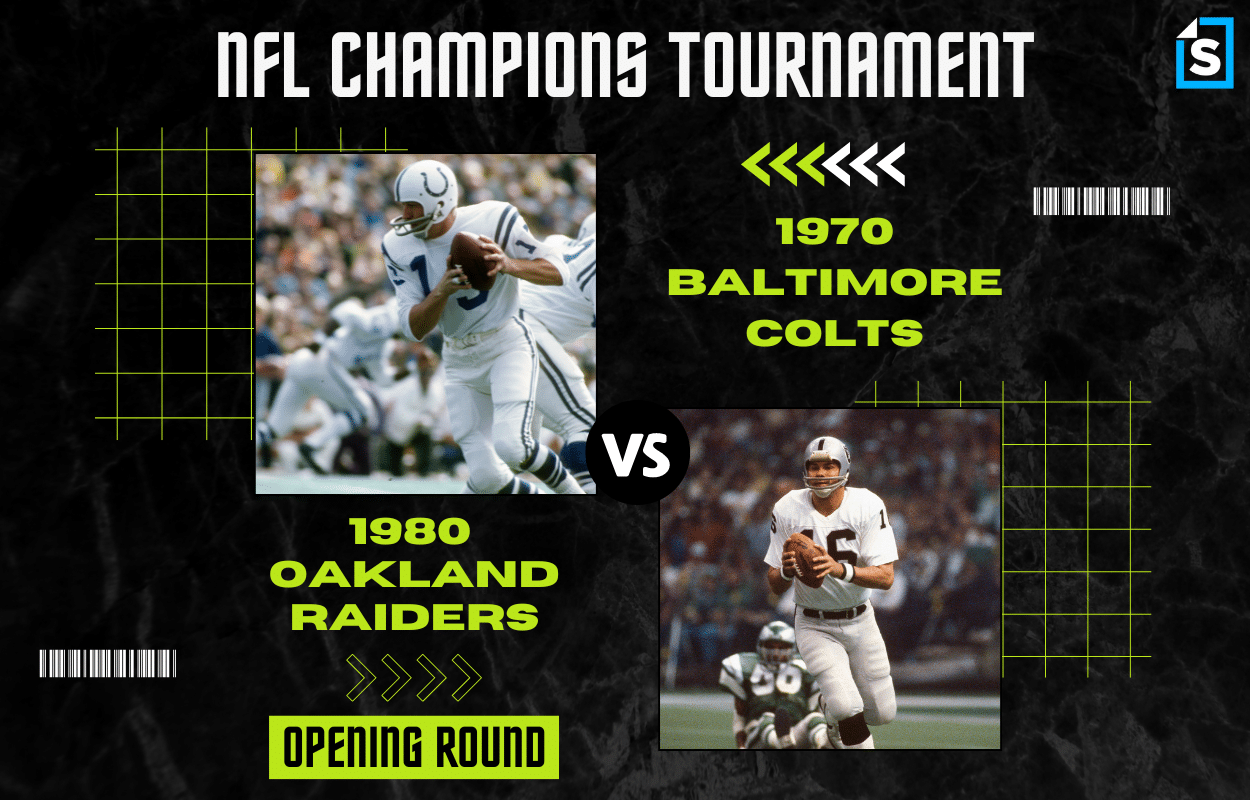
After being upset by Joe Namath and the New York Jets in Super Bowl 3 following the 1968 season, the Baltimore Colts went 8-5-1 in 1969 and missed the postseason altogether. The relationship between team owner Carroll Rosenbloom and head coach Don Shula had soured, and Shula took his talents to South Beach to become the head coach of the Miami Dolphins ahead of the 1970 season.
But offensive backfield coach Don McCafferty stepped in nicely and led the Colts to an 11-2-1 record in the regular season, which was the first following the completion of the NFL-AFL merger. And this was despite a not-so-great campaign from Johnny Unitas, who completed just 51.7% of his passes for 2,213 yards with 14 touchdowns and 18 interceptions.
Despite Unitas’ subpar season, the Colts’ offense ranked sixth in scoring, averaging 22.9 points per game, and the Baltimore defense, led by Pro Bowler and future Police Academy star Bubba Smith, allowed just 16.7 points per game, good for seventh in the league.
That defense was on display in the Colts’ playoff opener as Baltimore blanked the Central Division champion Bengals, 17-0. The Colts then took care of the Oakland Raiders in the AFC Championship Game, 27-17, to set up a Super Bowl 5 matchup with the Dallas Cowboys.
In the first Super Bowl played on artificial turf, the Colts and Cowboys played an ugly game of football that’s commonly referred to as the “Blunder Bowl.” The game featured a record 11 turnovers, and the Cowboys shot themselves in the foot with 10 turnovers for 133 yards.
Despite an injury to Unitas in the second quarter, Baltimore emerged victorious, 16-13, after Jim O’Brien kicked a 32-yard field goal with five seconds remaining. As no member of the Colts played well enough to earn MVP, the honor went to Cowboys linebacker Chuck Howley, who had two interceptions in the loss.
Prior to the 1980 season, Al Davis’ attempt to move the Raiders from Oakland to Los Angeles was blocked by his fellow NFL owners, leading to a lengthy lawsuit that took two years to resolve. So while Davis didn’t get his move, he did get his second Super Bowl in five seasons.
Coming off two 9-7 campaigns in which they missed the postseason, the Raiders didn’t get off to a great start in 1980, going 2-3 in their first five games. But they then embarked on a six-game winning streak to improve to 8-3 and won three of their final five to finish 11-5, good enough for the No. 4 seed in the AFC.
In the Wild Card Round, Oakland easily took care of the fifth-seeded Houston Oilers, 27-7, and then upset the second-seeded Cleveland Browns in the Divisional Round, 14-12. The Raiders squared off with the division-rival San Diego Chargers, with whom they’d split two matchups in the regular season, in the AFC title game and again pulled off an upset, knocking out the No. 1 seed, 34-27.
And in Super Bowl 15, Oakland again shocked the world, easily defeating the Philadelphia Eagles, 27-10, to become the first wild-card team to win a championship. Jim Plunkett, who didn’t have a strong regular season, played one of his best games of the year that night in New Orleans, throwing for 261 yards with three touchdowns and no interceptions to earn MVP honors.
| Team | 1970 Colts | 1980 Raiders |
|---|---|---|
| Record | 11-2-1 | 11-5 |
| Super Bowl | Def. Dallas Cowboys 16-13 | Def. Philadelphia Eagles 27-10 |
| SB MVP | Chuck Howley (Cowboys) | Jim Plunkett |
If I’m being honest, there was nothing truly exceptional about either one of these teams. As mentioned, Unitas had a horrible year overall, throwing more picks than TDs. Truth be told, I think he was good for this time, but his place in history is highly overrated.
And while Plunkett played well in the Super Bowl, he almost suffered the same fate as he had 18 touchdowns and 16 interceptions in the regular season. And here’s a fun fact about Plunkett. He’s the only eligible quarterback to win two Super Bowls as a starter not to be inducted into the Pro Football Hall of Fame.
Winner: 1970 Baltimore Colts
This was the closest matchup we’ve had thus far, and will at least tie for the tightest of the entire tournament, as it came down to one vote with the 1970 Baltimore Colts just squeezing by. Rough week for the Raiders, am I right?
(15) 1973 Miami Dolphins vs. (50) 2001 New England Patriots
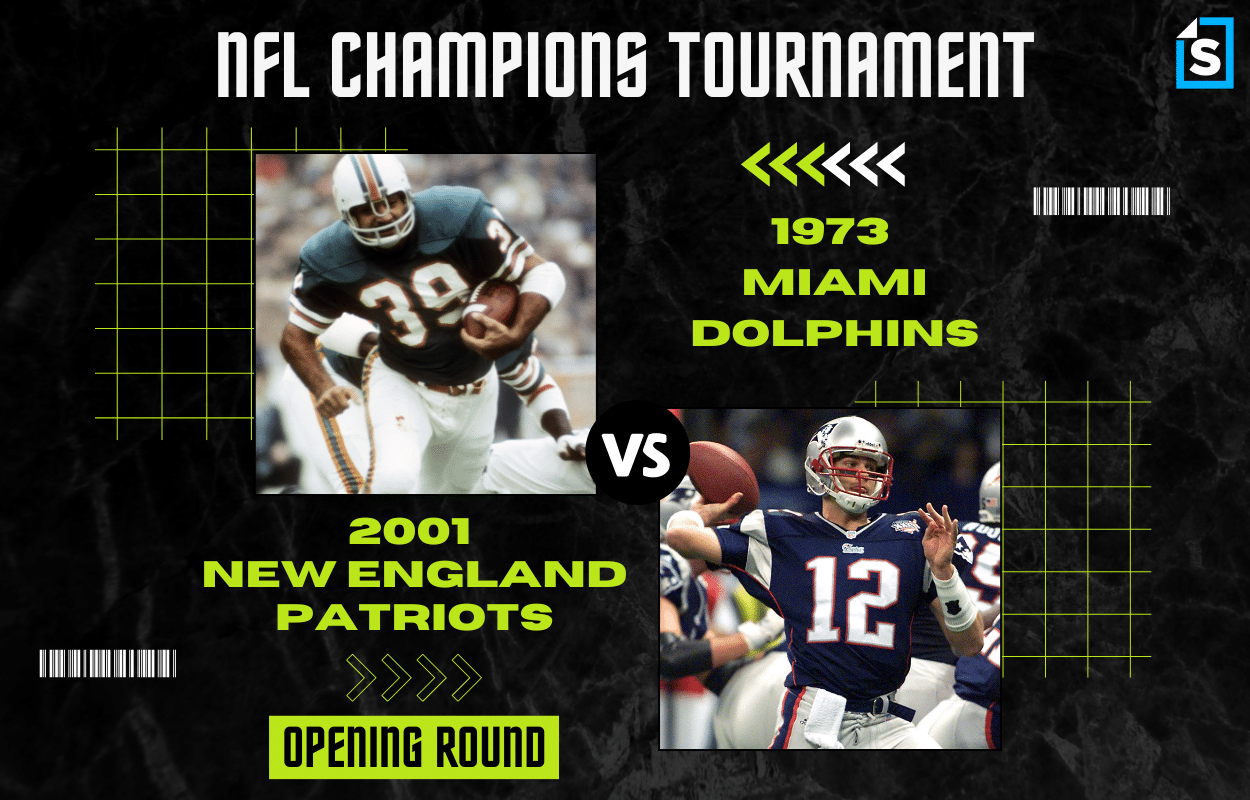
The 1973 Miami Dolphins are often an overlooked team in NFL history, given what the previous edition of their squad had done with the undefeated season and all. But make no mistake about it. While Don Shula’s ’73 unit didn’t go undefeated, they were still a pretty damn good team.
Led by quarterback Bob Griese and the dynamic backfield of running back Mercury Morris and fullback Larry Csonka, who combined for more than 2,000 yards from scrimmage, the Miami offense ranked fifth in the NFL, scoring 24.5 points per game.
But it was the Dolphins’ defense that was the real standout of the ’73 season. With four Pro Bowlers — defensive end Bill Stanfill, middle linebacker Nick Buoniconti, safety Jake Scott, and safety and Defensive Player of the Year Dick Anderson — the unit allowed just 10.7 points per game, easily the best in the league that year and still good for 12th in NFL history.
After seeing their historic winning streak come to an end in Week 2, the Dolphins won 11 of their final 12 regular-season games to finish 12-2, tied for the best record in the league. But they were clearly the cream of the NFL crop and were never tested in the postseason.
In the opening round, the Dolphins wiped the floor with the Central Division champion Bengals, 34-16. They then took care of the Western Division champion Raiders in the AFC title game, 27-10.
And in Super Bowl 8, their third straight title-game appearance, the Dolphins ran over the Minnesota Vikings, who also went 12-2 in the regular season, by a score of 24-7. And when I say ran over, I mean they really ran over the Vikings.
Griese attempted just seven passes in the game, completing six of them for 73 yards. Everything else was on the ground as Csonka, Morris, and Jim Kiick combined for 51 carries. Csonka led the charge with 33 carries for 145 yards and two scores en route to winning Super Bowl MVP.
The 2001 New England Patriots campaign was seemingly over when high-priced quarterback Drew Bledsoe, who signed a monster 10-year extension prior to the season, went down with an injury in Week 2, an injury that nearly killed him, by the way.
And it was that injury that allowed the legend of Tom Brady to begin. Just in his second year then, Brady started the final 14 games of the regular season, despite Bledsoe being cleared to return in Week 10. The Patriots went 11-3 in those games, giving them an 11-5 record, their first AFC East title in four years, and the No. 2 seed in the AFC.
New England’s postseason opener against the Oakland Raiders would go down as one of the most controversial games in NFL history. This, of course, was the infamous “Tuck Rule” game in the snow in the final game at the old Foxboro Stadium, where Brady was hit in the fourth quarter by former Michigan teammate Charles Woodson and seemingly fumbled.
But it was ruled that Brady was attempting to throw the ball when he was hit, which made the play an incomplete pass. The drive continued, and the Patriots eventually won in overtime.
In the AFC Championship Game, Bledsoe actually returned to play the hero in a 24-17 upset win over the top-seeded Steelers as Brady went down with an injury of his own. But TB12 returned in time for Super Bowl 36 against the heavily-favored St. Louis Rams.
But once again, Bill Belichick & Co. shocked the football universe by pulling off a three-point upset, 20-17, winning as time expired with a 48-yard field goal from Adam Vinatieri, who was clutch as can be throughout the entire postseason. Brady completed his Cinderella season by winning Super Bowl MVP, completing 16 of 27 passes for 145 yards and a touchdown.
| Team | 1973 Dolphins | 2001 Patriots |
|---|---|---|
| Record | 12-2 | 11-5 |
| Super Bowl | Def. Minnesota Vikings 24-7 | Def. St. Louis Rams 20-17 |
| SB MVP | Larry Csonka | Tom Brady |
This is a tale of two different types of teams. The ’73 Dolphins, coming off two straight Super Bowl appearances and an undefeated season, were the clear favorites when their season began. The ’01 Patriots, coming off a 5-11 campaign, weren’t expected to finish much better than that, even if Bledsoe had stayed healthy. But it’s crazy how one moment can change everything, isn’t it?
Winner: 1973 Miami Dolphins
It looks as if I’m not the only one who thought the ’73 Dolphins are an overlooked team. Or perhaps the Tom Brady haters are just voicing their collective opinion. Either way, Miami took 80% of the vote here and will next face the 1970 Colts in the Round of 32.
(10) 2016 New England Patriots vs. (55) 2007 New York Giants
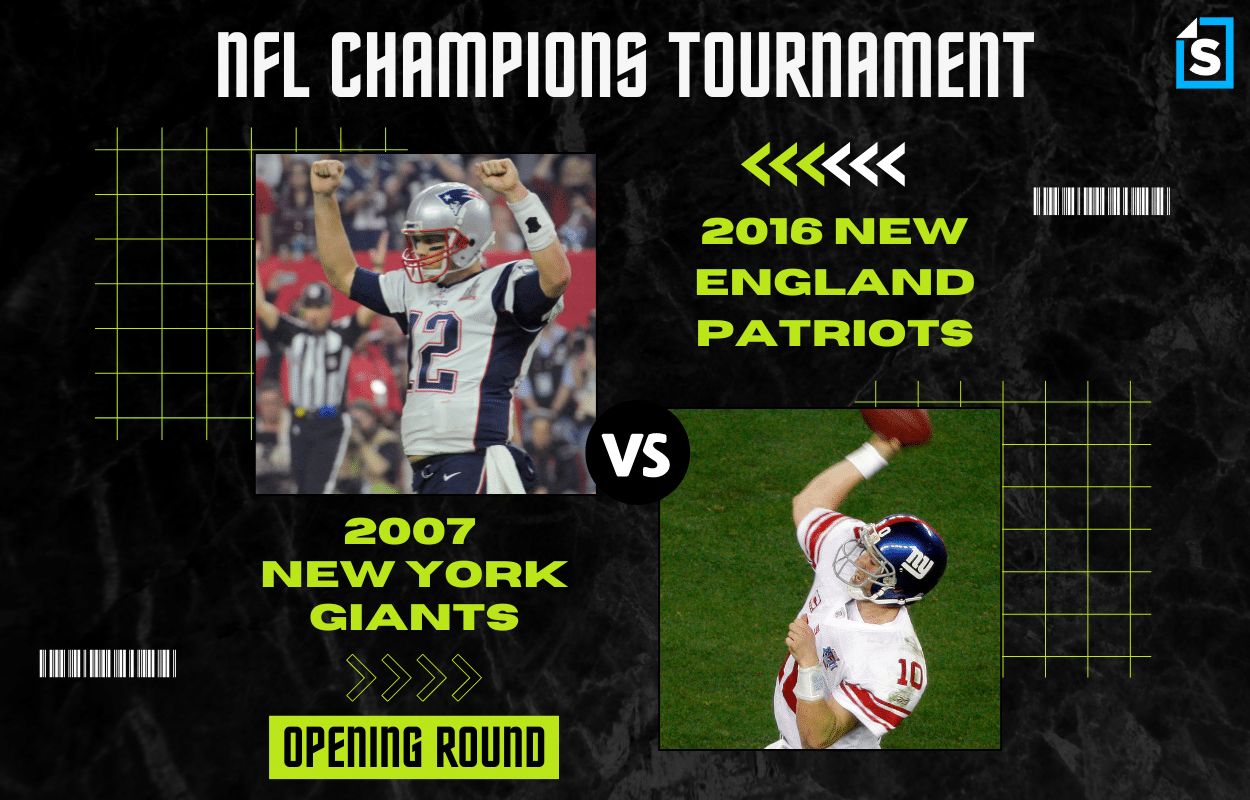
The New England Patriots certainly had an interesting start to their 2016 campaign and then gave the football universe one of the most unbelievable finishes in NFL history.
Coming off an AFC Championship loss the previous season to Peyton Manning’s Denver Broncos, Bill Belichick & Co. were without the services of Tom Brady for the first four games of the ’16 season as he was suspended for his role in the Deflategate scandal.
But behind the combo of Jimmy Garoppolo and Jacoby Brissett, the Pats weathered the storm and went 3-1 in TB12’s absence. And upon Brady’s return, New England went 11-1 the rest of the way to finish 14-2, easily taking the No. 1 seed in the AFC.
While the Patriots’ offense was fantastic, averaging 27.6 points per game, good for third in the league, the defense was even better. New England allowed just 15.6 points per game in 2016, the fewest in the NFL.
Brady’s bunch had no problems with the fourth-seeded Houston Texans in the Divisional Round, easily winning 34-16, and then trounced the third-seeded Steelers in the AFC title game, 36-17, setting up a Super Bowl battle with NFL MVP Matt Ryan and the Atlanta Falcons.
Following a scoreless first quarter, Atlanta came out firing in the second to take a 21-3 lead into halftime. And a six-yard TD pass from Ryan to Tevin Coleman with 8:31 remaining in the third made it 28-3. But we all know what happened next, don’t we?
With the odds stacked against them, the Patriots marched all the way back. The defense was finally able to get stops, and Brady finally got the offense rolling. With under a minute remaining in regulation, James White rushed for a one-yard touchdown, and Brady found Danny Amendola on the two-point conversion to tie the game at 28-28. And White again found the end zone in overtime, giving the Patriots an improbable 34-28 victory.
With 466 passing yards and two touchdown passes, Brady won his fifth championship and fourth Super Bowl MVP award.
On paper, the 2007 New York Giants weren’t anything special. The offense ranked 14th, averaging 23.3 points per game, and the defense ranked 17th, allowing 21.9.
After getting off to an 0-2 start, taking double-digit losses to the Cowboys and Packers, New York reeled off six straight wins to get to 6-2. But they then split their last eight games to finish 10-6, earning the No. 5 seed in the NFC.
In the Wild Card Round, Eli Manning & Co. upset the fourth-seeded Buccaneers in Tampa, 24-14. Heavy underdogs in the Divisional Round against the top-seeded Cowboys, the Giants went into Dallas and walked out with a 21-17 win.
Again underdogs in the NFC Championship Game, New York invaded Lambeau Field and upset Green Bay in overtime, 23-20, ending Brett Favre’s longtime tenure in a Packers uniform.
But under no circumstance could they pull off the biggest upset in NFL history in the Super Bowl, right? After all, the Giants were facing NFL MVP Tom Brady and the undefeated New England Patriots, who were looking to become the first undefeated champion since the 1972 Dolphins.
But against all odds, New York pulled off the impossible. Trailing 7-3 after three quarters, Manning hit David Tyree with a five-yard touchdown pass just under four minutes into the fourth to give the Giants a 10-7 lead. But that wasn’t Tyree’s biggest catch of the day.
After the Patriots responded to take a 14-10 lead with less than three minutes to play on a six-yard TD pass from Brady to Randy Moss, Manning led a drive that included a critical third-down conversion in which he somehow escaped the New England pass rush and threw a bomb down the field to Tyree, who made arguably the greatest catch in Super Bowl history, one now known as the “Helmet Catch.”
A few plays later, Eli hit Plaxico Burress with a 13-yard TD pass to give the Giants an improbable 17-14 win, ruining what would have gone down as the greatest season in NFL history.
| Team | 2016 Patriots | 2007 Giants |
|---|---|---|
| Record | 14-2 | 10-6 |
| Super Bowl | Def. Atlanta Falcons 34-28 | Def. New England Patriots 17-14 |
| SB MVP | Tom Brady | Eli Manning |
On two occasions, Manning and the Giants beat a Patriots team they had no business beating. And if this were a real game, I wouldn’t give New York a snowball’s chance in hell. Brady’s 2016 team was easily one of his best, and he was playing with a chip on his shoulder that entire year following the suspension. It’s why he refused to let New England lose that Super Bowl, even when the Pats got down 25.
But on both occasions, Manning and the Giants came out on top.
Winner: 2016 New England Patriots
At long last, Brady takes down Manning as the 2016 Patriots earned 75% of the vote, which knocks Eli out of the tournament altogether. If you recall, his 2011 squad was beaten by the ninth-seeded ’91 Washington squad.
And this is the right call, folks. While I’m all for giving credit where credit is due, neither of Manning’s Giants teams can be considered all-time great units. But they got hot at the right time, and that’s all you’ve gotta do sometimes to win a Super Bowl. But the Giants as a whole still have a chance to win this tourney, just not this team.
As for Brady’s ’16 Pats, they’ll next square off with another legendary quarterback.
(23) 2009 New Orleans Saints vs. (42) 1997 Denver Broncos
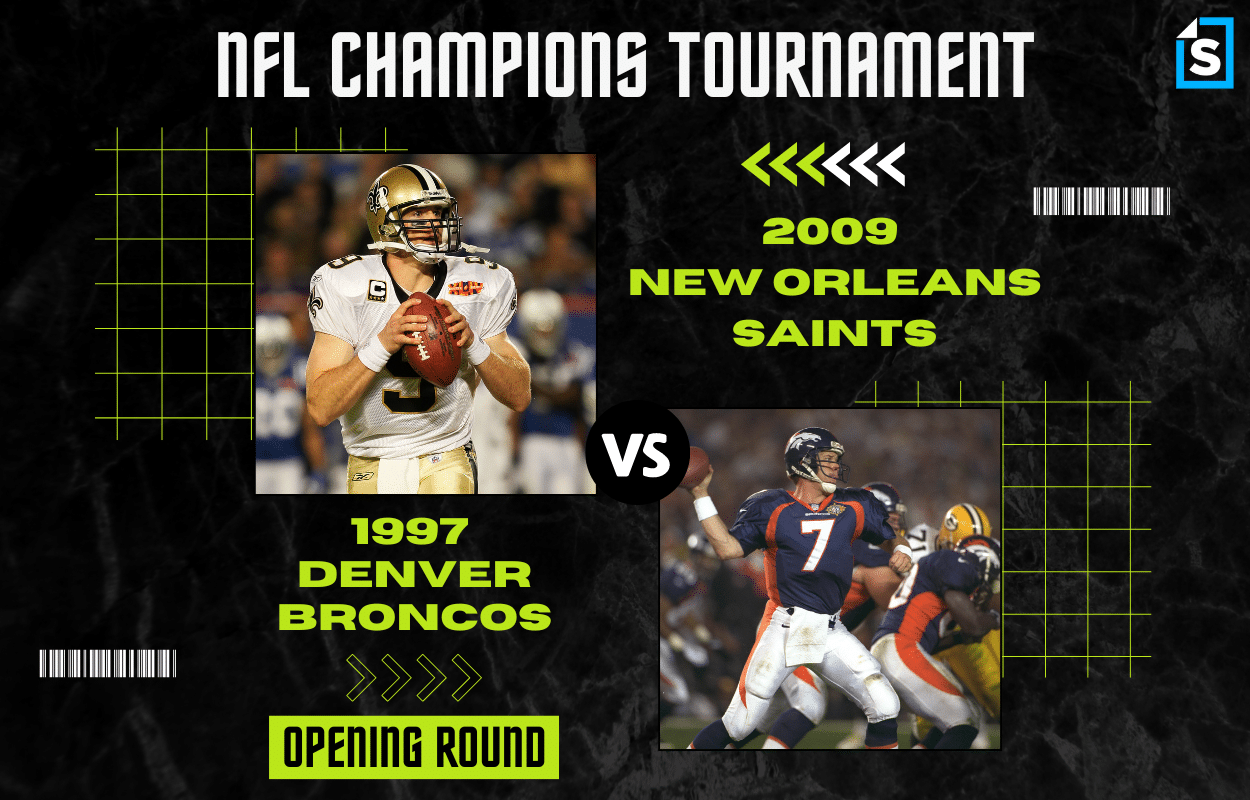
In the two seasons following their NFC Championship Game loss to the Chicago Bears following the 2006 campaign, the New Orleans Saints completely missed out on the postseason, going 7-9 in 2007 and 8-8 in 2008.
And that was despite Drew Brees, the ’08 Offensive Player of the Year, becoming one of the best quarterbacks in the NFL.
But in 2009, New Orleans made some adjustments and got back to playing championship-level football. While the defense was only ranked 20th, allowing 21.3 points per game, the offense was the best in the league, averaging 31.9.
Brees had another fantastic year, completing a league-high 70.6% of his passes for 4,388 yards and an NFL-best 34 touchdowns against 11 interceptions. He finished second in the NFL MVP vote, losing out to Peyton Manning.
While the Saints got off to an incredible 13-0 start, they dropped their last three. But despite the slide at year’s end, they still earned the top seed in the NFC.
In the Divisional Round, New Orleans walloped the fourth-seeded Cardinals, 45-14. But they got a much tougher test in the NFC Championship Game, barely getting past the second-seeded Vikings in overtime, 31-28, setting up a Super Bowl battle with Manning and the Colts.
Like the Saints, Indianapolis went on a lengthy undefeated streak to start the year, winning its first 14 games before dropping the final two. The Colts won by double-digits in each of their first two playoff games and were considered the favorite heading into Super Bowl 44.
But while Manning may have beaten out Brees for NFL MVP, Brees got the hardware that mattered more, leading his Saints to a 31-17 victory, throwing for 288 yards with two touchdowns en route to winning Super Bowl MVP honors.
Coming off a solid 13-3 season in 1996 that ended in a disappointing Divisional Round playoff loss to the Jacksonville Jaguars, the Denver Broncos got off to a hot start in 1997, winning their six games and nine of their first 10. They stumbled a touch down the stretch, splitting their final six to finish 12-4, good for second in the division and fourth overall in the AFC.
At 37 years of age, John Elway completed just 55.8% of his passes during the regular season, his lowest percentage in five years, but still threw for 3,635 yards and 27 touchdowns in leading a Broncos offense that led the league in points, averaging 29.5 per game. The real star of that offense was running back Terrell Davis, who rushed for 1,750 yards and a league-best 15 touchdowns.
While not the best in the league, the Denver defense was certainly no slouch, ranking sixth in points allowed, giving up just 17.9 per game.
The Broncos got their revenge on Jacksonville in the Wild Card Round in a big way, easily knocking the Jags out of the postseason, 42-17. They didn’t have quite as easy of a time in the Divisional Round, edging the rival Chiefs, 14-10, and narrowly escaping with a victory over the Pittsburgh Steelers in the AFC Championship Game, 24-21.
In Super Bowl 32, Denver’s first title-game appearance in eight years, the Broncos squared off with the defending champion Green Bay Packers. But back-to-back Super Bowl wins weren’t in the cards for Brett Favre & Co. as Elway finally won the big one in his fourth attempt, although he didn’t have a great game, completing just 12 of 22 passes for 123 yards with no touchdowns and an interception.
But Terrell Davis saved the day in the 31-24 victory, rushing for 157 yards and three touchdowns to win Super Bowl MVP.
| Team | 2009 Saints | 1997 Broncos |
|---|---|---|
| Record | 13-3 | 12-4 |
| Super Bowl | Def. Indianapolis Colts 31-17 | Def. Green Bay Packers 31-24 |
| SB MVP | Drew Brees | Terrell Davis |
This is an interesting matchup. As mentioned, both offenses were ranked No. 1 in their respective seasons, while the defenses were merely average. Brees certainly had a better season in his Super Bowl-winning year than did Elway, but Denver has the edge in the rushing game with Davis.
I really like the Mike Shanahan-Sean Payton coaching matchup here as well.
Winner: 1997 Denver Broncos
The New Orleans Saints’ only team in this tournament is out, as the ’97 Broncos took out Brees and his ’09 squad by earning three-quarters of the vote. I expected it to be a little closer, but things are what they are at this point. Outside of a few games, it’s hard to call anything an upset here, as every team was obviously good enough to win a Super Bowl.
So we now get John Elway vs. Tom Brady in the Round of 32. Yes, please.
(26) 1981 San Francisco 49ers vs. (39) 2008 Pittsburgh Steelers
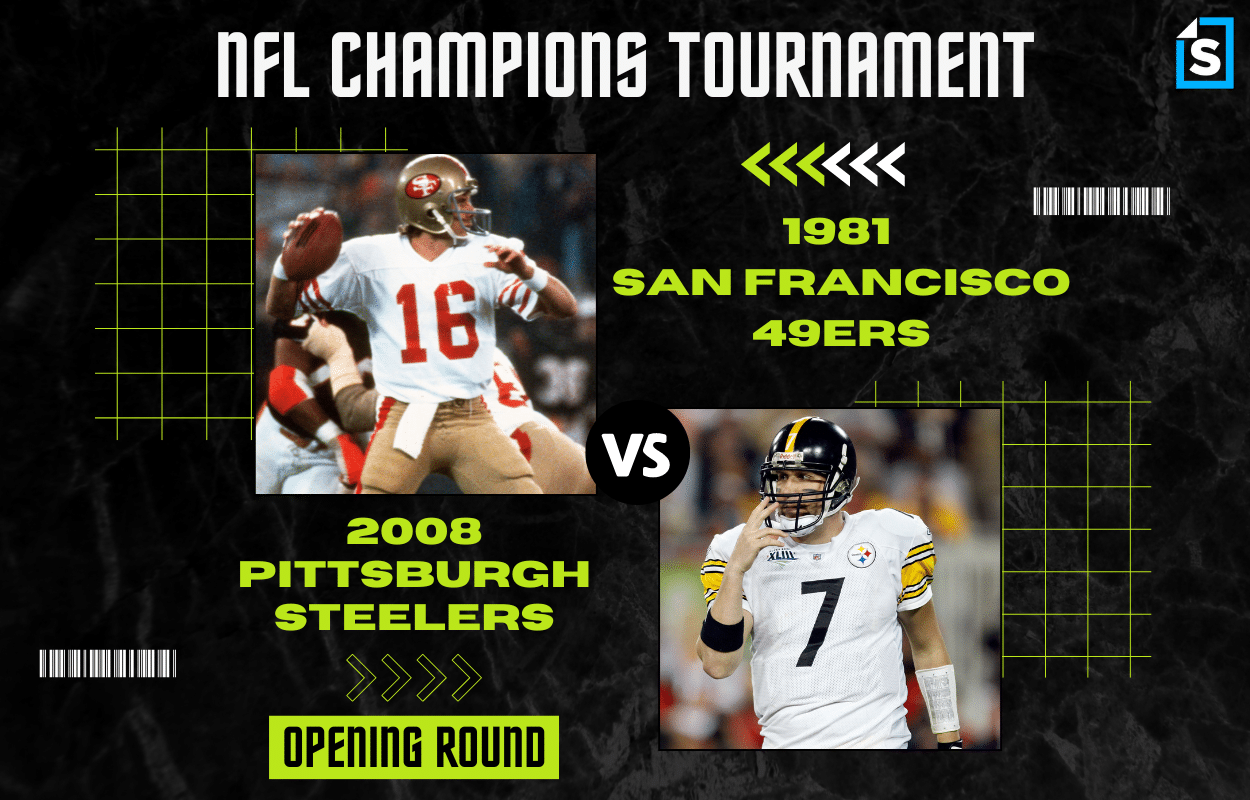
Coming into the 1981 season, the San Francisco 49ers hadn’t been to the NFL Playoffs in nearly a decade, their last appearance coming after the 1972 campaign, and were only two years removed from going 2-14 in Bill Walsh’s first year as the head coach.
Midway through the 1980 season, Walsh replaced starting quarterback Steve DeBerg with Joe Montana, who remained QB1 as the ’81 season got underway. And that obviously worked out for San Francisco.
In his first full season as a starter, Montana finished second in the NFL MVP vote, losing out to the Bengals’ Ken Anderson, completing a league-high 63.7% of his passes for 3,565 yards and 19 touchdowns with a dozen interceptions. Remember, he didn’t have Jerry Rice yet.
The Niners’ offense wasn’t the most potent in the league, ranking seventh by averaging 22.3 points per game, but the defense, led by Ronnie Lott and Dwight Hicks, ranked second in points allowed, giving up just 15.6.
With a 13-3 record, the 49ers won the NFC West for the first time since the aforementioned 1972 season and earned the top seed on the NFC side of the postseason bracket, winning Walsh Coach of the Year honors.
In the Divisional Round, San Francisco breezed by the New York Giants, 38-24, setting up a date with the Dallas Cowboys in the conference title game. And behind the magical accident of “The Catch” from Dwight Clark late in the game, the Niners escaped with a 28-27 win to reach their first-ever Super Bowl.
Facing MVP Anderson and the Bengals, the 49ers came out of the gates quickly, taking a 20-0 lead into halftime. Cincy fought back to make the game competitive, but San Francisco hung on to win its first championship with a 26-21 victory. Montana was named Super Bowl MVP, completing 63.6% of his passes for 157 yards and a touchdown.
Three years removed from Super Bowl number five, the Pittsburgh Steelers — or anyone in the AFC, for that matter — weren’t really expected to contend for a title in 2008. The New England Patriots had gone undefeated a season earlier before getting upset in the Super Bowl and most assumed they’d come out and dominate once again.
But when Tom Brady went down with a season-ending knee injury in Week 1 of the ’08 campaign, the entire landscape of the NFL changed. And the Steelers took advantage.
In just his second season replacing the retired Bill Cowher, Mike Tomlin earned Coach of the Year honors by leading the Steelers to a 12-4 record and the No. 2 seed in the AFC. Ben Roethlisberger didn’t have his greatest year, completing just 59.9% of his passes for 3,301 yards with 17 touchdowns and 15 interceptions, which is why the Pittsburgh offense only ranked 20th in the NFL.
The defense, on the other hand, was outstanding. Led by Defensive Player of the Year James Harrison, who recorded 101 tackles, 16 sacks, one interception, and forced a league-best seven fumbles, the Steelers allowed just 13.9 points per game to lead the NFL.
Pittsburgh disposed of the fourth-seeded Chargers in the Divisional Round, 35-24, then knocked out the sixth-seeded rival Ravens in the AFC title game, 23-14.
In Super Bowl 43, the Steelers faced the surprising Arizona Cardinals, the No. 4 seed from the NFC who’d also knocked out a No. 6 seed, the Philadelphia Eagles, to earn their way into the championship game.
While the Cardinals may have been the sentimental favorite with Kurt Warner’s return to The Big Game, the Steelers ruined the fun and became the first team to reach six Super Bowl wins, earning a hard-fought 27-23 victory in a highly entertaining affair.
Harrison made Super Bowl history with a 100-yard interception return for a touchdown, and Santonio Holmes took MVP honors with the game-winning catch with 35 seconds remaining.
| Team | 1981 49ers | 2008 Steelers |
|---|---|---|
| Record | 13-3 | 12-4 |
| Super Bowl | Def. Cincinnati Bengals 26-21 | Def. Arizona Cardinals 27-23 |
| SB MVP | Joe Montana | Santonio Holmes |
On one hand, I dig this matchup because it features two of the greatest Super Bowl-winning franchises in the 49ers and the Steelers. And it’s kinda fun that it matches up the Niners’ first title team with the Steelers’ last.
But let’s get real here. Neither one of these teams is the best title team on either side. Are both teams solid? Well, of course. They wouldn’t be here if they weren’t. Overall, I think San Francisco has the edge, as Walsh & Co. had more on both sides of the ball. But Tomlin’s defense with Harrison leading the way was damn good and could certainly give Montana and his offense plenty of fits.
So who do you have in this battle of legendary franchises?
Winner: 1981 San Francisco 49ers
I figured the ’81 Niners would win this matchup handily. But given how many Steelers fans are out there, I thought Big Ben’s ’08 unit would at least get a few votes here and there. But I was wrong, as San Francisco took 100% of the vote here.
This is just the second shutout we’ve seen, and the 49ers have both, the first coming from the ’94 squad. Up next for Montana’s 1981 Niners is a date with Lawrence Taylor and the 1986 New York Giants. Those two know each other a little bit, don’t they?
(30) 1968 New York Jets vs. (35) 2015 Denver Broncos
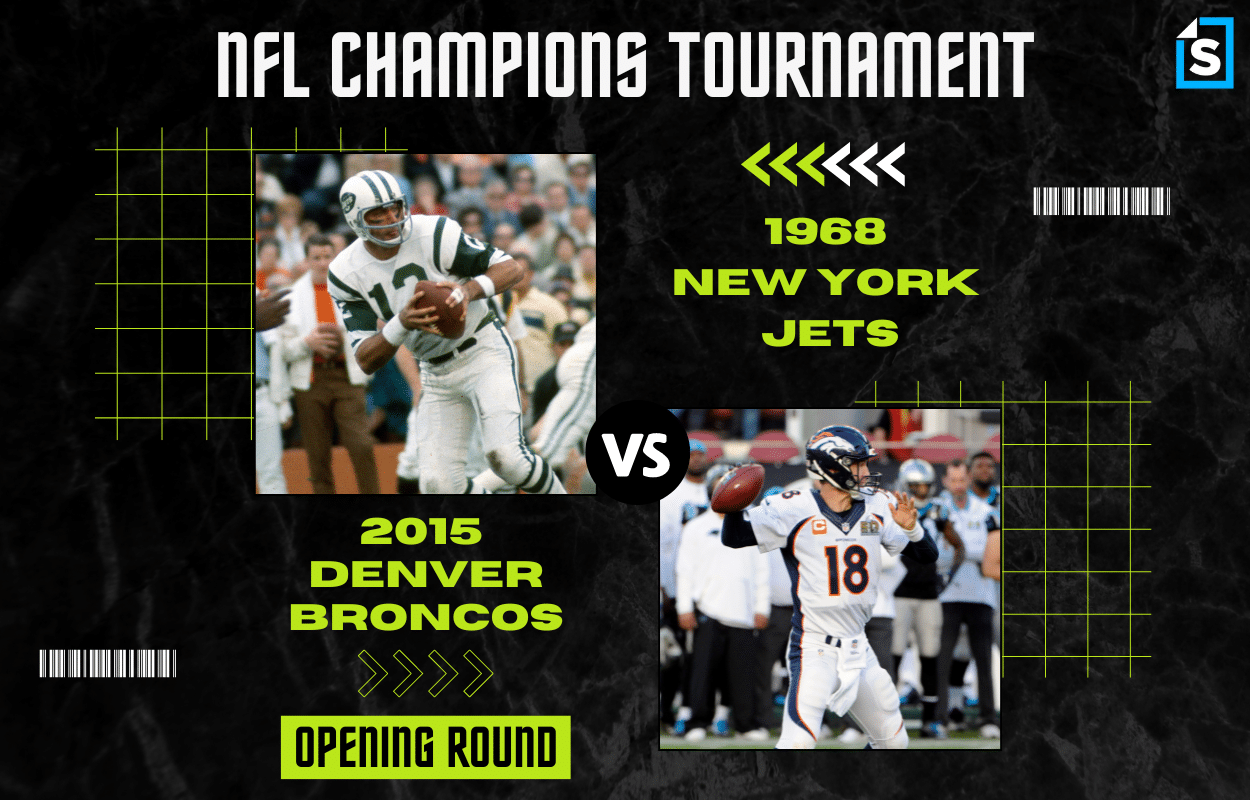
One of two AFL teams to win the Super Bowl before the 1970 merger, the 1968 Jets were the first. And with all due respect to the ’69 Chiefs, New York is a bit more remembered.
When the ’68 AFL season began, the Jets were coming off an 8-5-1 campaign and had never made the postseason in their first eight years of existence. But that was all about to come to an end.
Fourth-year quarterback Joe Namath was coming off a Pro Bowl season in which he threw for more than 4,000 yards. And while he didn’t have quite as good of a season in ’68, he still threw for 3,147 yards and 15 touchdowns, although he only completed 49.2% of his passes and tossed 17 interceptions.
Nevertheless, the New York offense ranked second in the AFL, averaging 29.9 points per game. And the defense held its own as well, ranking fourth in points allowed at 20 per game. All that added up to an 11-3 record and an Eastern Division title, the team’s first division crown. The 11-3 mark is also still the highest winning percentage in franchise history.
In the Western Division, the Oakland Raiders and Kansas City Chiefs were both 12-2, forcing a playoff. Meanwhile, the Jets got the week off. The Raiders won the game but, despite having a better record, still had to travel to New York for the AFL Championship Game, which the Jets won, 27-23, for the right to play in Super Bowl 3.
Namath and the Jets were famously big underdogs to the NFL champion Baltimore Colts. But “Broadway Joe” guaranteed victory and then went out and backed it up. New York pulled off a big upset, 16-7, and proved the AFL could truly compete with the NFL.
While the 2015 Denver Broncos’ season will best be remembered as Peyton Manning’s swan song, let’s not pretend the five-time NFL MVP had a great year.
For one, he only appeared in 10 games in the regular season as he battled a foot injury, making the 2015 campaign the only one in which he ever missed a game. But even when he did play, it wasn’t great as Manning completed just 59.8% of his passes, the worst percentage since his rookie year, and threw for a career-low 2,249 yards with nine touchdowns against 17 interceptions.
And that’s why the Broncos’ offense only ranked 19th in the NFL that year. The defense, however, was another story, as Von Miller’s group ranked fourth and allowed just 18.5 points per game.
Despite Manning’s struggles, the Broncos still went 12-4 and won a fifth consecutive AFC West title, also earning the top seed in the AFC.
In the Divisional Round, Denver knocked off the sixth-seeded Steelers, 23-16, setting up one final Peyton Manning vs. Tom Brady showdown in the AFC title game. Manning threw his only two touchdowns of the postseason in that final matchup with his longtime rival, winning a nailbiter, 20-18.
The Broncos didn’t have quite as tough a time in Super Bowl 50, easily defeating the Carolina Panthers, 24-10. Miller was named the game’s MVP with six tackles, 2.5 sacks, and two forced fumbles.
| Team | 1968 Jets | 2015 Broncos |
|---|---|---|
| Record | 11-3 (AFL) | 12-4 |
| Super Bowl | Def. Baltimore Colts 16-7 | Def. Carolina Panthers 24-10 |
| SB MVP | Joe Namath | Von Miller |
Despite technically being the higher seed, the ’68 Jets would likely come into this matchup with the ’15 Broncos as an underdog, even with Manning having the rough season he did. But we all know what happened when those Jets were an underdog. So what do you think? Could Joe Namath handle being chased around all day by Von Miller?
Winner: 2015 Denver Broncos
Well, maybe Namath needed to be an underdog as he and the higher-seeded Jets are out of this tournament, as the 2015 Broncos took 60% of the vote here. Up next for Manning & Co. is a date with another high-profile quarterback in Joe Montana and the third-seeded 1984 San Francisco 49ers.
(19) 2013 Seattle Seahawks vs. (46) 2020 Tampa Bay Buccaneers
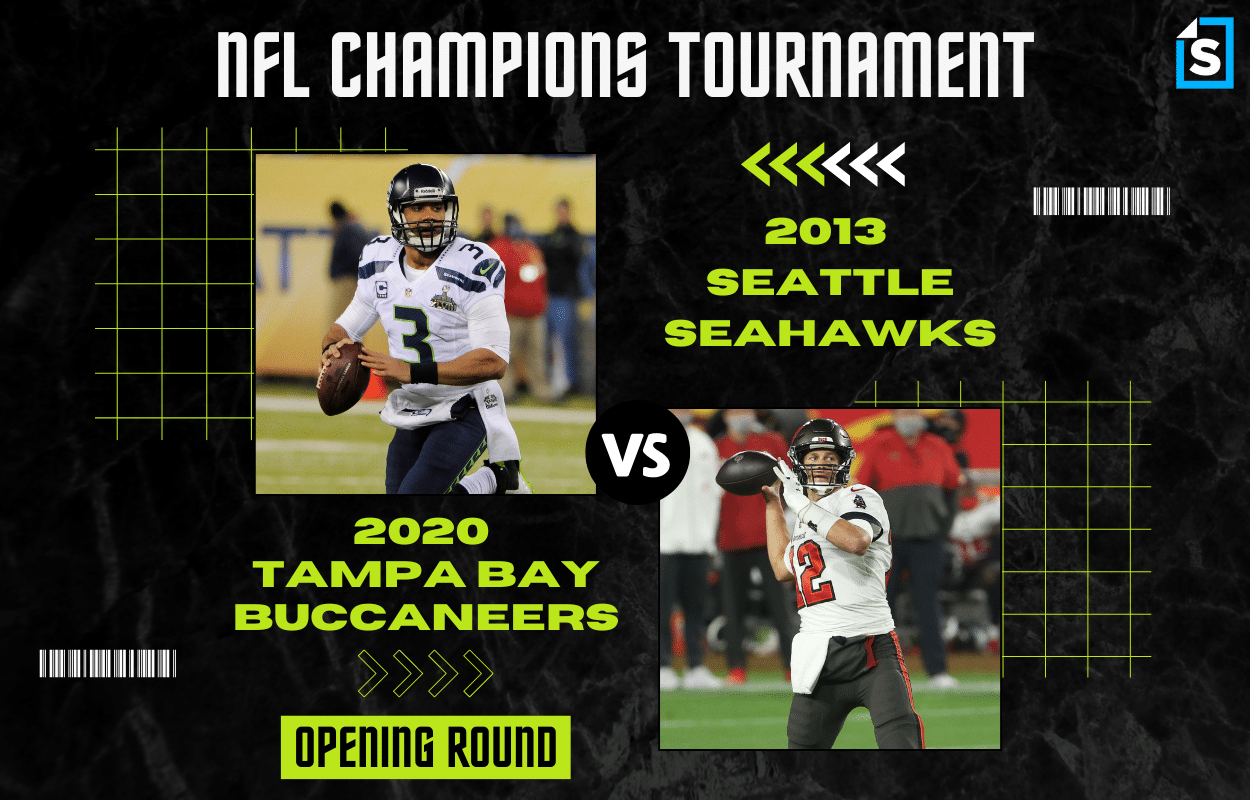
Coming off an 11-5 season, the Seattle Seahawks went 13-3 in 2013, giving the franchise a double-digit win total for the first time ever.
Russell Wilson was in only his second year in the NFL at this point but had a solid sophomore campaign, completing 63.1% of his passes for 3,357 yards with 26 touchdowns against just nine interceptions to finish fourth in Offensive Player of the Year voting.
Marshawn Lynch also had an excellent year, rushing for 1,257 yards and a league-high 12 touchdowns to earn his third consecutive trip to the Pro Bowl. The Seahawks’ offense ranked a respectable eighth in scoring, averaging 26.1 points per game.
But the standout unit for the Seahawks that season was the top-ranked defense, which allowed the fewest points, the fewest yards, and had the most takeaways. It was the first defense to lead the NFL in all three categories since the 1985 Chicago Bears.
The No. 1 seed in the NFC, the Seahawks ousted the sixth-seeded Saints in the Divisional Round, 23-15, and then knocked out the fifth-seeded San Francisco 49ers in the NFC title game, 23-17, setting up a matchup with the Denver Broncos.
Peyton Manning & Co. had scored 606 points in the regular season, the most in NFL history, but the Seattle defense shut that unit down in Super Bowl 48, intercepting Manning twice in a dominant 43-8 victory.
After two decades and six Super Bowl wins with the New England Patriots, Tom Brady took his talents to Tampa Bay ahead of the 2020 season. And while he obviously made that team better, there was no way he could lead the Buccaneers to a title in his first season, right?
After winning the Super Bowl following the 2002 season, the Bucs had made the postseason just twice since, the last instance coming after the 2007 campaign. But Brady came in and changed the culture with an incredible season, completing 65.7% of his passes for 4,633 yards, his highest total since 2012, and 40 touchdowns, his highest total since throwing 50 in 2007.
Tampa Bay averaged 30.8 points per game, good for third in the NFL, while the defense allowed 22.2, good for eighth in the league.
The Bucs went 11-5, finishing second in the NFC South behind the 12-4 New Orleans Saints, and earned the No. 5 seed in the NFC.
In their first playoff game in 13 years, the Buccaneers defeated Washington, 31-23, setting up a Divisional Round matchup with the Saints. And after losing twice to Drew Brees in the regular season, Brady got the better of his new rival as Tampa Bay earned a 10-point win, 30-20.
In the NFC title game, Brady & Co. upset Aaron Rodgers and the top-seeded Green Bay Packers at Lambeau Field, 31-26, earning themselves a home game at Raymond James Stadium in Super Bowl 55. And the Bucs then became the first team to ever win a Super Bowl in their home stadium by thrashing Patrick Mahomes and the heavily-favored Kansas City Chiefs, 31-9.
Completing 21 of 29 passes for 201 yards with three touchdowns and no picks, Brady won his fifth Super Bowl MVP trophy.
| Team | 2013 Seahawks | 2020 Buccaneers |
|---|---|---|
| Record | 13-3 | 11-5 |
| Super Bowl | Def. Denver Broncos 43-8 | Def. Kansas City Chiefs 31-9 |
| SB MVP | Malcolm Smith | Tom Brady |
What’s fun about this fictional game is that its two most popular players are still active. It’s not as if we’ll see Russell Wilson vs. Tom Brady in the Super Bowl this year, but it’s a fun matchup here. And TB12 beat the 2014 Seahawks in the Super Bowl, but that matchup was certainly a bit different.
Winner: 2020 Tampa Bay Buccaneers
Perhaps people are put off by 2022 Russell Wilson because only one-third of people voted for 2013 Russell Wilson here, putting Tom Brady in the Round of 32 yet again. But despite the big difference in seeding, can we really consider the 2020 Bucs receiving two-thirds of the vote a major upset, given the talent on that team?
As I’ve said several times already, that’s the beauty of this tournament. Up next for the five-time Super Bowl MVP is the very first Super Bowl MVP.
(14) 1966 Green Bay Packers vs. (51) 1967 Green Bay Packers
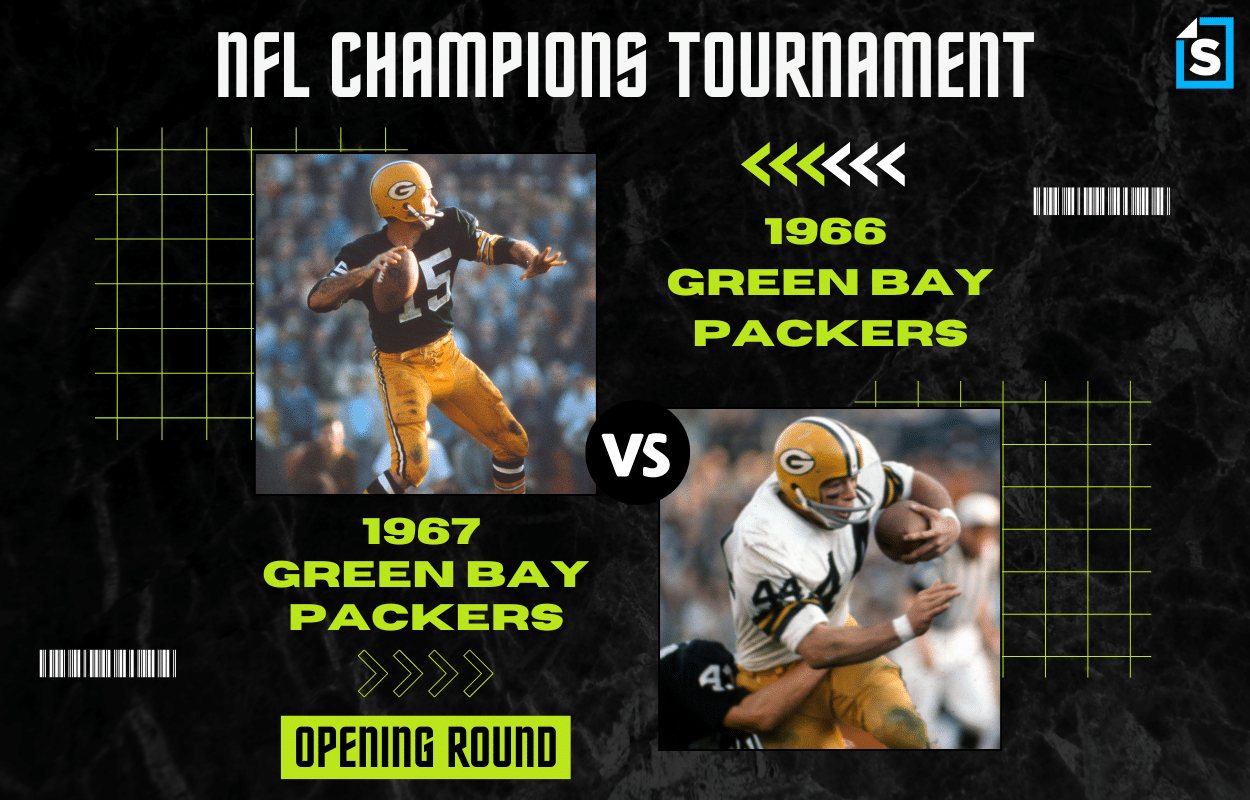
You just have to love formulaic seeding, as this 14 vs. 51 matchup pits the first two Super Bowl champions against one another. It just so happens that the winning team and Super Bowl MVP are the exact same.
Coming into the 1966 season, the Green Bay Packers had won three of the previous five NFL Championships, including the 1965 title. And they didn’t have much trouble winning in ’66, either.
The offense, of course, was led by future Hall of Fame quarterback Bart Starr, who completed a league-high 62.2% of his passes for 2,257 yards with 14 touchdowns against just three interceptions en route to winning his first and only NFL MVP award. Averaging 23.9 points per game, the Green Bay offense ranked fourth in the league in scoring.
Not to be outdone, the Packers’ defense, which featured five First-Team All-Pro selections, ranked first in the NFL, allowing only 11.6 points per game.
Green Bay went 12-2 in the regular season to win the Western Conference, losing their two games by four points combined, setting up a matchup with the 10-3-1 Cowboys in the NFL Championship Game, which was played in Dallas at the Cotton Bowl.
Behind a stellar performance from Starr, who passed for 304 yards and four touchdowns, Green Bay earned a hard-fought 34-27 victory to earn the right to play in the first Super Bowl, which was then known as the AFL-NFL World Championship Game.
Starr put on another show against the AFL champion Kansas City Chiefs in the unprecedented title game, winning MVP honors by throwing for 250 yards and two scores in an easy 35-10 win.
The Packers didn’t have quite as easy of a time in 1967.
The defense wasn’t quite as dominant, although the unit still ranked third in the NFL, allowing 14.9 points per game.
Of much more significant concern was the Green Bay offense, particularly the performance of Starr, who had one of the worst seasons of his storied career. The reigning MVP completed just 54.8% of his passes for 1,823 yards with nine touchdowns, his fewest in seven years, and a career-high 17 interceptions. The offense ranked ninth of 16, averaging 23.7 points per game.
The Packers’ record dropped to 9-4-1, and had it been the year before, they would have missed the postseason. But with the league expanding to 16 teams with the addition of the New Orleans Saints, the league broke up each conference into two divisions, and Green Bay won the West’s Central Division.
Both the Rams and Colts went 11-1-2 in the West, but since they were both in the same Coastal Division, only one was allowed into the playoffs, that being the Rams, as they held the tiebreaker.
The Packers beat those Rams in the conference title game, 28-7, to set up an NFL Championship Game rematch with the Dallas Cowboys. Only this time, the game was played at Lambeau Field, and it remains one of the most famous games in NFL history.
The temperature at game time was a ridiculous 13-below, with wind chills reaching 48-below, which is why the game came to be known as the “Ice Bowl,” which Green Bay won, 21-17, giving Vince Lombardi his third straight NFL title and fifth in seven years.
The Packers got some warmer temps at the Orange Bowl in Miami for Super Bowl 2 and had a much easier time with their opponent as well, easily defeating the AFL champion Oakland Raiders, 33-14. Bart Starr won his second straight Super Bowl MVP, completing 13 of 24 passes for 202 yards with a touchdown and no interceptions.
| Team | 1966 Packers | 1967 Packers |
|---|---|---|
| Record | 12-2 | 9-4-1 |
| Super Bowl | Def. Kansas City Chiefs 35-10 | Def. Oakland Raiders 33-14 |
| SB MVP | Bart Starr | Bart Starr |
Honestly, this is the most difficult matchup to attempt to dissect. So I’m not even going to try.
Winner: 1966 Green Bay Packers
This was a bit closer than I expected, but the 1966 Packers are moving on after getting 62.5% of the vote. So we now get Starr vs. Brady in the Round of 32. Keep scrolling, and you’ll see TB12 taking on another Green Bay legend in one of the final opening-round matchups.
(11) 1978 Pittsburgh Steelers vs. (54) 2012 Baltimore Ravens
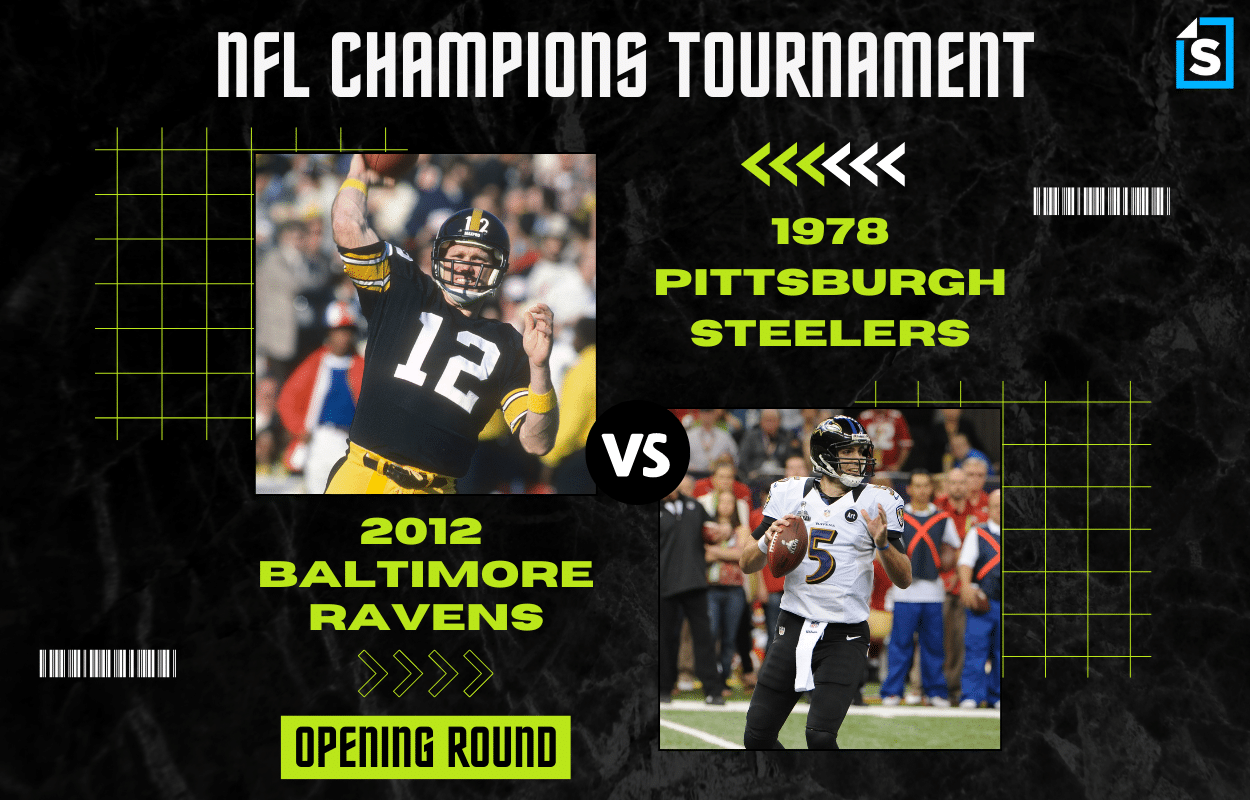
After winning back-to-back Super Bowls following the 1974 and 1975 seasons, the Pittsburgh Steelers suffered double-digit losses in the postseason the next two years. They had a chance to play a third straight Super Bowl following the ’77 season but fell short in the AFC title game, losing 24-7 to the Oakland Raiders. And they were ousted a round earlier the following year, losing to the Denver Broncos in the Divisional Round, 34-21.
Still stacked with talent on both sides of the ball, the Steelers had a bit of a chip on their shoulder during the 1978 season, which was the first to feature a 16-game schedule. Pittsburgh came out firing, winning its first seven games before dropping a Monday nighter to the Houston Oilers.
Following a pair of victories, the Steelers then lost a Sunday night matchup with the LA Rams, which turned out to be their last defeat of the year. They won five straight to close the season and finished with a league-best 14-2 record to claim the top seed in the AFC. Their two losses were by a combined 10 points.
With the NFL’s top-ranked defense and fifth-ranked offense, the Steelers sent 10 players to the Pro Bowl, including Terry Bradshaw, who won his first and only NFL MVP award that year.
The postseason was full of revenge games for Pittsburgh, at least on the AFC side of the bracket. In the Divisional Round, they avenged the previous year’s loss to Denver, easily taking care of the Broncos this time around in a 33-10 romp. The AFC title game brought a rematch with the Oilers, and that wasn’t close either, as the Steelers defense dominated in a 34-5 victory.
Next up was a second Super Bowl battle in four years with the Dallas Cowboys, who Pittsburgh had defeated three years earlier. And the result was the same this time, as was the four-point margin of victory. Pittsburgh got up by as many as 18 and held off a Dallas comeback for a 35-31 win. With 318 yards and four touchdowns, Bradshaw was named Super Bowl MVP.
If I’m being honest, there wasn’t really anything special about the 2012 Baltimore Ravens — well, outside of winning the Super Bowl anyway — which is why they’re one of the lowest-seeded teams in this tournament.
With a 10th-ranked offense and a 12th-ranked defense, the Ravens finished 10-6 and won the AFC North via a tiebreaker over the Cincinnati Bengals, who held the same 10-6 record.
The biggest storyline for Baltimore that season was that it was the last for Ray Lewis, who played just six regular-season games and announced ahead of the postseason that he’d retire once Baltimore’s playoff run concluded. And what a run it turned out to be.
The No. 4 seed in the AFC, the Ravens quickly disposed of the fifth-seeded Colts in the Wild Card Round, 24-9. But things weren’t quite as easy in the Divisional Round as they squared off with Peyton Manning and top-seeded Denver Broncos in what turned out to be one of the most thrilling and longest games in NFL history. It took two overtimes to get the job done, but Baltimore survived with a 38-35 win.
Up next was an AFC Championship battle with Tom Brady and the New England Patriots. But that didn’t prove to be nearly as difficult as the Ravens walked away with a 28-13 win, setting up a John Harbaugh vs. Jim Harbaugh matchup in the Super Bowl as Baltimore faced the San Francisco 49ers.
The Ravens got up early but watched as the Niners came storming back after the lights literally went out at the Superdome in New Orleans. But Baltimore hung tough and hung on for a 34-31 win to send Lewis into retirement in style. With 287 yards and three touchdown passes, Joe Flacco was named the game’s MVP.
| Team | 1978 Steelers | 2012 Ravens |
|---|---|---|
| Record | 14-2 | 10-6 |
| Super Bowl | Def. Dallas Cowboys 35-31 | Def. San Francisco 49ers 34-31 |
| SB MVP | Terry Bradshaw | Joe Flacco |
While it’s great to get the Steelers vs. Ravens rivalry in this tournament, the winner here is clear to me. And I’m betting you know who I’m taking. But as I’ve said on several occasions, my vote only counts once, the same as yours.
Winner: 1978 Pittsburgh Steelers
We finally got a shutout that wasn’t from the San Francisco 49ers, as the ’78 Steelers took 100% of the vote here, which isn’t much of a surprise. Up next for Bradshaw & Co. is a date with another high-profile quarterback.
(22) 1996 Green Bay Packers vs. (43) 2014 New England Patriots
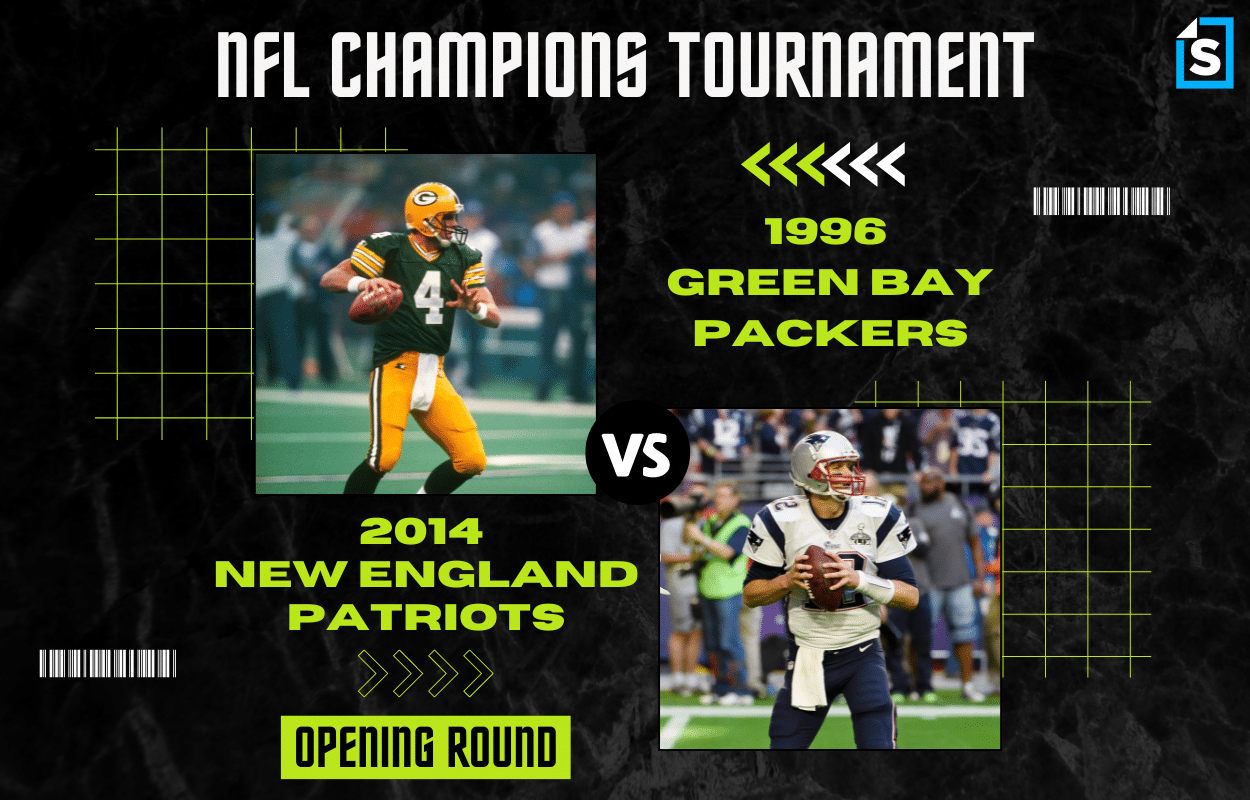
Coming off a strong 1995 season in which they went 11-5 and made the NFC title game for the only time since the 1970 merger, ultimately losing to the Dallas Cowboys, the Green Bay Packers continued their success in 1996.
They won eight of their first nine games before suffering through a two-game losing streak but then won their final five to finish 13-3, their best mark since going 13-1 in 1962. They also finished undefeated at home for the first time since that same ’62 campaign.
Brett Favre won his second consecutive NFL MVP trophy following the ’96 season, throwing for 3,899 yards and a league-leading 39 touchdowns against 13 interceptions. Green Bay had the league’s highest-scoring offense, averaging 28.5 points per game.
Not to be outdone, the Packers’ defense, led by Pro Bowlers Reggie White and LeRoy Butler, ranked first in points allowed, giving up just 13.1 per game. The unit also allowed just 19 touchdowns, at the time an NFL record for a 16-game season.
Green Bay came into the playoffs as the No. 1 seed in the NFC and essentially breezed through the entire postseason.
In the Divisional Round, the Packers dismantled the fourth-seeded 49ers, 35-14, to set up a date with the surprising Panthers. Carolina was in just its second NFL season but earned the No. 2 seed in the NFC and shocked the defending Super Bowl champion Cowboys in the Divisional Round. But the Cinderella story ended in the NFC title game as Green Bay took an easy 30-13 win.
The Packers had a bit of trouble to start Super Bowl 31, trailing the Patriots 14-10 after the first quarter. But a 17-0 run in the second shifted the momentum, and Green Bay cruised to a 35-21 victory. Favre was solid enough with 246 yards and two touchdowns.
But Desmond Howard, who had 244 kick/punt return yards, including an incredible 99-yard touchdown, was named Super Bowl MVP, becoming the first (and still only) special teams player to receive the honor.
Coming into the 2014 season, Tom Brady and the New England Patriots were a decade removed from their last championship. They’d come close the three previous seasons but took a loss in the Super Bowl to the 2011 Giants and defeats in the AFC title game to the 2012 Ravens and 2013 Broncos.
A fourth straight conference title game appearance didn’t seem to be in the cards for the Pats early in the 2014 season, not after the famous beating they took in Week 4 at the hands of the Chiefs, the game after which many thought Brady might be done.
But as he’s done so many times throughout his legendary career, TB12 fought off the haters and led New England to a 10-2 finish, giving New England a 12-4 record and the No. 1 seed in the AFC.
In the Divisional Round, the Pats got a bit of a scare from the sixth-seeded Ravens but survived with a 35-31 win. They had a much easier time in the AFC Championship Game, squashing the fourth-seeded Colts, 45-7, setting up a Super Bowl 49 matchup with the defending champion Seattle Seahawks.
And what a matchup it was. Following a scoreless first quarter, each team scored 14 in the second. The Seahawks enjoyed a 10-point lead after three, but the Patriots came back with 14 in the fourth to take a 28-24 lead. Seattle had one final chance to get in the end zone, but we all know what happened there, don’t we?
Instead of giving Marshawn Lynch the ball on the goal line, Pete Carroll chose to pass, and Russell Wilson passed right to Patriots cornerback Malcolm Butler to secure New England’s fourth championship.
| Team | 1996 Packers | 2014 Patriots |
|---|---|---|
| Record | 13-3 | 12-4 |
| Super Bowl | Def. New England Patriots 35-21 | Def. Seattle Seahawks |
| SB MVP | Desmond Howard | Tom Brady |
So we’ve seen Tom Brady take on several other big-name QBs throughout this tournament, and now we’ve got Brady vs. Favre, who only has this one shot at the Round of 32.
Winner: 1996 Green Bay Packers
Well, Favre got his lone Super Bowl win by beating Drew Bledsoe’s Patriots, so he might as well get a big win over Tom Brady’s Pats also, right? This was the closest matchup of the entire opening round, with Green Bay nabbing just 51.5% of the vote.
(27) 1990 New York Giants vs. (38) 2019 Kansas City Chiefs
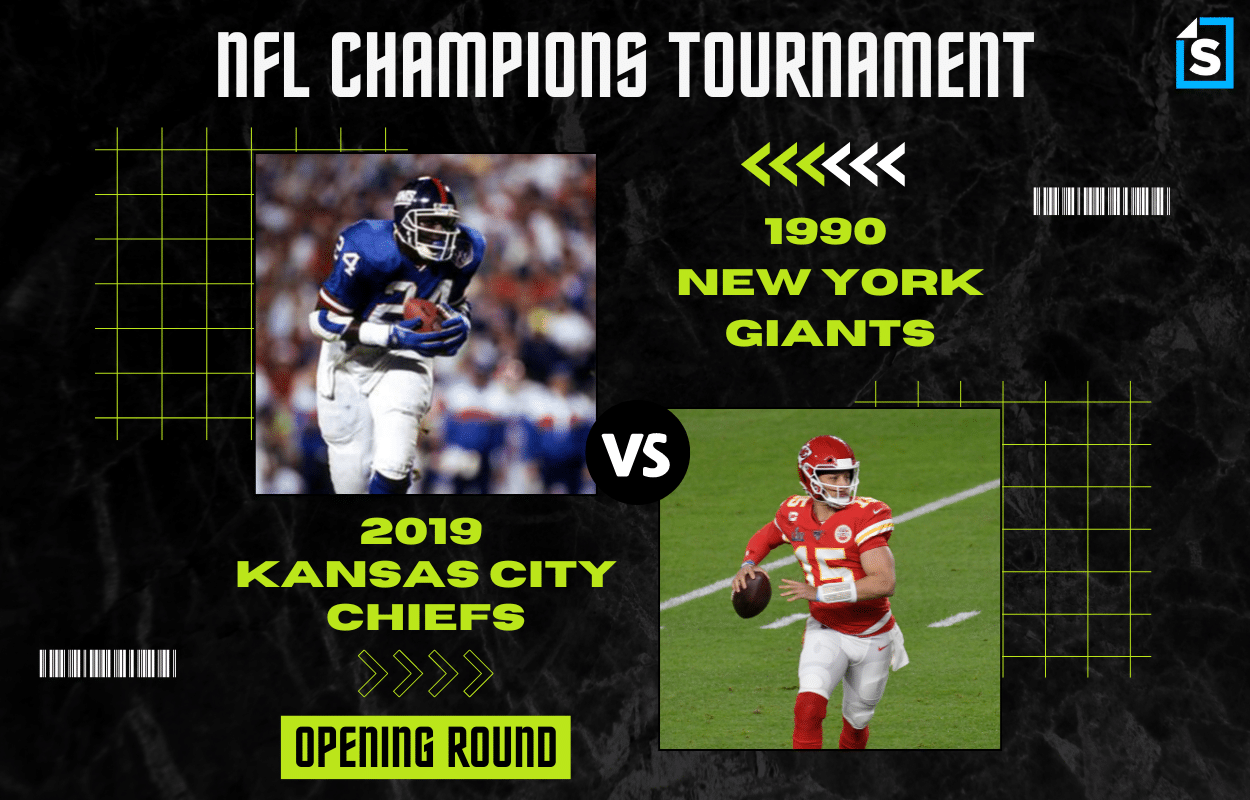
Coming off a 12-4 season in 1989, the New York Giants came storming out of the gate in 1990, winning their first 10 games. But they lost three of the next four, and Bill Parcells took a big hit in Week 15 when Pro Bowl quarterback Phil Simms broke his foot and was lost for the year, replaced by Jeff Hostetler.
Thankfully, the offense wasn’t the Giants’ strongest unit, as it ranked just 15th in the league in scoring, averaging 20.9 points per game. The defense, on the other hand, led by the great Lawrence Taylor, held opponents to just 13.2 points per game to lead the NFL.
New York ultimately finished 13-3 but was still only the No. 2 seed in the NFC, finishing one game back of the two-time defending champion San Francisco 49ers, who most assumed would finish off the first three-peat of the Super Bowl era.
But following a lopsided 31-3 win in the Divisional Round over the Chicago Bears, the Giants crushed the Niners’ shot at history with a 15-13 win at Candlestick Park in the NFC Championship Game.
That victory, of course, set up a Super Bowl 25 matchup with the Buffalo Bills, the top seed in the AFC. And we got one of the most entertaining and emotional title games in NFL history.
With the Gulf War on everyone’s mind, the Giants and Bills engaged in a fight of their own, going back and forth all night at Tampa Stadium to set up a memorable finish that saw Bills kicker Scott Norwood miss a 47-yard field goal, giving New York a 20-19 victory.
Hostetler played a solid game, throwing for 222 yards and a touchdown, and running back Ottis Anderson was named Super Bowl MVP after rushing for 102 yards and a score.
Coming off a 2018 season in which they went 12-4 and came within one possession of the Super Bowl, the Kansas City Chiefs finished the job in 2019.
Reigning NFL MVP Patrick Mahomes, who never even got to touch the football in the previous year’s overtime loss to Tom Brady and the Patriots in the AFC Championship Game, had another stellar season, completing 65.9% of his passes for 4,031 yards with 26 touchdowns against just five interceptions.
Along with fellow Pro Bowlers Tyreek Hill and Travis Kelce, Mahomes led an offense that averaged 28.2 points per game, good for fifth in the NFL. And the defense was solid in its own right, allowing 19.3, good enough for seventh.
With a 12-4 record, Kansas City won the AFC West for the fourth straight season and earned the No. 2 seed in the AFC, behind only new NFL MVP Lamar Jackson and the 14-2 Ravens.
It appeared as if the Chiefs’ season might end early as they fell behind 24-0 to the fourth-seeded Texans. But I think we all know never to count Mahomes out of a game, and this was a prime example as he led his team all the way back and then some in a 51-31 win.
Up next was a matchup with the sixth-seeded Tennessee Titans, who ended Tom Brady’s career with the Patriots in the Wild Card Round and then knocked off the top-seeded Ravens in the Divisional Round. But Kansas City ended the Cinderella story with a 35-24 win to secure the franchise’s first title game appearance since Super Bowl 4.
And after 50 years, Mahomes wasn’t going to let the Chiefs lose. Facing a tough San Francisco 49ers team that had gone 13-3, Kansas City’s new hero threw for 286 yards and two touchdowns in a 31-20 win, a victory that finally got Andy Reid a well-deserved Lombardi Trophy as a head coach.
| Team | 1990 Giants | 2019 Chiefs |
|---|---|---|
| Record | 13-3 | 12-4 |
| Super Bowl | Def. Buffalo Bills 2019 | Def. San Francisco 49ers 31-20 |
| SB MVP | Ottis Anderson | Patrick Mahomes |
So in this final matchup of our opening round, you have to ask yourself if Patrick Mahomes could escape the wrath of Lawrence Taylor. And that’s what this tournament is all about — matchups you can never actually see but want to picture.
Winner: 2019 Kansas City Chiefs
Well, given the amount of Patrick Mahomes fans out there, I kinda figured the 2019 Chiefs would take this one. But I certainly didn’t expect them to take 95% of the vote. Let’s see how they do in the Round of 32 with Joe Montana and the 1989 San Francisco 49ers.
Super Bowl Tournament Round of 32
If you missed the Opening Round, here’s a look at how things played out. And just to show how much fun we’re having thus far — of the first 24 matchups, 10 were won by the lower seed.
- (32) 2000 Baltimore Ravens def. (33) 2002 Tampa Bay Buccaneers
- (17) 1975 Pittsburgh Steelers def. (48) 2005 Pittsburgh Steelers
- (49) 2018 New England Patriots def. (16) 1977 Dallas Cowboys
- (9) 1991 Washington Commanders def. (56) 2011 New York Giants
- (41) 1974 Pittsburgh Steelers def. (24) 2017 Philadelphia Eagles
- (25) 1999 St. Louis Rams def. (40) 1995 Dallas Cowboys
- (36) 1979 Pittsburgh Steelers def. (29) 1969 Kansas City Chiefs
- (20) 1992 Dallas Cowboys def. (45) 2021 Los Angeles Rams
- (13) 2003 New England Patriots def. (52) 2010 Green Bay Packers
- (53) 1988 San Francisco 49ers def. (12) 2004 New England Patriots
- (21) 1994 San Francisco 49ers def. (44) 1987 Washington Commanders
- (37) 2006 Indianapolis Colts def. (28) 1971 Dallas Cowboys
- (34) 1993 Dallas Cowboys def. (31) 1983 Los Angeles Raiders
- (18) 1970 Baltimore Colts def. (47) 1980 Oakland Raiders
- (15) 1973 Miami Dolphins def. (50) 2001 New England Patriots
- (10) 2016 New England Patriots def. (55) 2007 New York Giants
- (42) 1997 Denver Broncos def. (23) 2009 New Orleans Saints
- (26) 1981 San Francisco 49ers def. (39) 2008 Pittsburgh Steelers
- (35) 2015 Denver Broncos def. (30) 1968 New York Jets
- (46) 2020 Tampa Bay Buccaneers def. (19) 2013 Seattle Seahawks
- (14) 1966 Green Bay Packers def. (51) 1967 Green Bay Packers
- (11) 1978 Pittsburgh Steelers def. (54) 2012 Baltimore Ravens
- (22) 1996 Green Bay Packers def. (43) 2014 New England Patriots
- (38) 2019 Kansas City Chiefs def. (27) 1990 New York Giants
If you’re looking for the tale of the tape for any of the above matchups, I again invite you to keep scrolling down the page to the Opening Round portion of the tournament.
Let’s keep things rolling with the Round of 32.
(1) 1972 Miami Dolphins vs. (32) 2000 Baltimore Ravens
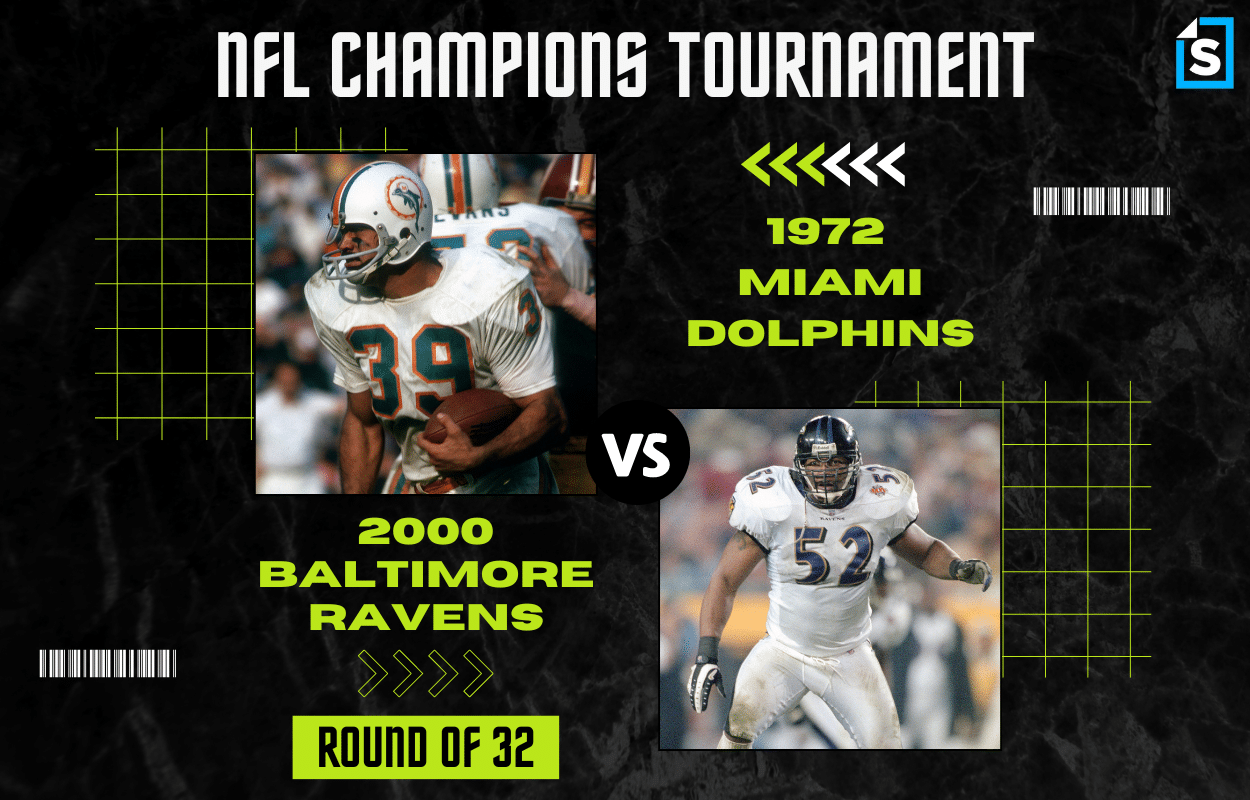
Welcome to the Round of 32, where we get our first look at the 1972 Miami Dolphins, who, of course, are the only undefeated Super Bowl champions in NFL history. Technically, however, Don Shula’s squad did lose three games that year. But we all know preseason football doesn’t really matter.
Once the regular season began, the Dolphins were dialed in and went 14-0, winning all but three games by double-digit margins. The closest they came to defeat was in Week 6 against the Buffalo Bills, escaping with a 24-23 victory.
The reason for such domination was the fact that Miami scored more points than any other team, averaging 27.5, while also allowing the fewest, giving up just 12.2 per week. The Dolphins sent nine players to the Pro Bowl between the two units.
They were also the first team in NFL history with two 1,000-yard rushers. Fullback Larry Csonka ran for 1,117 yards and six touchdowns, while running back Mercury Morris rushed for exactly a thousand yards and a dozen scores.
So you remember how I just said the Dolphins had only three games decided by single digits in the regular season? Well, all three of their playoff games went in that direction.
Obviously the top seed in the AFC, Miami kicked off the postseason by surviving a scare from the Cleveland Browns, who held a 14-13 lead in the fourth quarter before the Dolphins came back to take a 20-14 victory.
In the AFC title game, Miami faced the Pittsburgh Steelers and again fell behind in the second half before storming back for a 21-17 win on the road. Yes, you read that correctly. Despite being undefeated, the Dolphins were forced to play in Pittsburgh due to an NFL rule that has obviously since been changed.
A Super Bowl rematch with the Cowboys was on the table, but Dallas was manhandled in the NFC Championship Game by Washington, 26-3. The team now known as the Commanders had gone 11-3 in the regular season and presented a legitimate threat to wreck Miami’s perfect season.
But the Dolphins took control early and held a 14-0 lead at halftime of Super Bowl 7. The Dolphins wouldn’t score another point, but the defense held strong, and the only touchdown Washington could muster stemmed from a blocked field goal that turned into one of the most hilarious plays in Super Bowl history. With two interceptions, one of which he returned for 55 yards, safety Jake Scott was named the game’s MVP.
While the 2000 Baltimore Ravens didn’t have the NFL’s top-ranked offense, coming in at 14th in points scored with 20.8 per game, Brian Billick’s bunch did have the top-ranked defense.
Led, of course, by future Hall of Famer Ray Lewis, the Ravens allowed just 10.3 points per game, the fewest since the league went to a 16-game schedule in 1978. The unit pitched four shutouts that season, starting with a 16-0 win over the rival Steelers in Week 1.
In fact, Baltimore held three of its fellow AFC Central opponents scoreless in the first five weeks. There were the Steelers in Week 1 and then back-to-back shutouts of the Bengals and Browns in Weeks 4 and 5, respectively. The fourth was a 27-0 drubbing of the Dallas Cowboys in Week 12.
Following a three-game losing streak in the middle part of the season that dropped them to 5-4, the Ravens won their final seven by an average of 18 points to finish 12-4. They failed to win the division, finishing a game behind the 13-3 Tennessee Titans, but earned the No. 4 seed in the AFC as the top wild-card team.
But they certainly didn’t play like the fourth-best team in the AFC in the postseason. Baltimore breezed through the fifth-seeded Broncos in the Wild Card Round, 21-3, and then made easy work of the top-seeded Titans in the Divisional Round, 24-10.
The AFC Championship Game wasn’t much of a challenge either, as the Ravens cruised to a 16-3 win over the Raiders. And Super Bowl 35 was their biggest win of all in the playoffs as they pounded the NFC’s top seed, the New York Giants, in a 34-7 victory. With five tackles and four pass deflections, Lewis was named the game’s MVP.
It wouldn’t seem possible that the Baltimore defense could better its points-allowed record from the regular season, but it somehow managed to do so, allowing a ridiculous 5.75 points in four postseason games.
So how much fun is this one to kick off our second round? On the defensive side of things, we’ve got two historically great units here.
The offensive edge obviously goes to the Dolphins, whose historic run is even more impressive due to the fact that Pro Bowl quarterback Bob Griese broke his ankle in Week 5. Luckily, Earl Morrall, arguably the greatest regular backup QB in NFL history and an NFL MVP award winner, stepped in, and Miami never skipped a beat. Griese did return in time to appear in the Dolphins’ final two games and started the Super Bowl.
| Team | 1972 Dolphins | 2000 Ravens |
|---|---|---|
| Record | 14-0 | 12-4 |
| Super Bowl | Def. Washington Commanders 14-7 | Def. NY Giants 34-7 |
| SB MVP | Jake Scott | Ray Lewis |
So what do you think? Could Ray Lewis’ Ravens actually knock off the undefeated Dolphins?
Winner: 1972 Miami Dolphins
Well, it looks like the answer to that question above is no, although not a unanimous no. The 2000 Ravens received 28% of the vote here, but are headed home as the ’72 Dolphins remain undefeated for now.
(17) 1975 Pittsburgh Steelers vs. (49) 2018 New England Patriots
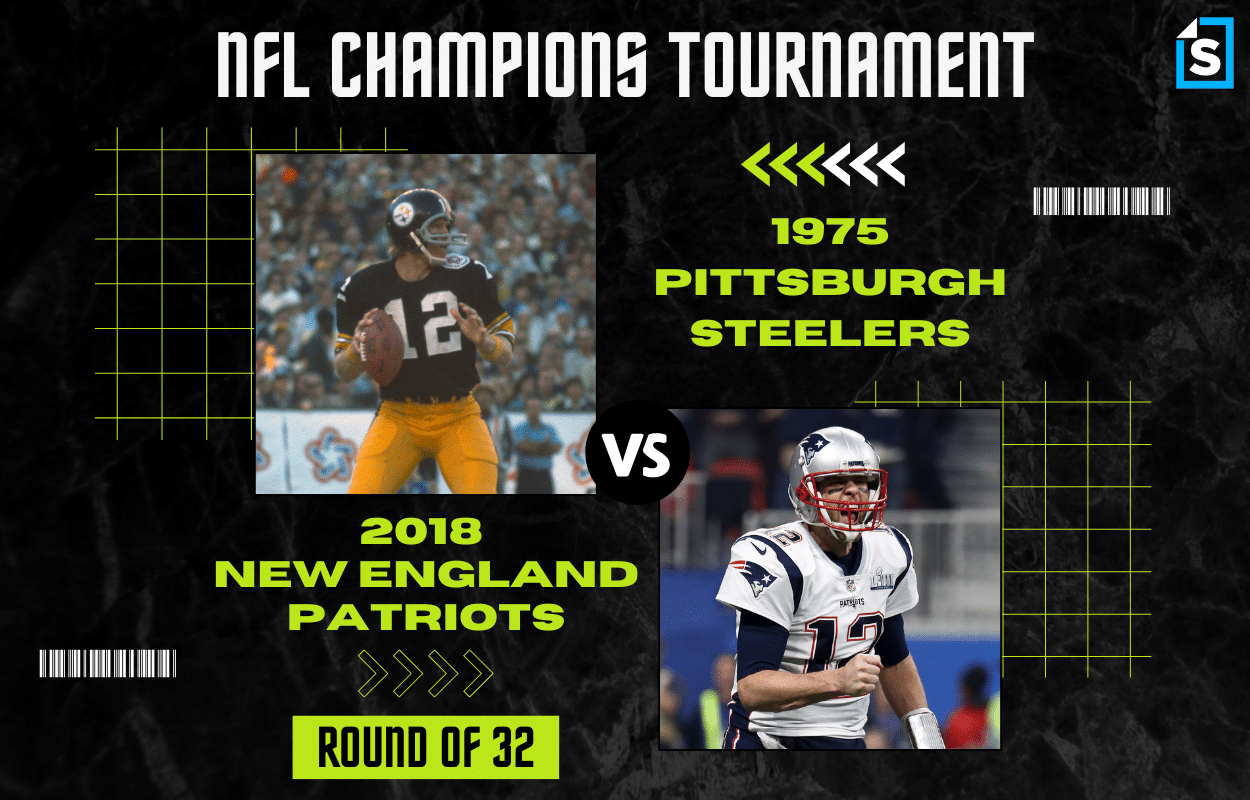
Of the first 10 Super Bowls played, six were won by back-to-back title teams. The Green Bay Packers, of course, won the first two and hilariously were seeded against one another in the Opening Round of this tournament.
Then you had the Miami Dolphins, who, as we just mentioned, won Super Bowl 7 as part of their undefeated ’72 season and followed it up with a win in Super Bowl 8. You’ll see that ’73 squad later in the Round of 32.
And then we’ve got the Pittsburgh Steelers, who followed up their title-winning season in 1974 (you’ll also see that team again soon) with another Super Bowl run in 1975.
The ’75 squad was certainly more potent on offense as Terry Bradshaw helped bump up the Steelers’ scoring average to 26.6 points per game, nearly five higher than the previous season. As mentioned in the Opening Round, this Pittsburgh team held the franchise record for most points scored in a single season until 2010.
Franco Harris rushing for a career-high 1,246 yards and 10 touchdowns while adding 214 receiving yards and a touchdown certainly didn’t hurt. Nor did Lynn Swann’s 781 receiving yards and 11 touchdowns.
But while the offense was good, the defense was the superior unit for Chuck Noll. Led by Defensive Player of the Year Mel Blount and featuring seven additional Pro Bowlers, the Steelers’ defense allowed just 11.6 points per game, good for second in the NFL.
And that defense dominated in the postseason as well. With a 12-2 record, Pittsburgh earned the top seed in the AFC and rocked the Baltimore Colts in the Divisional Round before knocking off the rival Raiders in the conference title game, allowing just 10 points in each win.
The Steelers faced a much tougher test in the Super Bowl as they squared off against Tom Landry’s Dallas Cowboys, who were a surprise entrant to the Big Game. The No. 4 seed in the NFC, the Cowboys defeated the top-seeded Vikings in the Divisional Round and then beat the second-seeded Rams to earn this matchup against the defending champs.
And Dallas actually held a three-point lead heading into the fourth quarter of Super Bowl 10 before the Pittsburgh offense woke up and scored 14 points in the final frame en route to a hard-fought 21-17 victory.
Speaking of knocking off the Cowboys, we come to the 2018 New England Patriots, who pulled off the first upset of his tournament by defeating Dallas’ 1977 squad to earn their spot in the Round of 32.
Should these ’18 Patriots be the No. 49 seed? No, probably not. But the formulaic seeding put them there, so you can’t blame me — I mean, outside the fact that I constructed the formula. But I digress.
Bill Belichick’s Pats were coming off a Super Bowl loss the previous season and took some bad losses early in the 2018 campaign. They lost by 11 to the Jaguars in Week 2 and by 16 to the Lions in Week 3 to fall to 1-2.
But they only lost three games the rest of the way and finished 11-5, which earned New England a 10th consecutive division title and the second seed in the AFC. Tom Brady had a solid season, completing 65.8% of his passes for 4,355 yards and 29 touchdowns, but he also threw double-digit interceptions for the first time in five years with 11.
And if you can believe it, he threw more interceptions in the Patriots’ three postseason games than he did touchdowns, tossing three picks as opposed to two TDs. And that was with New England scoring 41 points in their Divisional Round win over the Chargers.
TB12 threw just one touchdown in that game and threw his second in the Pats’ dramatic overtime win in the AFC title game against second-year stud Patrick Mahomes and the Kansas City Chiefs, against whom he also threw two of his three picks.
The third came in Super Bowl 53, where New England won a bit of a snoozefest over the LA Rams, 13-3. This was Brady and Belichick’s sixth and final Super Bowl win together.
| Team | 1975 Steelers | 2018 Patriots |
|---|---|---|
| Record | 12-2 | 11-5 |
| Super Bowl | Def. Dallas Cowboys 21-17 | Def. LA Rams 13-3 |
| SB MVP | Lynn Swann | Julian Edelman |
Well, Brady and the ’18 Pats already knocked off one legendary team from the ’70s in the Opening Round. Can they do it again here in the Round of 32?
Winner: 1975 Pittsburgh Steelers
This was one of the closest votes we’ve had throughout the entire tournament thus far, with the Steelers just edging out the Patriots, 53% to 47%, setting up a ’70s showdown with the Dolphins in the Round of 16.
(9) 1991 Washington Commanders vs. (41) 1974 Pittsburgh Steelers
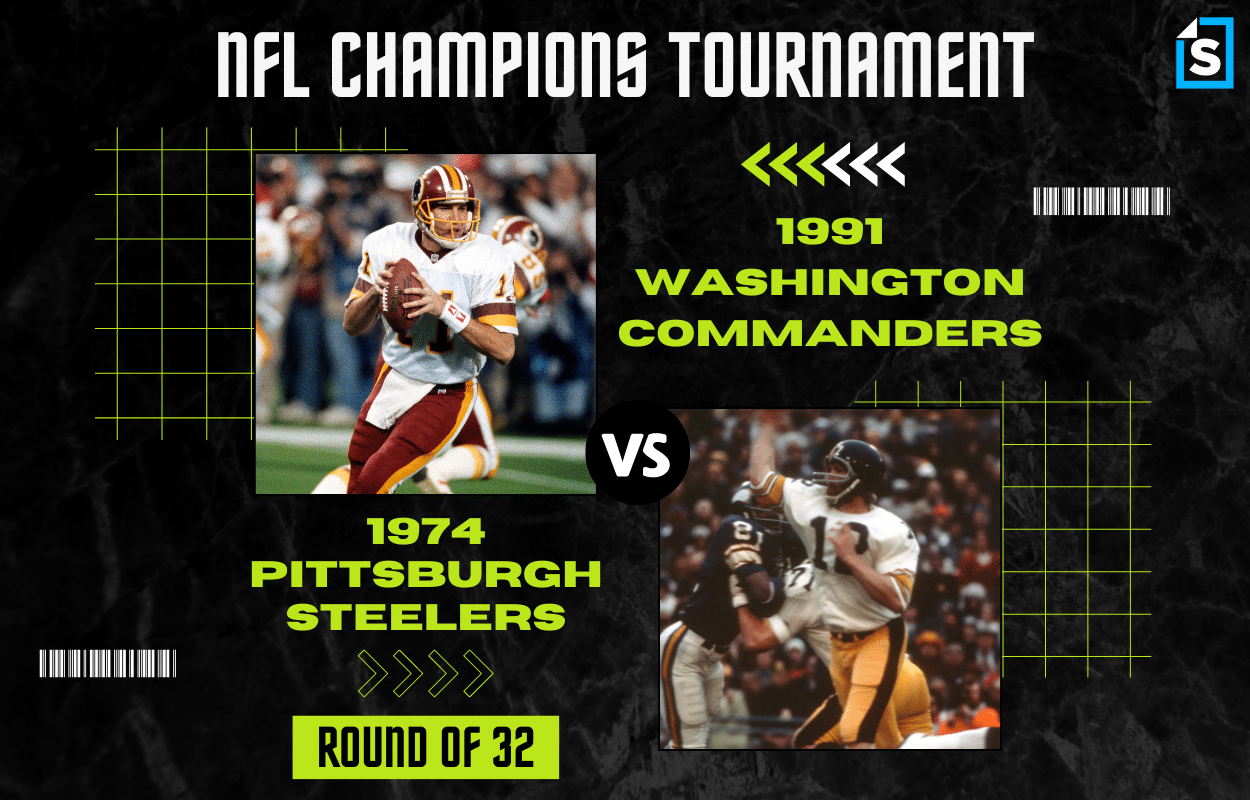
Is it just me, or does anyone else think the 1991 Washington Commanders get overlooked as one of the greatest teams in NFL history because of the timeline of their title win?
Think about it.
Washington was the second opponent during the Buffalo Bills’ four-year losing streak in the Super Bowl. A year earlier, Buffalo lost in heartbreaking fashion when Scott Norwood went wide right in what was easily one of the most emotional title games of all time.
And in the two years that followed the Commanders-Bills matchup, the Dallas Cowboys went back-to-back in beating Buffalo. Then it was finally Steve Young’s turn to win a Super Bowl with the 49ers. Then it was the Cowboys winning a third in four years. After that, it was Brett Favre’s turn and then John Elway’s…twice. And the decade ended with arguably the greatest offense in NFL history with the St. Louis Rams.
The ’90s were full of great stories, and Washington always seems to get lost in the shuffle. But Joe Gibbs put a damn good football team on the field in 1991, and they’re the No. 9 seed in this tournament for a reason.
As a reminder, the ’91 Commanders went 14-2 and boasted the league’s highest-scoring offense while allowing the second-fewest points. And those two defeats were by a combined five points, a 24-21 loss to the Cowboys in Week 13 and a 24-22 loss to the Eagles to close out the regular season.
And once the postseason arrived, they were never truly challenged. Washington beat Atlanta by 17 in the Divisional Round, knocked off the second-seeded Lions by 31 in the NFC title game, and defeated Buffalo by 13 in the Super Bowl. Give these guys their props, folks.
Pittsburgh’s 1974 squad is the lowest-seeded Steelers team of the four that won Super Bowls in the 1970s, all of which advanced to the Round of 32, by the way.
But let’s not forget that this was the team that got the Pittsburgh dynasty rolling. And it’s not as if they were a weak team by any stretch of the imagination, as Chuck Noll’s unit went 10-3-1, winning the first of six consecutive AFC Central titles.
The offense was solid as Terry Bradshaw led a group that scored 21.8 points per game, good for sixth in the NFL, but the defense was the star attraction, allowing just 13.5, second only to the LA Rams’ 12.9. Jack Lambert was awarded Defensive Rookie of the Year, while “Mean” Joe Greene took Defensive Player of the Year honors.
Both units were even better in the postseason. In victories over the Bills in the Divisional Round, the Raiders in the AFC Championship Game, and the Vikings in Super Bowl 9, the Steelers’ offense averaged 24 points per game while the Pittsburgh defense allowed just 11. Buffalo’s offense ranked only 12th of 26 teams, but the Raiders ranked first, and the Vikings ranked fifth.
That’s how good that Steel Curtain was.
| Team | 1991 Commanders | 1974 Steelers |
|---|---|---|
| Record | 14-2 | 10-3-1 |
| Super Bowl | Def. Buffalo Bills 37-24 | Def. Minnesota Vikings 16-6 |
| SB MVP | Mark Rypien | Franco Harris |
We’ve already seen the ’75 Steelers advance to the Round of 16. Will their predecessors join them, or will Washington’s often-overlooked 1991 squad get their second victory in this tournament?
Winner: 1974 Pittsburgh Steelers
Well, Washington’s winning ways are over, as the ’74 Steelers took 60% of the vote to advance to the Round of 16. I guess not as many people agreed with my assessment of that Commanders team as I thought might. But such is the beauty of getting you all involved.
(8) 1998 Denver Broncos vs. (25) 1999 St. Louis Rams
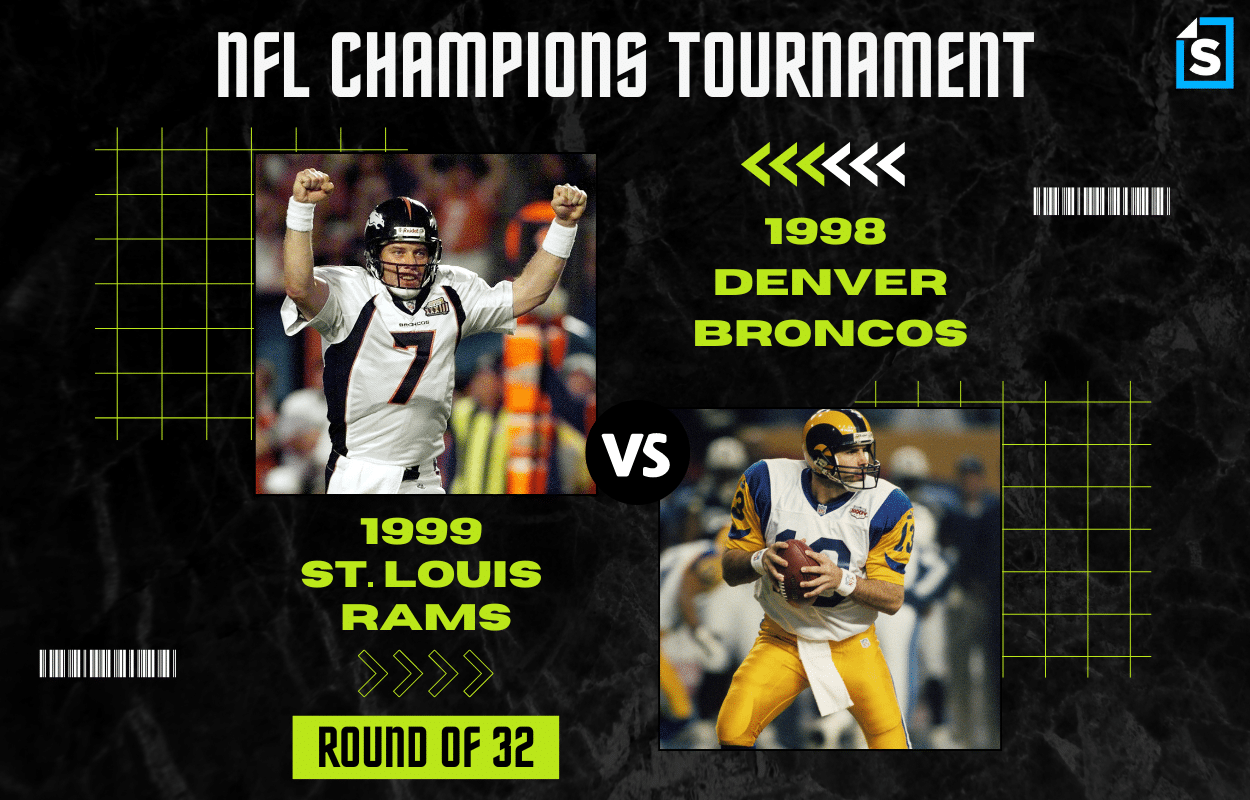
This is our first look at the eighth-seeded 1998 Denver Broncos, the second of John Elway’s back-to-back Super Bowl-winning squads.
Despite Elway missing three games and not starting another due to various injuries, the Broncos bested their 12-4 record from the previous year by going 14-2, which remains the best mark in franchise history. They began the season by winning their first 13 games, the best start since the ’72 Dolphins, and many thought they were on their way to an undefeated season before the New York Giants pulled off a 20-16 upset in Week 15.
Just like the Giants to ruin a perfect season, isn’t it?
Denver lost again the following week to Miami but closed out the year with a victory over the Seahawks to secure the top seed in the AFC. With 178 yards in that final week, Terrell Davis became only the fourth running back to surpass 2,000 rushing yards, ultimately finishing with 2,008 and a league-high 21 touchdowns. He was later voted NFL MVP.
In the Divisional Round of the postseason, the Broncos got their revenge on the fourth-seeded Dolphins with a 38-3 victory, marking Denver’s first win over Miami in three decades. They then knocked off the second-seeded Jets in the AFC title game, 23-10, after trailing 10-0.
While most expected Denver to square off with Minnesota in Super Bowl 33, the one-loss Vikings were upended by the two-loss Falcons in the NFC Championship Game. But the Broncos didn’t suffer the same fate.
Behind 336 passing yards from Elway and 102 rushing yards from Davis, Denver walked away with a 34-19 victory. Elway was named the game’s MVP and rode off into the sunset.
With Elway out of the picture and the Broncos taking a big step back, the NFL needed a new Super Bowl champion, and the 1999 St. Louis Rams were happy to fill that slot.
But it’s not as if the Rams were supposed to win Super Bowl 34. After all, the franchise hadn’t had a winning season in a decade and was coming off a 4-12 season. Sure, they’d made a big splash in acquiring Marshall Faulk, but it was hard to get too excited about a team led by Trent Green, a third-year quarterback who’d gone 6-8 the previous year in Washington and completed just 54.6% of his passes.
And things looked even worse when Green tore his ACL in the preseason, leaving the signal-calling duties to little-known Kurt Warner. But we all know what happened next.
Warner went on to win NFL MVP, throwing for 4,353 yards and 41 touchdowns while leading the Rams to a 13-3 record. And with 1,381 rushing yards, Faulk finished second in the voting. Combine those two with wideouts Isaac Bruce and Torry Holt, and you got “The Greatest Show on Turf,” which was arguably the most dangerous offense in NFL history.
St. Louis took care of Minnesota in the Divisional Round by putting up 49 points, and the defense was on display in the NFC title game in an 11-6 win over Tampa Bay. The Rams then played one of the greatest Super Bowls of all time, besting the Tennessee Titans, 23-16, in a game that came down to the last second and was decided by a single yard.
| Team | 1998 Broncos | 1999 Rams |
|---|---|---|
| Record | 14-2 | 13-3 |
| Super Bowl | Def. Atlanta Falcons 34-19 | Def. Tennessee Titans 23-16 |
| SB MVP | John Elway | Kurt Warner |
This is easily one of my favorite matchups in this Round of 32. You’ve got two quarterbacks with NFL MVP trophies, two running backs with NFL MVP trophies (Faulk won in 2000), fantastic wide receivers, and solid defensive units.
Winner: 1999 St. Louis Rams
Well, I was expecting a close vote here and got the exact opposite, as the ’99 Rams took 100% of this vote. But that’s not it for Elway & Co., as the ’97 squad is still alive, at least for now. And we’re now all set for a Round of 16 matchup between “The Greatest Show on Turf” and the Steel Curtain.
(4) 1976 Oakland Raiders vs. (36) 1979 Pittsburgh Steelers
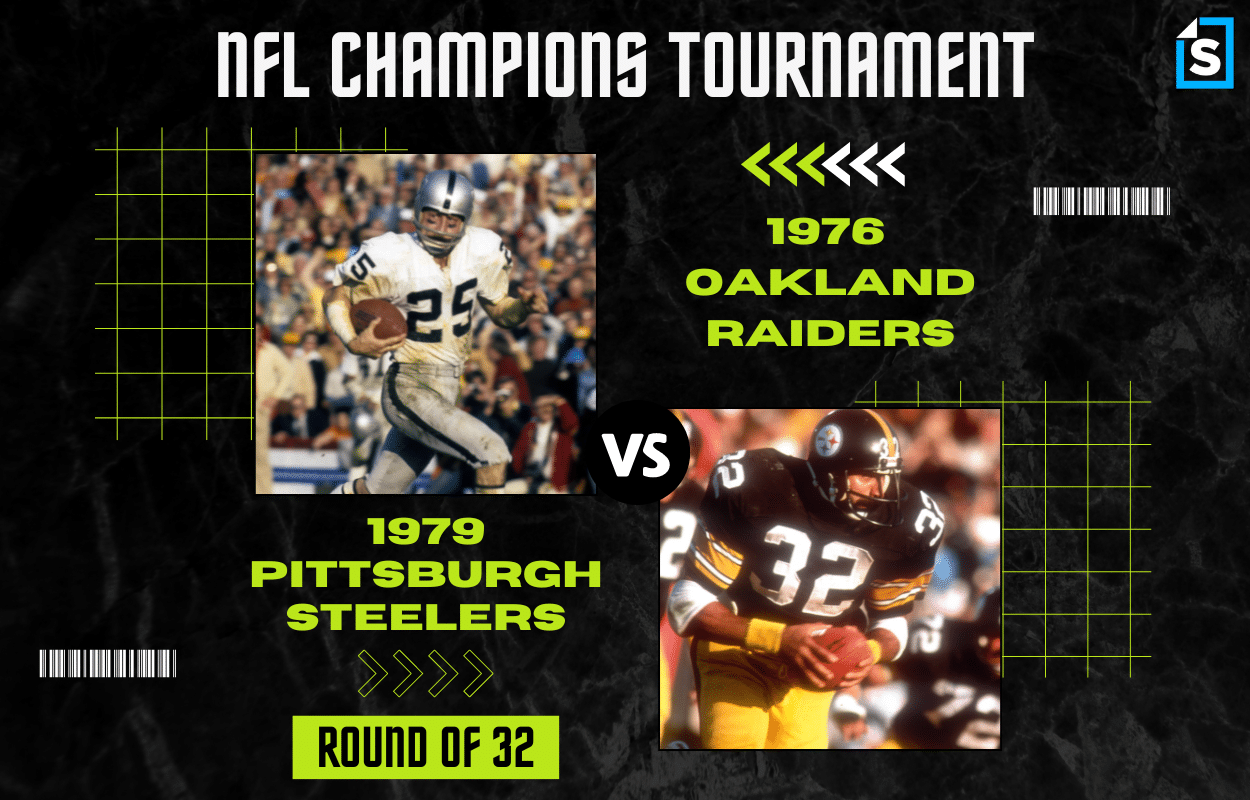
You know how the Buffalo Bills had phenomenal seasons in the 1990s but could never win the big one? That was John Madden’s Oakland Raiders for a decade in the ’60s and ’70s.
Technically, they did win a title in 1967 by winning the AFL Championship. But they lost Super Bowl 2 to the Green Bay Packers. From 1968 to 1970, they reached the AFL or AFC Championship and lost all three.
In 1971, they missed the playoffs altogether, but returned in 1972, only to lose to the Steelers in the Divisional Round. The Raiders again made three consecutive AFC Championship Game appearances from 1973 to 1975 but again lost all three.
But in 1976, the losing stopped. In fact, Madden & Co. dropped just one game all year, finishing 13-1 to take their fifth straight AFC West title and the top seed in the AFC.
The only loss Oakland suffered was a 48-17 beating in Week 4 at the hands of the New England Patriots, who just happened to be their first opponent in the postseason. And it looked like another loss was in the cards as New England took a 21-10 lead into the fourth quarter. But the Raiders reeled off 14 points in the final frame for a dramatic 24-21 victory.
Up next was a conference championship date with the two-time defending Super Bowl champion Pittsburgh Steelers, who’d beaten Oakland in the previous two AFC title games. But the Raiders showed no fear and rolled over their rivals, 24-7, behind a two-touchdown performance from Pro Bowl quarterback Ken Stabler.
Madden’s crew completed the dream season with a 32-14 win over the Minnesota Vikings in Super Bowl 11. The Oakland defense picked off Fran Tarkenton twice, and with four catches for 79 yards, Fred Biletnikoff was named the game’s MVP.
Coming off a third Super Bowl title in five years, the 1979 Pittsburgh Steelers made it four in six with another championship run to close out the decade they dominated.
The Steelers’ offense was the highest-scoring in the NFL, averaging 26 points per game, despite a strange season from Terry Bradshaw, who threw 26 touchdowns but also 25 interceptions while completing only 54.9% of his passes. But Franco Harris rushing for 1,000-plus yards for the sixth straight season certainly helped matters.
As it had been for years, the Pittsburgh defense, led by Defensive Player of the Year Jack Lambert, was stellar once again, allowing just 16.4 points per game.
The Steelers finished the regular season at 12-4 to earn their sixth straight AFC Central title and the No. 2 seed in the AFC. All four losses came on the road, a problem Pittsburgh avoided in the postseason.
Instead of having to visit the top-seeded Chargers in the AFC title game following a win over the third-seeded Dolphins in the Divisional Round, the Steelers got a home game as the fourth-seeded Oilers upset San Diego. And Chuck Noll’s champs had no problem with Houston, easily taking a 27-13 victory.
Nor did they have much of a problem with the LA Rams in Super Bowl 14, waltzing to a 31-19 win behind a big game from Bradshaw, who won his second straight Super Bowl MVP trophy.
| Team | 1976 Raiders | 1979 Steelers |
|---|---|---|
| Record | 13-1 | 12-4 |
| Super Bowl | Def. Minnesota Vikings 32-14 | Def. LA Rams 31-19 |
| SB MVP | Fred Biletnikoff | Terry Bradshaw |
The beautiful part of this matchup is that we’ve somewhat already seen it. The ’70s Steelers and the ’70s Raiders played a ton of big games against one another, and it’s almost a shame that one has to go this early in the tourney. But one does have to go, and it’s now time to decide who it’s gonna be.
Winner: 1976 Oakland Raiders
Perhaps it’s all the John Madden hoopla this past week as the NFL plans to honor him throughout its Thanksgiving Day broadcasts, but whatever it was, his ’76 Raiders took 100% of the vote to knock the ’79 Steelers out of this tournament with authority. BOOM!
(13) 2003 New England Patriots vs. (20) 1992 Dallas Cowboys
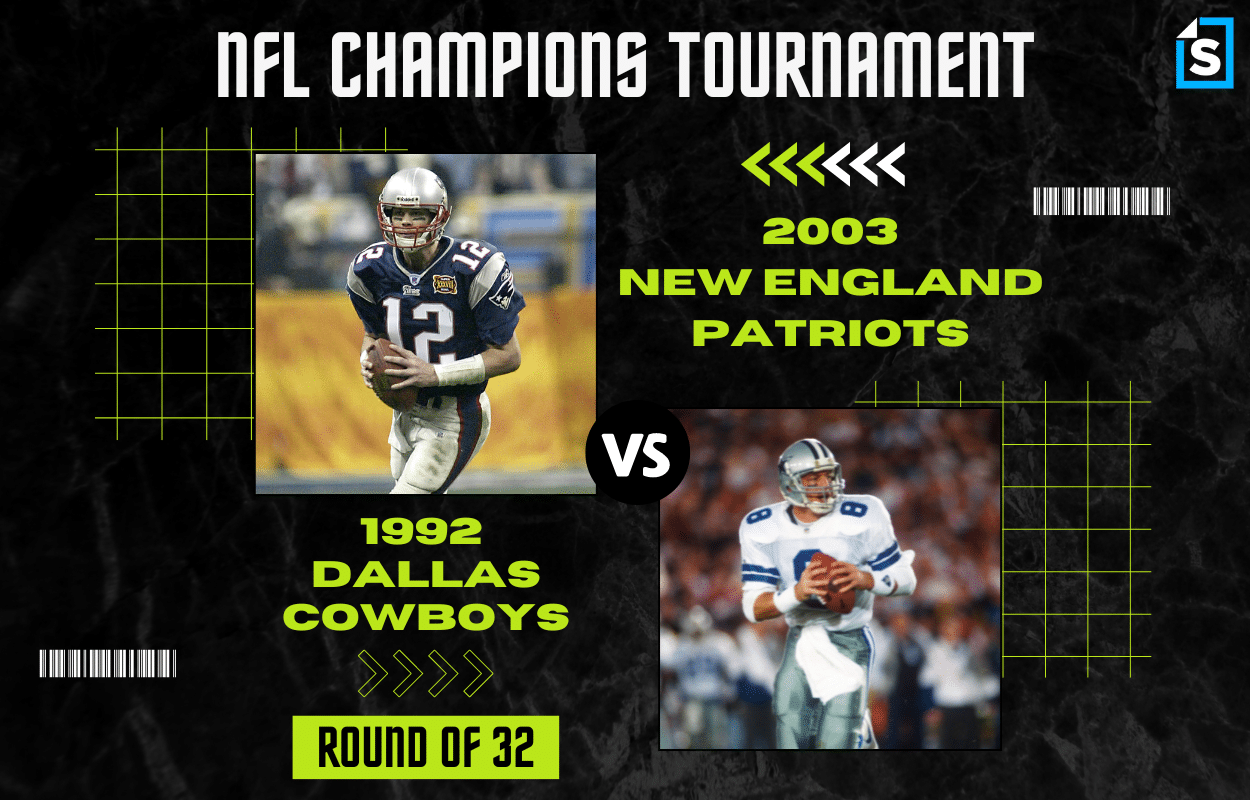
The 2003 New England Patriots were proof that Tom Brady’s first Super Bowl run following the ’01 campaign was no fluke, which some thought it might have been as the Pats missed the postseason in 2002 with a 9-7 record.
But Brady & Co. took only two losses during the ’03 season, and those came in the first four weeks. After a three-point loss in Washington in Week 4, New England ran the table, but there were a lot of close calls. In their final 12 regular-season games, seven were decided by single digits, and two went to overtime.
Nevertheless, the Patriots, who only had the NFL’s 12th-ranked offense but the top-ranked defense, finished 14-2 to take the top seed in the AFC.
The Patriots had another close call in the Divisional Round but squeaked past the Tennessee Titans, 17-14. The AFC Championship Game wasn’t as close as that top-ranked defense picked off Peyton Manning four times, three of those interceptions coming from Ty Law in a 24-14 win over the Colts.
Super Bowl 38 proved to be another close call, but the Patriots survived yet again with a 32-29 win over the Carolina Panthers in a game that featured 27 combined fourth-quarter points.
Coming off the franchise’s first postseason appearance since 1985, which resulted in a 38-6 loss to the Detroit Lions, the 1992 Dallas Cowboys took just one double-digit loss and suffered just three defeats all year.
The Cowboys’ offense, led by the Hall of Fame trio of Troy Aikman, Emmitt Smith, and Michael Irvin, ranked second in the NFL in scoring, averaging 25.6 points per game. And the Dallas defense allowed just 15.2 points per game, good for fifth. Not bad for the youngest team in the entire league, right?
With their 13-3 record, Jimmy Johnson & Co. won the team’s first division title since the aforementioned ’85 season and earned the No. 2 seed in the NFC.
That lone double-digit loss mentioned above came at the hands of the rival Philadelphia Eagles, but the Cowboys got their revenge in the Divisional Round with a 34-10 win, sending Dallas to the NFC title game for the first time in a decade.
It was the first of four straight conference title game appearances for the Cowboys, all four of which were against the rival San Francisco 49ers, who were the top seed in the NFC that season with a 14-2 record. The Niners were also the highest-scoring team in the NFL in 1992, averaging 26.9 points per game. And it’s not as if the San Francisco defense was any kind of weak link, as Bill McPherson’s unit allowed just 14.8 points per game, good for third in the league.
But behind 322 passing yards and two touchdowns from Troy Aikman, 114 rushing yards and a touchdown from Emmitt Smith, and a solid defensive effort that included two picks on Steve Young, Dallas walked away with a 30-20 upset victory.
And in their first Super Bowl appearance in 14 years, the Cowboys made easy work of the Buffalo Bills, 52-17, which is still tied for the third-biggest blowout in Super Bowl history.
| Team | 2003 Patriots | 1992 Cowboys |
|---|---|---|
| Record | 14-2 | 13-3 |
| Super Bowl | Def. Carolina Panthers 32-29 | Def. Buffalo Bills 52-17 |
| SB MVP | Tom Brady | Troy Aikman |
Once again, it’s a shame that one of these teams has to go, but that’s the way it goes. Does Tom Brady lose another shot at winning this tournament, or do the Dallas Cowboys lose for the fourth time? Let’s find out.
Winner: 1992 Dallas Cowboys
The ultimate individual Super Bowl champion’s chance of winning this ultimate Super Bowl tournament continues to dwindle as Brady’s 2003 Patriots were hammered here as the ’92 Cowboys took 100% of the vote, setting up a matchup with Madden’s ’76 Raiders in the Round of 16.
(21) 1994 San Francisco 49ers vs. (53) 1988 San Francisco 49ers
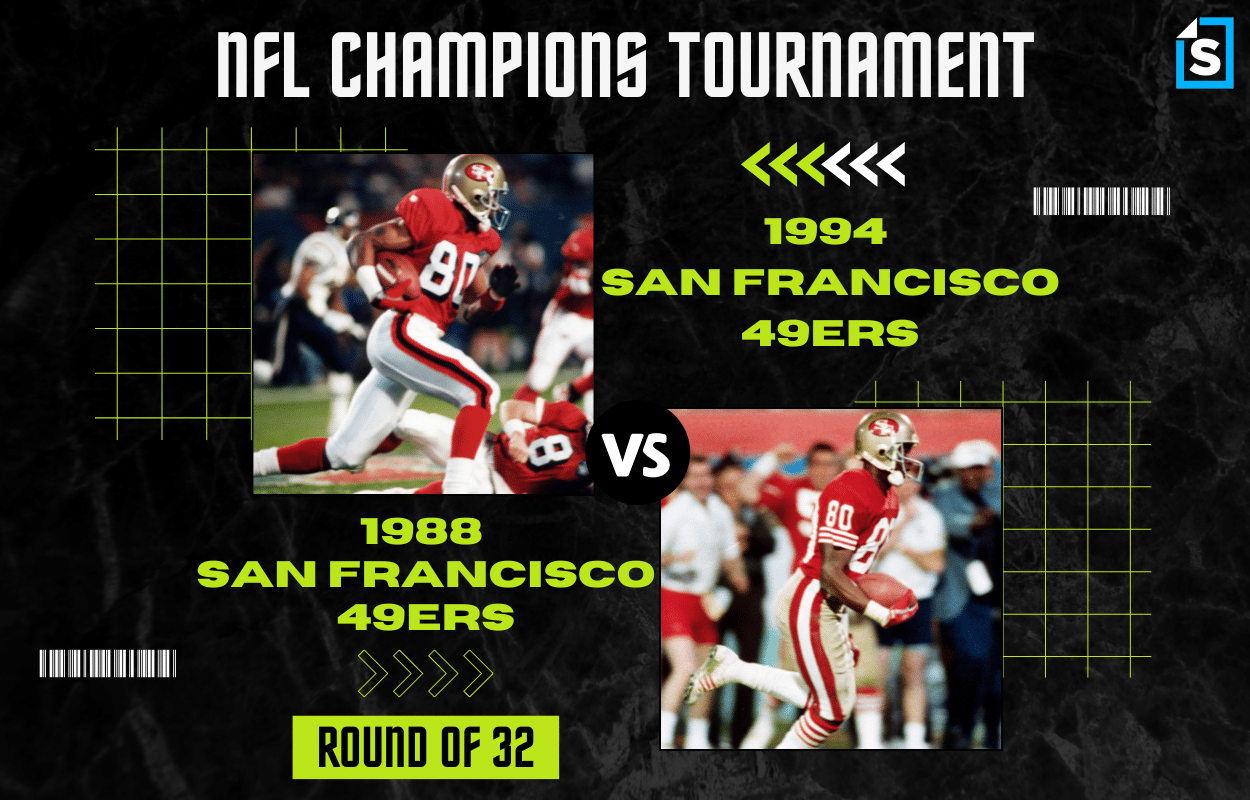
We’ve seen a few matchups now featuring the same franchise, but this just might be the best of them all, at least to this point in the tournament.
I said this in the Opening Round, but it bears repeating here. If not for the Dallas Cowboys, we might look at the 1990s San Francisco 49ers as one of the great dynasties in NFL history.
It took years for Steve Young to get his chance to shine in San Francisco, which is understandable as the guy in front of him on the depth chart was Joe Montana. But once he got his shot, he damn sure took advantage.
In his first full season as the true starter in San Francisco in 1992, he won NFL MVP and led the Niners to the first of four consecutive NFC Championship Game appearances, where they lost to the eventual Super Bowl champion Cowboys. Outside of winning MVP, the 1993 season went down precisely the same way as San Francisco was again bested by Dallas. The ’95 campaign played out that way as well.
But then there was the 1994 season. Young again won MVP, completing a league-best and career-high 70.3% of his passes for 3,969 yards and 35 touchdowns. Thirteen of those TD passes went to Jerry Rice, who had 1,499 receiving yards and finished third in the MVP vote. The Niners’ one-year rental and the 1994 Defensive Player of the Year, Mr. Deion Sanders, finished fourth.
San Francisco finished a league-best 13-3 to earn the top seed in the NFC, and after crushing the Chicago Bears in the Divisional Round, 44-15, the Niners got a third consecutive shot at the Cowboys. And just as Young had finally shed the shadow of Montana, the 49ers shed the shadow of America’s Team, earning a trip to Super Bowl 29 with a 38-28 win behind two TD passes from Young, one of which went to Rice.
But Young saved his best game of the year for last as he threw a Super Bowl record six touchdowns, three to Rice in a 49-26 thumping of the San Diego Chargers. It was technically Young’s third championship, but the first he could genuinely say was his.
What some may not remember about the 1988 San Francisco 49ers was the quarterback controversy between Montana and Young. Bill Walsh had actually benched Montana the previous season, and there was a lot of talk during the ’88 campaign that Montana might be traded. That, of course, didn’t happen, but Young appeared in 11 games in 1988 and started three of them.
As mentioned in our Opening Round, Montana didn’t have his most outstanding season, completing just 59.9% of his passes, the lowest rate of his career, and throwing just 18 touchdowns against 10 interceptions. Nevertheless, he ultimately won out and helped the Niners finish 10-6, which was actually more impressive than it sounds as San Francisco started 6-5.
That in itself was a bit surprising as they’d gone 13-2 the previous season and were the favorites to win the Super Bowl before being upset by the Vikings in the playoffs.
And it was those same Vikings with whom the 49ers squared off in the Divisional Round following the ’88 campaign. But there would be no upset this time around as Montana and Jerry Rice hooked up for three touchdowns in an easy 34-9 win. The two connected for two more scores in the NFC title game as San Francisco rolled over the top-seeded Chicago Bears, 28-3.
The momentum carried over into Super Bowl 23 as Montana and Rice connected 11 times for 215 yards and a touchdown against the Bengals in a dramatic 20-16 comeback victory.
| Team | 1994 49ers | 1988 49ers |
|---|---|---|
| Record | 13-3 | 10-6 |
| Super Bowl | Def. San Diego Chargers 49-26 | Def. Cincinnati Bengals 20-16 |
| SB MVP | Steve Young | Jerry Rice |
Bill Walsh vs. George Seifert. Joe Montana vs. Jerry Young. Roger Craig vs. Ricky Watters. Jerry Rice vs. Jerry Rice. How can you not love this matchup? But somebody has to go.
Winner: 1994 San Francisco 49ers
As I expected, this was a close vote. Actually, this is one of the closest we’ve had to this point. But as we said, somebody’s gotta go. And in this instance, it’s Joe Montana as Steve Young and his ’94 Niners squeaked by, 52% to 48%.
(5) 1982 Washington Commanders vs. (37) 2006 Indianapolis Colts
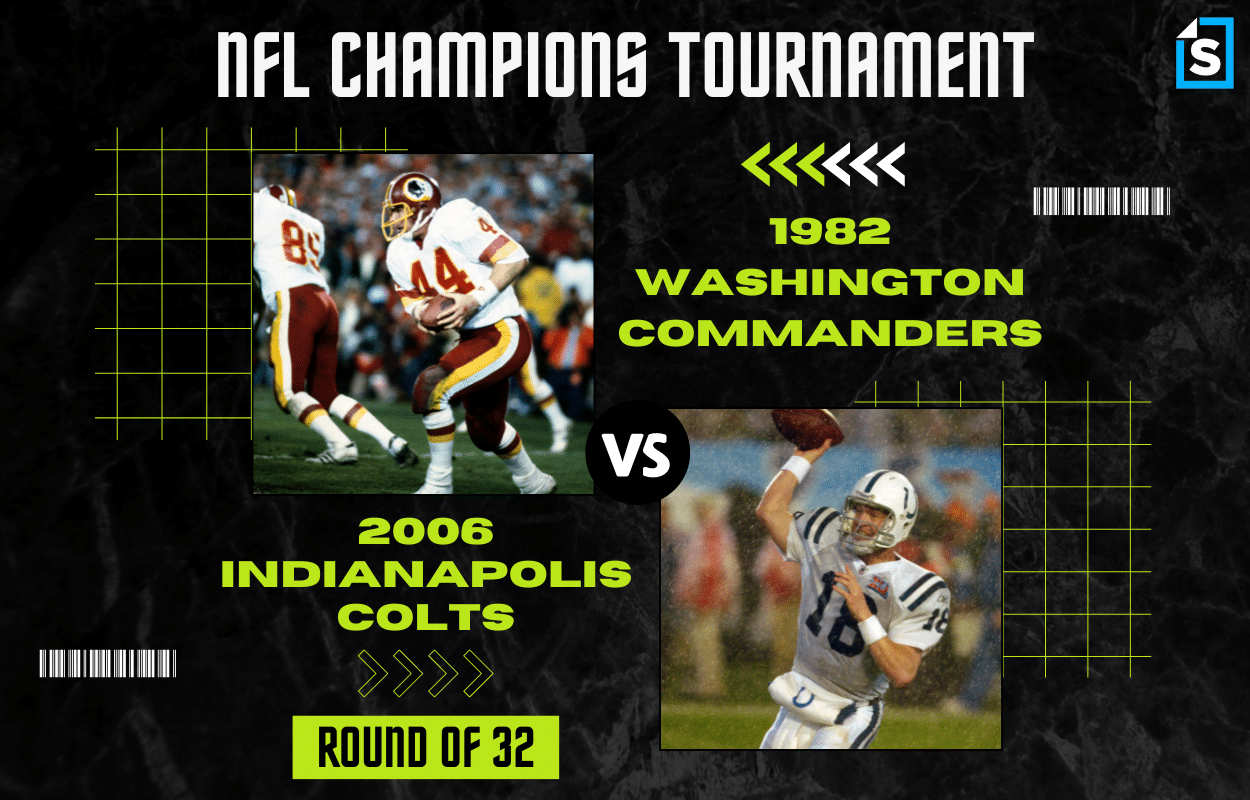
My guess is that some might be upset with the high seed of this Washington squad, given how the 1982 NFL season consisted of just nine regular-season games due to a 57-day players’ strike that began after Week 2.
But make no mistake about it. Coach of the Year Joe Gibbs’ group was good. And, come on, how do you not love a team whose placekicker won NFL MVP? No, seriously. Washington kicker Mark Moseley won NFL MVP. A unique season comes with unique happenings, right?
And on that note, as the regular season was shortened, the postseason was expanded to include 16 teams instead of the usual 10 that participated back then. Division records were disregarded, and the top eight teams from each conference were seeded by overall record.
Washington, who had the league’s top-ranked defense, went 8-1 to earn the top seed in the NFC, losing only to the Dallas Cowboys in Week 5.
The Commanders made easy work of their first two postseason opponents, easily beating the eighth-seeded Lions in the opening round, 31-7, and then knocking out the fourth-seeded Vikings in the second round, 21-7, to set up a revenge game in the NFC Championship against the second-seeded Cowboys.
Washington fell behind early, 3-0, but that was the only deficit of the day as quarterback Joe Theismann and running back John Riggins combined for 290 yards and three touchdowns the rest of the way en route to a 31-17 victory.
Gibbs & Co. faced a much tougher test in Super Bowl 17 against the Miami Dolphins, who’d gone 7-2 in the regular season to earn the No. 2 seed in the expanded AFC bracket. The Dolphins led 17-10 at halftime, but the aforementioned top-ranked Washington defense adjusted in the locker room and held Miami scoreless over the final 30 minutes while the offense put up 17 points on the way to a 27-17 victory.
With 166 yards and a touchdown, Riggins was named the game’s MVP. To prove the ’82 season was no fluke, Washington went 14-2 the following year and made a second straight Super Bowl appearance, losing to the Raiders.
The offseason ahead of the 2006 NFL campaign marked the end of an era for the Indianapolis Colts as four-time Pro Bowl running back Edgerrin James signed a lucrative contract with the Arizona Cardinals, thus breaking up the highly productive foursome of himself, Peyton Manning, Marvin Harrison, and Reggie Wayne, all of whom helped make the franchise one of the most successful of the 2000s.
But despite the loss, Manning led the most efficient offense in the league as rookie Joseph Addai made it much easier on Colts fans not to miss James, rushing for 1,081 yards and seven touchdowns while adding 325 yards and a score as a receiver.
Manning had another phenomenal season, throwing for 4,397 yards and 31 touchdowns, and Harrison and Wayne combined for 2,676 receiving yards and 21 TDs.
But while the offense clicked on all cylinders, the defense often struggled to stop opposing offenses. In fact, the Colts allowed 5.33 rushing yards per attempt, the worst total since the 1970 merger and the seventh-worst in NFL history.
But that ultimately didn’t matter. With the offense scoring 26.7 points per game, the Colts went 12-4 and earned the No. 3 seed in the AFC. Oddly enough, however, it was the defense that showed out in the first two rounds of the postseason, allowing just 14 total points in wins over the Chiefs and Ravens.
The offense took over in the AFC title game as Manning finally took down Tom Brady in a 38-34 win over the Patriots and Tony Dungy got a total team effort as the Colts bested the Chicago Bears by a score of 29-17 in Super Bowl 41.
| Team | 1982 Commanders | 2006 Colts |
|---|---|---|
| Record | 8-1 | 12-4 |
| Super Bowl | Def. Miami Dolphins 27-17 | Def. Chicago Bears 29-17 |
| SB MVP | John Riggins | Peyton Manning |
The ’06 Colts were able to upset an NFC East team in the Opening Round, so can they do it again?
Winner: 2006 Indianapolis Colts
Well, looks like Manning & Co. could do it again, as the ’06 Colts took three-quarters of the vote here, setting up a showdown in the Round of 16 with the ’94 Niners and knocking out fifth-seeded Washington, the highest seed to fall thus far.
(2) 1985 Chicago Bears vs. (34) 1993 Dallas Cowboys
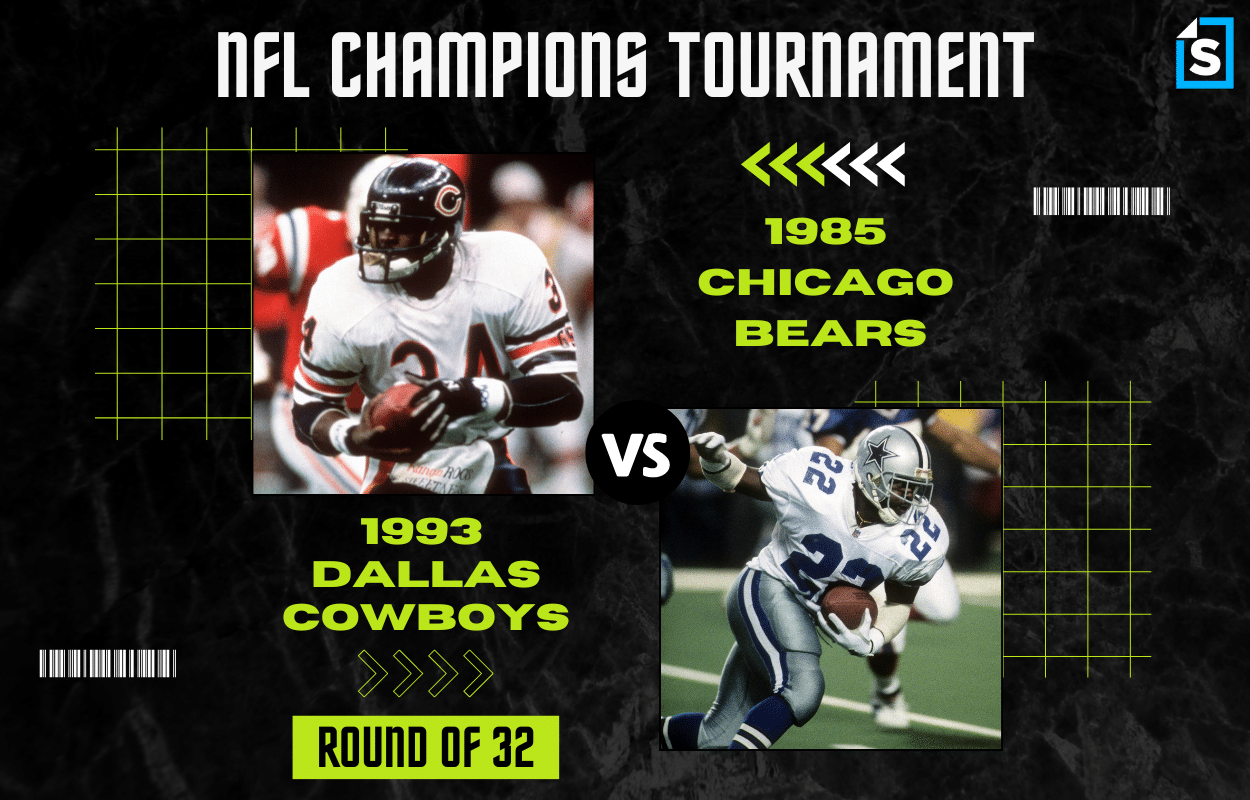
This week gives our first look at the second-seeded 1985 Chicago Bears, who many believe to be the greatest team in NFL history.
Mike Ditka & Co. were coming off the franchise’s best campaign in years, finishing 10-6 during the ’84 regular season and making it to the NFC title game, where they were embarrassed by the eventual Super Bowl champion San Francisco 49ers, 23-0.
Determined to dethrone the Niners, the Bears came out hot in ’85, winning their first 12 games before dropping a Week 13 Monday night matchup to the Miami Dolphins. After pitching two straight shutouts in wins over the Cowboys (44-0) and Falcons (36-0), Buddy Ryan’s vaunted “46” defense allowed a season-worst 38 points in the loss.
And Defensive Player of the Year Mike Singletary and his unit must have taken that personally, as Chicago allowed just 43 points the rest of the season — and that includes the playoffs. Overall, the Bears allowed just 12.4 points per game during the regular season to lead the NFL.
And the offense wasn’t too shabby, either. Behind a stellar season from Walter Payton, who totaled 2,034 yards from scrimmage (1,551 rushing, 483 receiving) and scored 11 touchdowns, Chicago ranked second in the league in scoring, averaging 28.5 points per game.
With their 15-1 record, the Bears easily took the top seed in the NFC and became the first team in history to record back-to-back shutouts in the postseason, defeating the fourth-seeded Giants in the Divisional Round, 21-0, and then knocking off the second-seeded LA Rams in the NFC title game, 24-0.
Chicago then made easy work of the New England Patriots in Super Bowl 20, taking a 46-10 victory, at the time the largest margin of victory in Super Bowl history.
The Dallas Cowboys were coming off a big Super Bowl win of their own entering the 1993 season, which didn’t look promising early on as Emmitt Smith sat out all of training camp as he wanted a new contract. The dispute carried over into the regular season, and after he missed the first two games, both of which the Cowboys lost, Jerry Jones gave in and made Smith the highest-paid running back in the NFL.
And Emmitt proved he was worth it by winning NFL MVP, totaling 1,900 yards from scrimmage (1,486 rushing, 414 receiving) and scoring 10 touchdowns in 14 games.
Upon Smith’s return, Dallas won seven straight games and finished 12-4 to take the No. 1 seed in the NFC. With Troy Aikman and Michael Irvin having stellar seasons of their own, the Cowboys’ offense ranked second in the league in scoring, averaging 23.5 points per game.
And the Dallas defense was stellar as well, allowing just 14.3 points per game, also good for second in the league. In total, the Cowboys sent 11 players to the Pro Bowl that year.
Jimmy Johnson’s group kicked off the postseason by defeating Brett Favre and the Green Bay Packers for the second time that season, taking a 27-17 victory to set up a second straight showdown with the San Francisco 49ers in the NFC Championship Game.
And as they’d done a year earlier, the Cowboys came out on top, scoring a season-high 38 points in a 17-point romp of their rivals. And also as they’d done a year earlier, Jimmy Johnson & Co. bested the Buffalo Bills in the Super Bowl, although it wasn’t the blowout we saw the first time — well, at least not as big of one anyway.
Buffalo actually led at halftime, 13-6, but the defense pitched a shutout in the second half as Dallas scored 24 unanswered points to take a 30-13 victory.
| Team | 1985 Bears | 1993 Cowboys |
|---|---|---|
| Record | 15-1 | 12-4 |
| Super Bowl | Def. New England Patriots 46-10 | Def. Buffalo Bills 30-13 |
| SB MVP | Richard Dent | Emmitt Smith |
I’ll be candid with you here. This is my favorite matchup of the entire tournament up to this point. For one, you’ve got arguably the greatest two running backs in NFL history squaring off in Walter Payton and Emmitt Smith. And those certainly aren’t the only two Hall of Famers in this game.
Both teams were incredible on both sides of the football. Both teams had phenomenal head coaches and coordinators. Trust me. I could keep going. But it’s time to decide which legendary squad is moving on.
Winner: 1985 Chicago Bears
It wasn’t as dominant of a win as the ’85 Bears were used to, but it was a win nonetheless as the Super Bowl Shufflers took 60% of the vote here to knock the ’93 Cowboys out of the tournament, setting up a revenge game of sorts in the Round of 16.
(15) 1973 Miami Dolphins vs. (18) 1970 Baltimore Colts
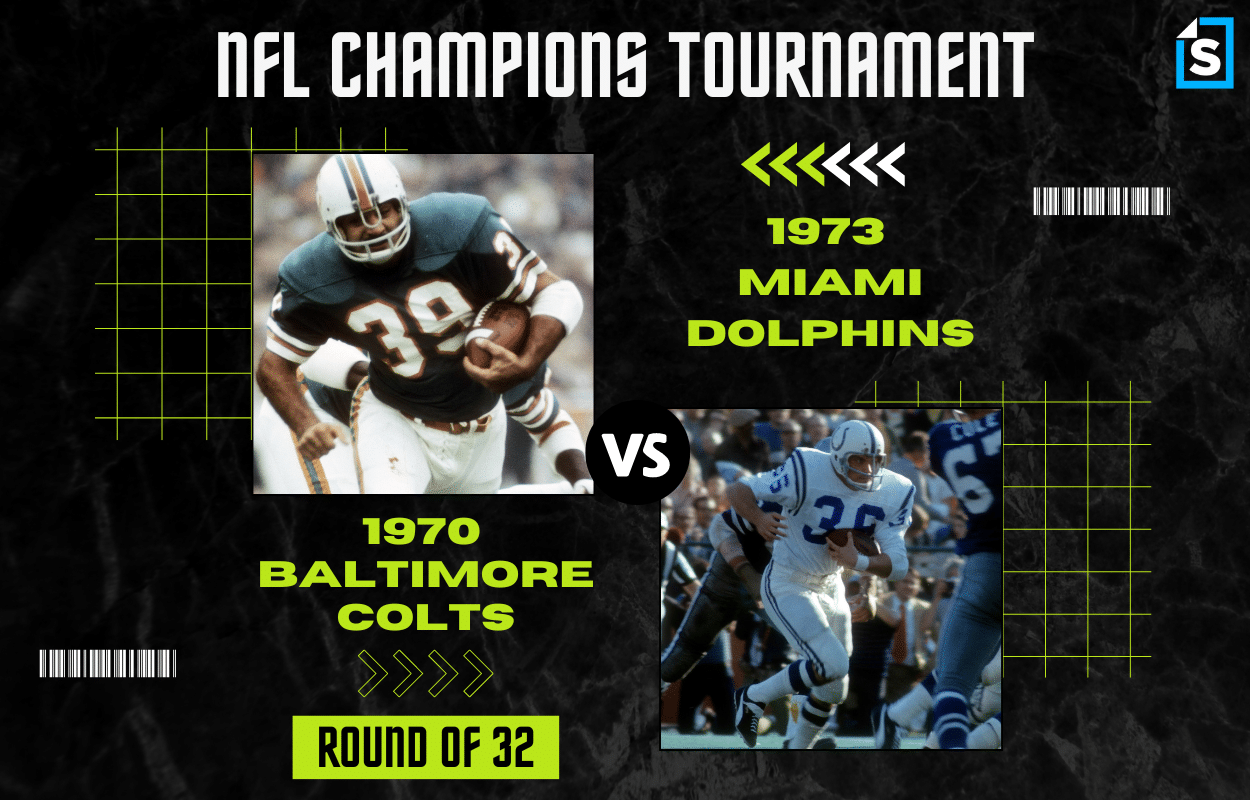
I said it during the Opening Round, and I’ll repeat it here. The 1973 Miami Dolphins rarely get the credit they deserve as one of the great teams in NFL history because of what the franchise had accomplished the previous year. I’d actually venture to guess that not everyone even realizes the Dolphins went back-to-back following that undefeated season in ’72.
The pressure of going undefeated again went away pretty early as Miami took a Week 2 loss to the Oakland Raiders. But Don Shula & Co. weren’t defeated again until Week 13, losing 16-3 to the Baltimore Colts, and finished the year with a 12-2 record.
And here’s what I’ll say about that. While the ’73 Dolphins lost twice, they played a much more challenging schedule than did the ’72 squad, which never faced a team that finished better than 8-6. Now, that’s not me saying the 1973 team was better. I’m just stating facts.
Another fact is that the ’73 Dolphins had one of the most outstanding defensive units of all time, a unit that allowed only 10.7 points per game. Only 11 teams in NFL history have allowed fewer points on average, only one of which won a Super Bowl, that being the 2000 Baltimore Ravens.
And the offense was plenty solid as well, averaging 24.5 points per game, good for fifth in the league.
Both units showcased their strengths in the postseason. In victories over the Cincinnati Bengals and Oakland Raiders in the AFC bracket, the Miami offense averaged 30.5 points while the defense allowed just 13.
The Dolphins then made easy work of the Minnesota Vikings in Super Bowl 8, taking a 24-7 victory.
Coming off a season in which they missed the playoffs and then an offseason in which they lost head coach Don Shula, who took his talents to South Beach, the Baltimore Colts faced an uphill battle to the Super Bowl in 1970, which was the first season following the finality of the NFL-AFL merger.
Truth be told, there was nothing overly extraordinary about this Colts team. Johnny Unitas, who was only a few years away from the end of his career, had a dreadful season and threw more interceptions (18) than touchdown passes (14) while connecting on just 51.7% of his targets. Can you imagine the firestorm he’d face on social media with those stats today?
And while the Baltimore defense was good with Pro Bowl talents like Bubba Smith, Jerry Logan, and Mike Curtis, it wasn’t any kind of all-time great unit.
Nevertheless, the Colts went 11-2-1 during the regular season and breezed through the AFC portion of the postseason bracket, winning their first two playoff games by an average of 13.5 points. Their Super Bowl win didn’t come as easy as they squeaked by the Dallas Cowboys, 16-13, in what is still one of the ugliest title games of all time.
It’s also still the only Super Bowl in history in which the MVP came from the losing team, as Dallas linebacker Chuck Howley took the honor with two interceptions in the losing effort. But I guess it’s difficult to find an MVP from a team that committed seven turnovers.
| Team | 1973 Dolphins | 1970 Colts |
|---|---|---|
| Record | 12-2 | 11-2-1 |
| Super Bowl | Def. Minnesota Vikings 24-7 | Def. Dallas Cowboys 16-13 |
| SB MVP | Larry Csonka | Chuck Howley (Cowboys) |
The Dolphins and Colts have each won two Super Bowl titles, and each has already gotten their other title-winning squad into the Round of 16. But only one can have both. So who’s it gonna be?
Winner: 1973 Miami Dolphins
This went as I expected, as the ’73 Dolphins tallied 100% of the vote here, a number I don’t think they’ll reach in the next round when they square off with the ’85 Bears.
(10) 2016 New England Patriots vs. (42) 1997 Denver Broncos
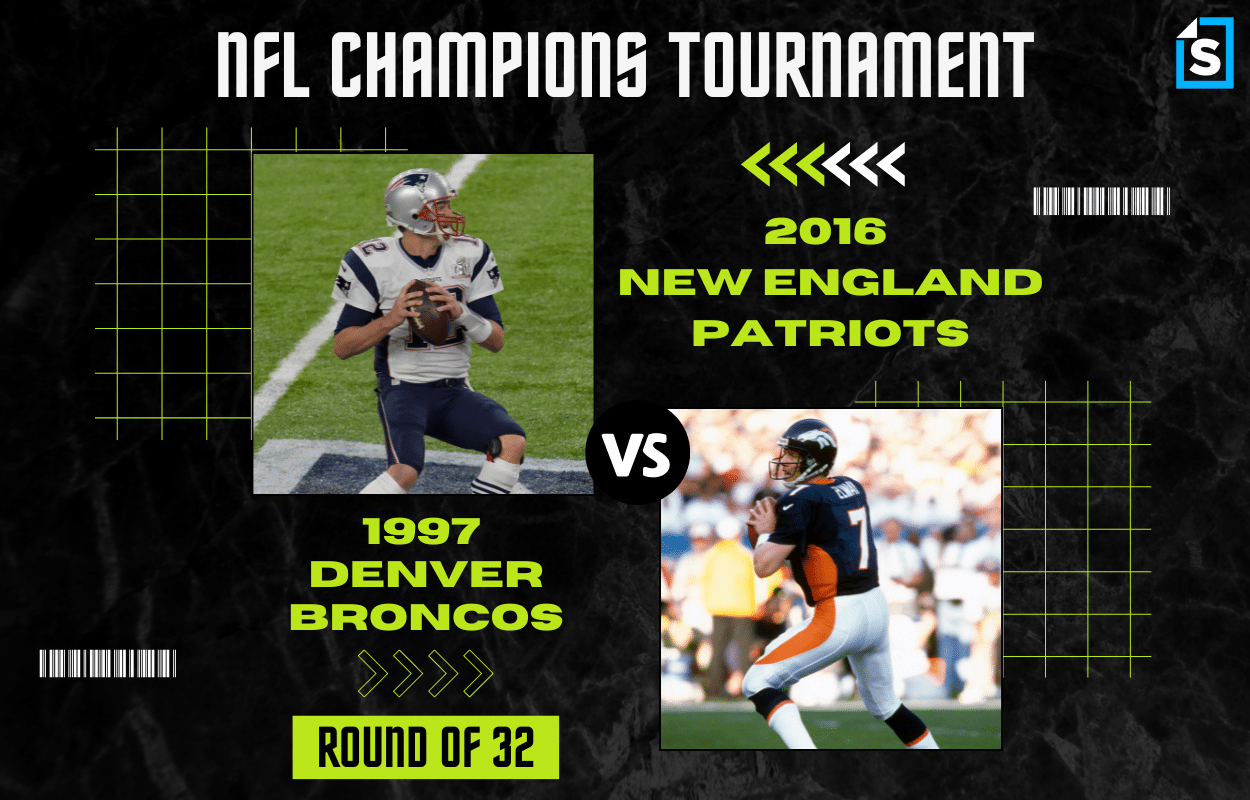
Of Tom Brady’s 20-plus seasons in the NFL, his 2016 campaign with the New England Patriots will undoubtedly go down as one of the most memorable.
But one of the reasons is because of how it began. If you recall, TB12 was forced to miss the Pats’ first four games as he was suspended due to his alleged role in the ridiculous Deflategate scandal. Brady initially appealed the suspension but eventually acquiesced. Despite his absence, Bill Belichick & Co. went 3-1 to start the year.
Undoubtedly playing with a bit of a chip on his shoulder, Brady was dominant from the get-go upon returning, throwing for 406 yards and three touchdowns in an easy win over the Cleveland Browns, earning him AFC Offensive Player of the Week honors. And with 1,319 yards and 12 touchdowns with zero interceptions in his first four starts, he took AFC Offensive Player of the Month for October.
Despite missing those first four games, Brady took second in the 2016 NFL MVP vote after completing 67.4% of his passes for 3,554 yards with 28 touchdowns and just two picks, setting an NFL record for the best touchdown-to-interception ratio in a single season. New England lost just once in his 12 starts, a Week 10 defeat at the hands of the Seattle Seahawks.
But that was obviously the only loss Brady would suffer that season. After breezing through the AFC Playoffs, it seemed as if he was on his way to a second loss as the Patriots got down 28-3 in Super Bowl 51 to the winner of the NFL MVP, Matt Ryan, and the Atlanta Falcons. But we all know how that turned out, don’t we?
Coming into the 1997 season, John Elway was 37 years old and hadn’t been to a Super Bowl since taking a 55-10 beating at the hands of the San Francisco 49ers following the ’89 campaign. And he hadn’t seen the AFC title game since losing to the Buffalo Bills after the ’91 season. So he was in grave danger of entering that category of being one of the best NFL quarterbacks of all time never to win a Super Bowl.
Elway and the Broncos gave themselves a decent shot in 1996, going 13-3 to earn the top seed in the AFC. But they were upset in their playoff opener by the fifth-seeded Jacksonville Jaguars.
And things didn’t look great as the ’97 season got rolling as Elway ruptured his right biceps tendon. He chose not to undergo surgery and started all 16 games for Denver that season, leading the Broncos to a 12-4 record and the fourth seed in the AFC. Of course, having Terrell Davis behind him certainly helped as the reigning Offensive Player of the Year and future NFL MVP rushed for a then-career-high 1,750 yards and a league-best 15 touchdowns.
And Elway was damn sure happy to have him in the postseason. While No. 7 accounted for just three touchdowns in the Broncos’ four playoff wins, Davis accounted for eight, three of them coming in Denver’s Super Bowl 32 win over the defending champion Green Bay Packers.
| Team | 2016 Patriots | 1997 Broncos |
|---|---|---|
| Record | 14-2 | 12-4 |
| Super Bowl | Def. Atlanta Falcons 34-28 | Def. Green Bay Packers 31-24 |
| SB MVP | Tom Brady | Terrell Davis |
So here we go, folks. Brady has lost both of his Round of 32 matchups to this point, while Elway lost his one battle as well. Which legendary QB takes another sack here?
Winner: 2016 New England Patriots
With all of his other Patriots teams out of this tourney, Tom Brady got his 2016 squad into the Round of 16 — but not by much. New England took just 53% of the vote here, but a win is a win, and that sets up a matchup with a familiar foe.
(7) 1986 New York Giants vs. (26) 1981 San Francisco 49ers
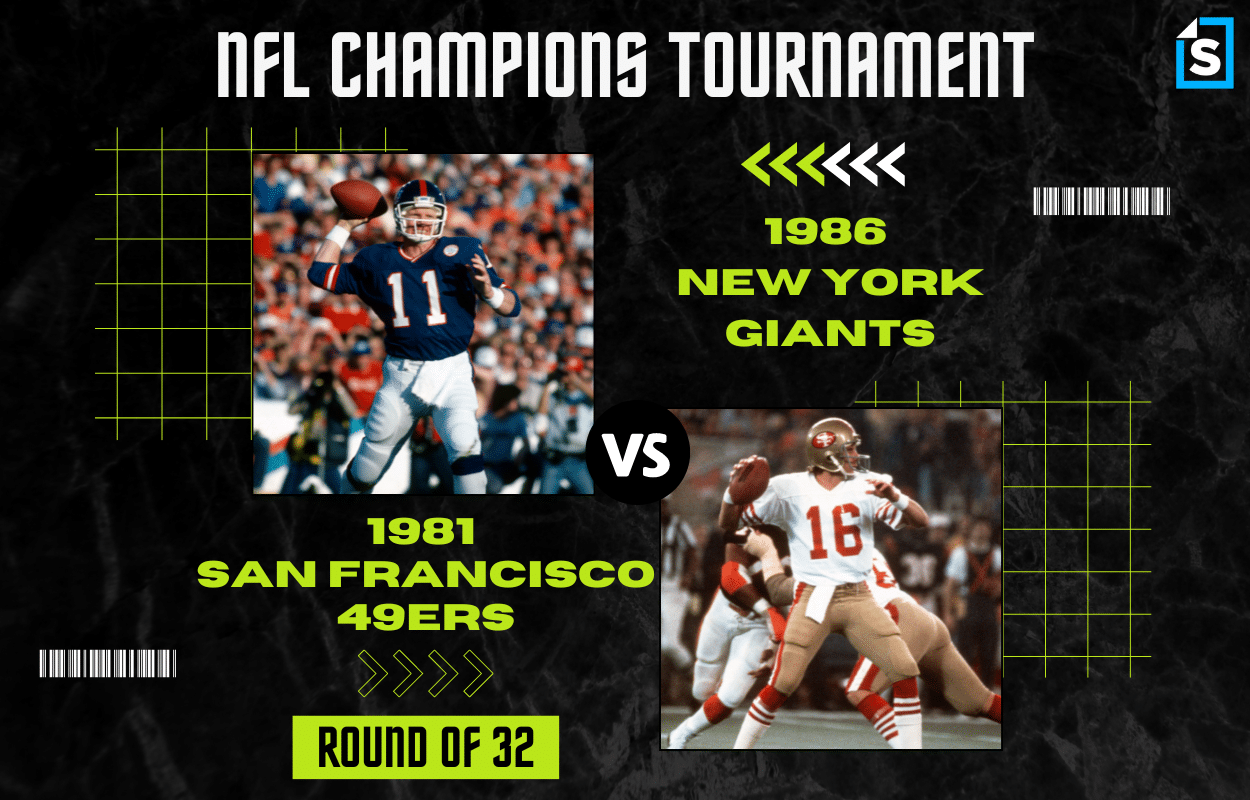
This Round of 32 matchup gives us our first look at the 1986 New York Giants. And when discussing that legendary squad, you can’t mention anyone else before mentioning Lawrence Taylor.
With 20.5 sacks, LT not only took Defensive Player of the Year honors for the third time, but he also became just the second defensive player in NFL history to win league MVP, beating out Rams running back Eric Dickerson and Dolphins quarterback Dan Marino.
The New York defense, which also included Pro Bowlers Harry Carson and Leonard Marshall, allowed just 14.8 points per game, good for second in the NFL behind only the defending Super Bowl champion Chicago Bears, who knocked the Giants out of the playoffs the previous season.
The Giants lost just two games during the ’86 season by a combined eight points and tied the Bears for the best record in the league. But as New York had the better conference record (11-1 to Chicago’s 10-2), Bill Parcells & Co. earned the top seed in the NFC.
The Giants were supposed to get a tough test in the Divisional Round against the San Francisco 49ers, but it proved to be no test at all. While only three-point favorites, New York hung an appropriate 49 points on San Francisco, six of which came from LT, who recorded a pick-six on Joe Montana in the second quarter on the same play Montana was knocked out of the game. The Niners scored just three points in the loss.
But that was three more than Washington scored in the NFC title game. After upsetting the Bears in the Divisional Round, the team now known as the Commanders couldn’t do a thing against Taylor & Co. in a 17-0 defeat.
The Giants capped off their dream season with a 39-20 win over John Elway and the Denver Broncos to give the franchise its first Super Bowl title. And who else got his first Super Bowl win that night? That would be Mr. Bill Belichick, who, of course, was the coordinator of that incredible defensive unit.
Coming into the 1981 NFL season, the San Francisco 49ers hadn’t been a threat to win a Super Bowl in nearly a decade. They hadn’t been to the playoffs since 1972 and hadn’t even had a winning record since 1976.
Bill Walsh was in just his third season as an NFL head coach but had gone just 8-24 in his first two years. So I think it’s fair to say that expectations weren’t overly high for the Niners in ’81. But as they say, that’s why you play the games.
It looked like more of the same early on, as San Francisco lost two of its first three. But riding the right arm of a third-year quarterback in his first full season as a starter — some guy named Joe Montana — and a rock-solid defense, the Niners reeled off seven straight wins.
And following a hiccup in Week 11 against the Cleveland Browns, which was still only a three-point loss, San Francisco didn’t lose again.
After closing out the regular season with five straight wins, Montana & Co. bested rookie Lawrence Taylor and the New York Giants in the Divisional Round before famously knocking off the Dallas Cowboys in the NFC title game, which will always be best remembered for the accidental hookup between Montana and Dwight Clark.
And in the first of four Super Bowl appearances over the next decade, the 49ers defeated the Cincinnati Bengals, who were led by QB Ken Anderson, the only man to receive more NFL MVP votes than Montana that year.
| Team | 1986 Giants | 1981 49ers |
|---|---|---|
| Record | 14-2 | 13-3 |
| Super Bowl | Def. Denver Broncos 39-20 | Def. Cincinnati Bengals 26-21 |
| SB MVP | Phil Simms | Joe Montana |
The Giants and 49ers met four times in the postseason in the ’80s, splitting those games, so I guess it’s fitting that they meet in this tournament to settle the score.
Winner: 1986 New York Giants
This was another close one, but the ’86 Giants took 60% of the vote here to get themselves into the Round of 16. So we now get Tom Brady taking on the New York Giants one more time.
(3) 1984 San Francisco 49ers vs. (35) 2015 Denver Broncos
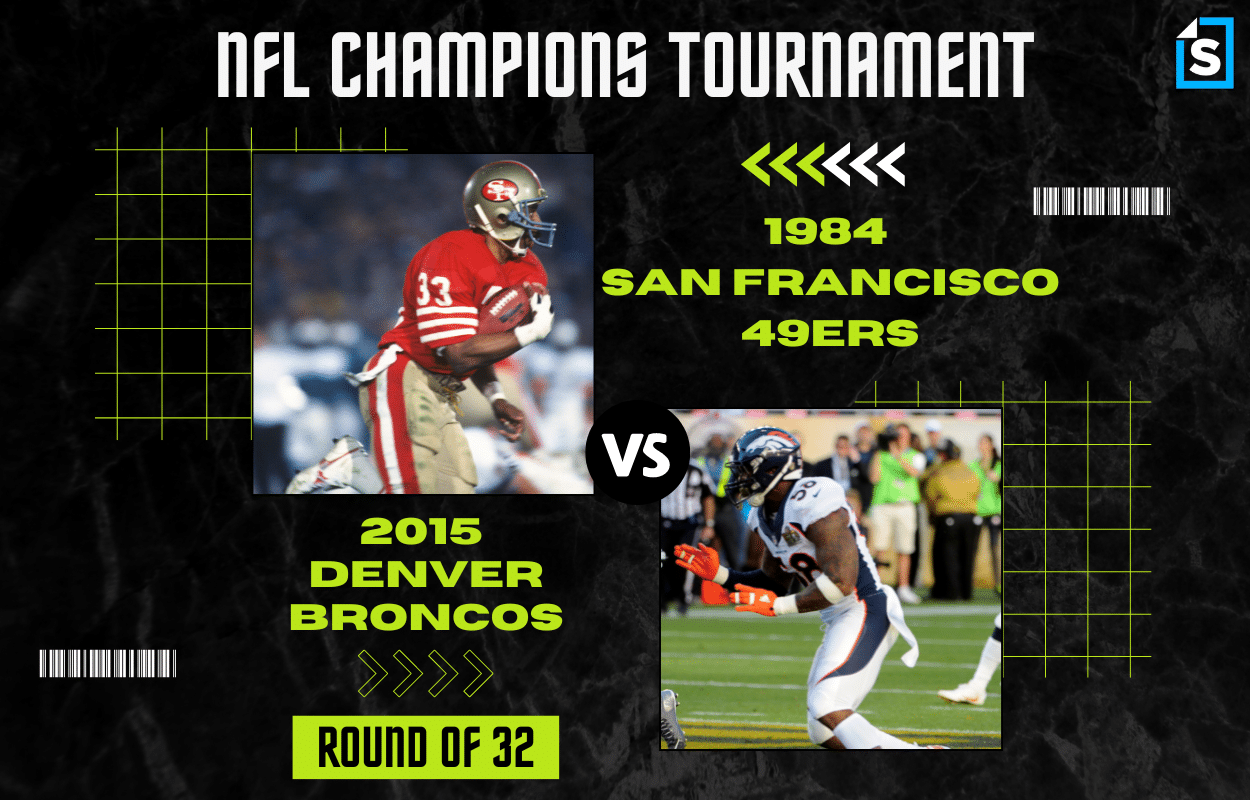
This Round of 32 matchup gives us our first look at the third-seeded 1984 San Francisco 49ers, the team most call Joe Montana’s best. And that’s certainly saying something, given that Jerry Rice was still in his final season at Mississippi Valley State that year.
Coming off a 10-6 season that ended with a loss in the NFC Championship Game to Washington, the ’84 Niners won their first six games before dropping a Week 7 matchup to the Pittsburgh Steelers, 20-17. They wouldn’t lose again.
With an offense that ranked second in the NFL in scoring, averaging 29.7 points per game, and a defense that allowed just 14.2 points per game, the fewest in the league, San Francisco won its final nine games by an average of 21.1 points to finish 15-1, which remains the best record in franchise history.
In the Divisional Round, the 49ers bested Lawrence Taylor and the fifth-seeded New York Giants, 21-10. And in the NFC Championship Game, San Francisco’s third in four years, the defense pitched a shutout against the Chicago Bears, holding Walter Payton to 92 yards in a 23-0 win.
The Niners were supposed to get a much tougher test in Super Bowl 19 against NFL MVP Dan Marino and the Miami Dolphins. But both the offensive and defensive units showcased their strengths in an easy victory.
Remember how I said the 49ers were the second-highest-scoring team in the league? Well, the only team they trailed was Miami, which averaged 32.1 points per game. But the San Francisco defense intercepted Marino twice and held the ‘Fins to 16 points.
The offense, meanwhile, put up 38 as Montana completed 24 of 35 passes for 331 yards with three touchdowns to take Super Bowl MVP honors for the second time.
The 2015 Denver Broncos certainly weren’t as well-balanced of a football team. As discussed in the breakdown of their Opening Round matchup with the ’68 Jets, the Denver offense wasn’t spectacular and averaged just 22.2 points per game, good for 19th in the NFL.
Wade Phillips’ defensive unit, however, was quite spectacular. While Von Miller & Co. ranked fourth in points allowed, giving up 18.5 per game, the Denver defense gave up the fewest total yards, the fewest passing yards, the fewest yards per rushing attempt, and led the league in sacks.
Four Broncos defenders were named to the Pro Bowl: Miller, fellow linebacker DeMarcus Ware, and cornerbacks Chris Harris Jr. and Aqib Talib. Miller and Harris were also All-Pro selections.
Despite the imbalance, the Broncos went 12-4 to take the top seed in the AFC. In the Divisional Round, they squared off with the Pittsburgh Steelers and Ben Roethlisberger, who’d thrown 21 touchdowns during the regular season. But the Denver defense kept him out of the end zone in a 23-16 win.
In the AFC title game, Denver squared off with the New England Patriots and Tom Brady, who’d thrown just seven interceptions all year. But the Broncos picked him off twice in a 20-18 victory.
And in Super Bowl 50, facing the Carolina Panthers, who had the highest-scoring offense in the league in 2015 at 31.3 points per game, the Denver D held Cam Newton & Co. to just 10 points, which earned Miller MVP honors.
| Team | 1984 49ers | 2015 Broncos |
|---|---|---|
| Record | 15-1 | 12-4 |
| Super Bowl | Def. Miami Dolphins 38-16 | Def. Carolina Panthers 24-10 |
| SB MVP | Joe Montana | Von Miller |
So what do you think? With a lackluster offense but a dynamite defense, could the 2015 Denver Broncos actually compete with a truly complete team like the 1984 San Francisco 49ers? My vote says no, but that’s where you come in.
Winner: 1984 San Francisco 49ers
Well, I apparently wasn’t the only one who thought the ’84 Niners deserved to move on here, as every single person who voted felt the same. So we now get a battle between the two winningest quarterbacks in Super Bowl history in the Round of 16.
(14) 1966 Green Bay Packers vs. (46) 2020 Tampa Bay Buccaneers
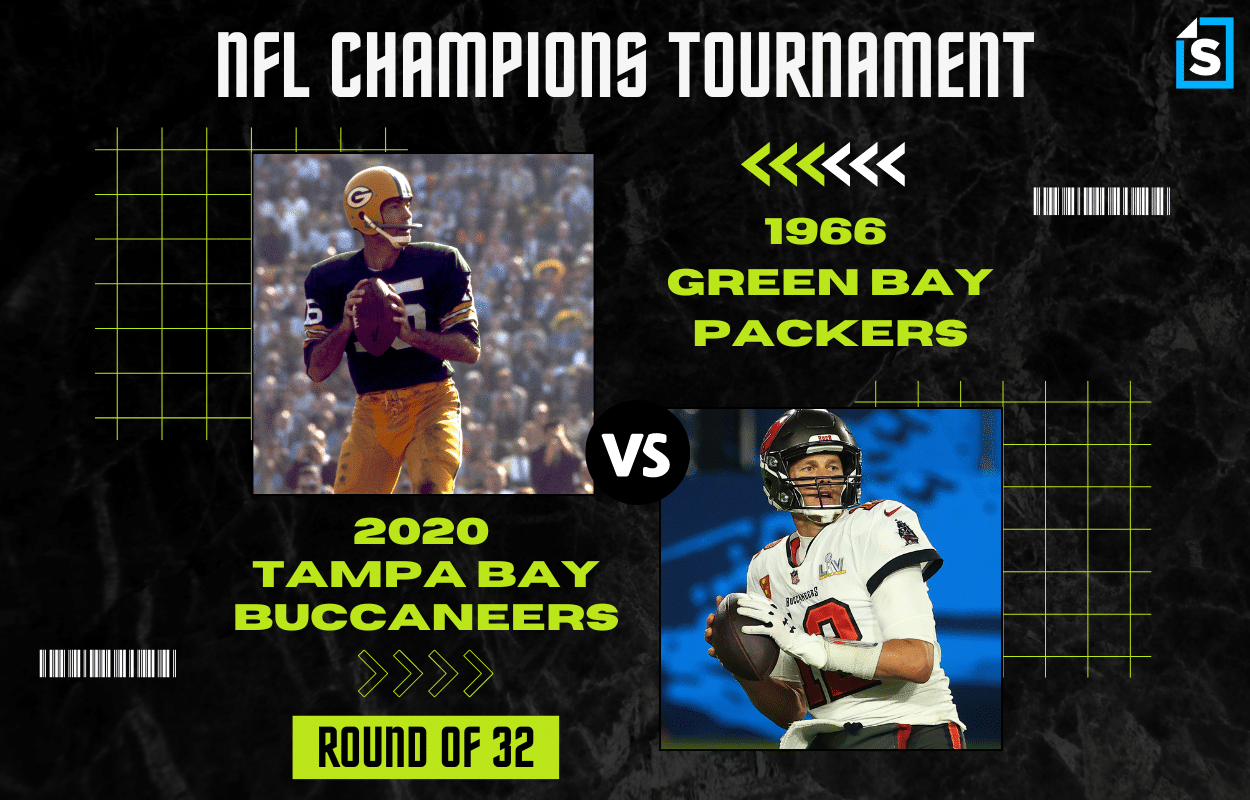
While today’s NFL is more of a passing league, that wasn’t the case back in the day, which makes the 1966 Green Bay Packers, the first-ever Super Bowl winner, one of the most intriguing teams of all time.
What some may not know about that historic team is that it didn’t feature a strong rushing attack. Of 15 NFL teams, the Packers ranked eighth in total rushing yards with 1,673 and tied for the second-worst mark in rushing yards per attempt at just 3.5.
Thankfully, Vince Lombardi got a strong season (for that era, anyway) from quarterback Bart Starr, who won his lone NFL MVP award by completing a league-high 62.2% of his passes for 2,257 yards. And while he only ranked seventh in the league in touchdown passes with 14, Starr threw just three interceptions, giving him one of the best touchdown-to-interception ratios of all time at 4.7:1.
Of course, Lombardi also had to be thankful for a defense that allowed just 11.6 points per game, the fewest in the NFL.
Green Bay lost only twice that season and those two defeats were by a combined four points. The first was a 21-20 loss to the San Francisco 49ers in Week 5, and the second was a 20-17 defeat and the hands of the Minnesota Vikings in Week 9. The Packers avenged both losses after their bye week and ran the table the rest of the way.
The Green Bay defense allowed an uncharacteristic 27 points in the NFL title game to the Dallas Cowboys, but the offense picked up the slack by scoring 34 behind 304 yards and four touchdowns from Starr. And both units showed out in the first Super Bowl (then called the AFL-NFL World Championship Game) as the Packers decimated the AFL champion Kansas City Chiefs, 35-10.
If I told you the 2020 Tampa Bay Buccaneers were the first team to win a Super Bowl with just one player making the Pro Bowl since the 2007 New York Giants, you’d probably guess it was Tom Brady, right?
After all, in his first season in a new uniform after two decades with the New England Patriots, TB12 completed 65.7% of his passes for 4,633 yards with 40 touchdowns and 12 interceptions. But that’s not the answer.
So then it had to be Mike Evans and his 70 catches for 1,006 yards and 13 touchdowns, right? Wrong again. Rob Gronkowski? Nope. Chris Godwin? Nope.
Okay, if I gave you a hint and said it was a defensive player, you’d likely go right to Ndamukong Suh, correct? Or perhaps Devin White? Wrong and wrong.
The correct answer is actually Jason Pierre-Paul, who led the Bucs in sacks with 9.5 and was obviously a huge part of a defensive unit that often doesn’t get as much credit as it deserves for Tampa Bay’s success that year.
While the Buccaneers didn’t lead the league in any major defensive category, Todd Bowles’ bunch stepped up when it mattered most. While Brady gets most of the credit for leading Tampa to an 11-5 regular-season record and three consecutive road wins on the NFC side of the postseason bracket, the defense held Patrick Mahomes and the Kansas City Chiefs, who’d averaged close to 30 points per game, to just nine points in Super Bowl 55.
| Team | 1966 Packers | 2020 Buccaneers |
|---|---|---|
| Record | 12-2 | 11-5 |
| Super Bowl | Def. Kansas City Chiefs 35-10 | Def. Kansas City Chiefs 31-9 |
| SB MVP | Bart Starr | Tom Brady |
So we’ve got the first quarterback to win a Super Bowl, the quarterback with the most Super Bowl wins, and a pair of solid defensive units going at it here. Who’s it gonna be?
Winner: 2020 Tampa Bay Buccaneers
This was close, but Tom Brady got a second team into the Round of 16 as the 2020 Bucs took 53% of the vote here. Up next for this version of TB12? A date with Joe Montana.
(11) 1978 Pittsburgh Steelers vs. (22) 1996 Green Bay Packers
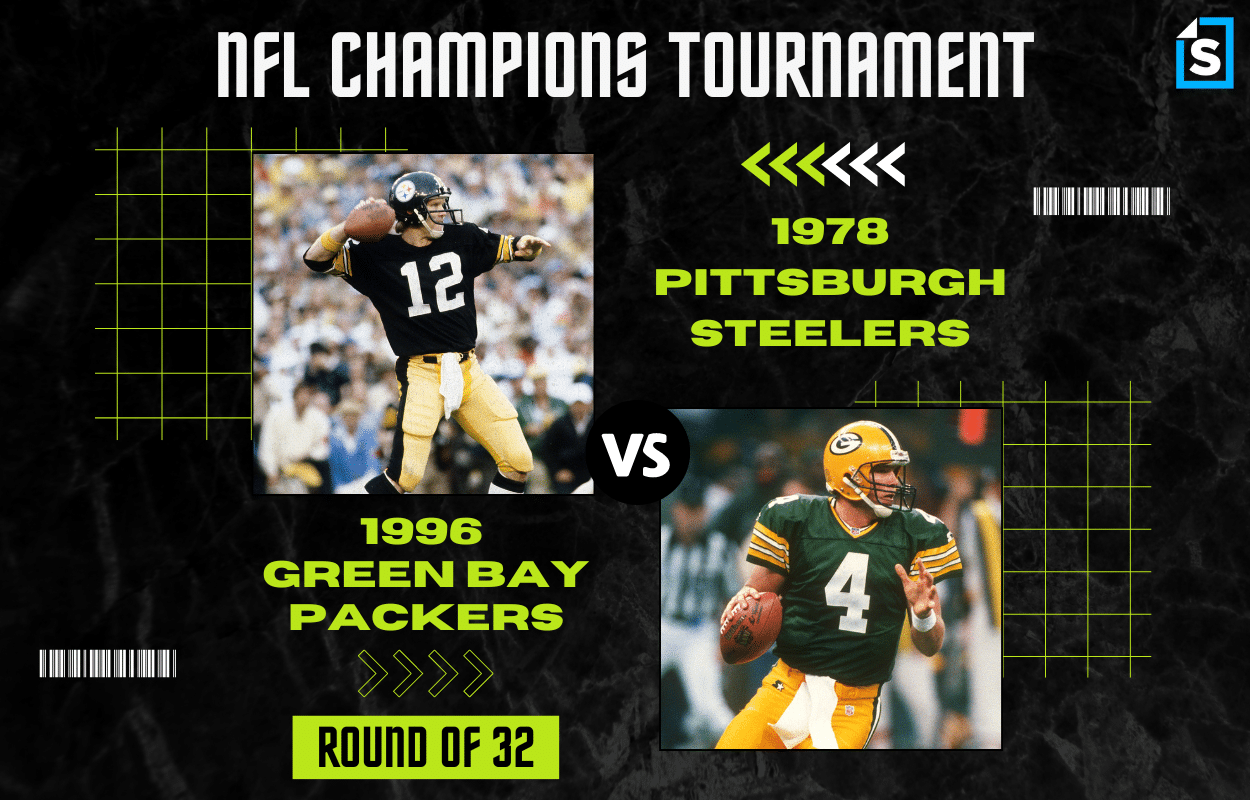
Seen by many as the best team of the 1970’s Pittsburgh dynasty, the 1978 edition of the Steelers got the franchise back in the Super Bowl following a two-year absence with a dynamite 14-2 campaign, at the time the best record in franchise history.
By today’s standards, Terry Bradshaw had what most would call an average season for an NFL quarterback, completing just 56.3% of his passes for 2,915 yards with a league-leading 28 touchdowns and 20 interceptions. But in 1978, that was good enough to win him his lone NFL MVP trophy as he narrowly beat out legendary Houston Oilers running back Earl Campbell, who easily won NFL Rookie Offensive Rookie of the Year.
Bradshaw led an offense that averaged 22.3 points per game, good for fifth in the NFL, but he certainly wasn’t the only superstar on that side of the football. The late, great Franco Harris, who sadly passed away the day this was written, had his fifth straight 1,000-yard season, rushing for 1,082 yards and eight touchdowns.
And the legendary receiving duo of Lynn Swann and John Stallworth combined for 102 catches for 1,678 yards and 20 touchdowns.
But while the offense was strong, the Steelers’ defense was even stronger, allowing a league-low 12.2 points per game. Pittsburgh had two players in the top four of the Defensive Player of the Year vote, with linebackers Jack Ham and Jack Lambert finishing second and fourth, respectively.
As mentioned, the ’78 Steelers went 14-2 in the first 16-game NFL season, earning the No. 1 seed in the AFC. They coasted through their first two playoff games, beating the Broncos and Oilers by a combined score of 67-15. Pittsburgh’s only real test came in Super Bowl 13, where they squeaked by the Dallas Cowboys, 35-31.
Terry Bradshaw isn’t the only NFL MVP-winning quarterback in this matchup, as Green Bay Packers signal-caller Brett Favre won the award for a second straight season in 1996, completing 59.9% of his passes for 3,899 yards with a league-high 39 touchdowns against 13 interceptions.
While the ’96 Packers didn’t have the star power the Steelers had on offense, they had a solid group of players to contribute to the NFL’s highest-scoring team. Edgar Bennett and Dorsey Levens rushed for a combined 1,465 yards and seven touchdowns, while wideouts Antonio Freeman and Don Beebe and tight ends Keith Jackson and Mark Chmura combined for 163 receptions for 2,507 yards and 23 TDs.
And the defense wasn’t too shabby, either. Like the ’78 Steelers, the ’96 Packers allowed the fewest points in the league, giving up just 13.1 per game. Having guys like Reggie White and LeRoy Butler certainly helps on that front. This Green Bay team was the first since the undefeated ’72 Dolphins to score the most points while giving up the fewest.
After going 13-3 in the regular season, earning them the No. 1 seed in the NFC, the Packers, like Pittsburgh, breezed through the first two rounds of the playoffs, beating the 49ers and Panthers by a combined score of 65-27.
But unlike the Steelers, Green Bay didn’t have much trouble in the Super Bowl. Behind a 246-yard, two-touchdown performance from Favre and 154 return yards and a touchdown from game MVP Desmond Howard, the Packers took an easy 35-21 victory over the New England Patriots.
| Team | 1978 Steelers | 1996 Packers |
|---|---|---|
| Record | 14-2 | 13-3 |
| Super Bowl | Def. Dallas Cowboys 35-31 | Def. New England Patriots 35-21 |
| SB MVP | Terry Bradshaw | Desmond Howard |
Great offenses. Great defenses. Hall of Famers galore. And two of the most historic franchises in NFL history. So who’s going home?
Winner: 1978 Pittsburgh Steelers
The ’78 Steelers took 60% of the vote here, knocking the Packers completely out of the tournament. Pittsburgh, on the other hand, put three of its 1970s squads into the Round of 16.
(6) 1989 San Francisco 49ers vs. (38) 2019 Kansas City Chiefs
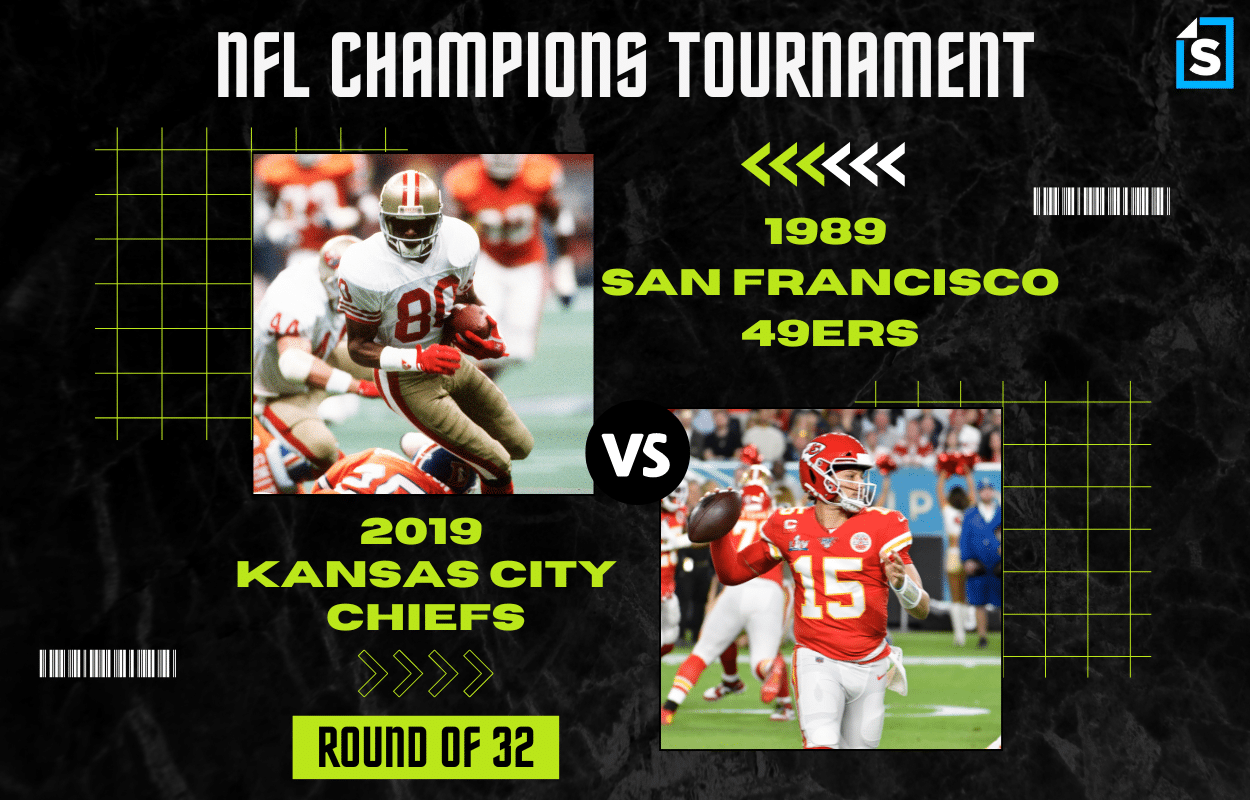
Our final Round of 32 matchup gives us our first look at the sixth-seeded 1989 San Francisco 49ers.
Coming off the franchise’s third Super Bowl win of the decade, the ’89 Niners had a three-game winning streak, a six-game winning streak, and a five-game winning streak to finish the season with a 14-2 record.
And those two losses were only by a combined five points. They lost a 13-12 heartbreaker to the rival Rams in Week 4 and then took a 21-17 defeat in Week 11 at the hands of the Green Bay Packers. On the flip side of things, 10 of their 14 wins were of the double-digit variety.
The San Francisco offense was essentially unstoppable, averaging a league-best 27.6 points per game. After four previous finishes in the top six of the NFL MVP voting, Joe Montana finally won one. And the vote wasn’t even close, nor should it have been.
In one of the best seasons of his entire career, Montana completed a league-high 70.2% of his passes for 3,521 yards with 26 touchdowns against only eight interceptions and earned what, at the time, was the highest passer rating in NFL history (112.4).
And we certainly can’t forget about the season Jerry Rice put together. Earning a fourth consecutive trip to the Pro Bowl and a fourth straight First-Team All-Pro selection, Rice caught 82 passes and led the NFL in receiving yards (1,483) and receiving touchdowns (17).
And it’s not as if the Niners didn’t have a running game, as Roger Craig rushed for 1,054 yards and six touchdowns.
But San Francisco wasn’t all offense. The 49ers’ defense, led by the likes of Ronnie Lott and Charles Haley, gave up the third-fewest points in the league, allowing just 15.8 per game.
As mentioned, the Niners finished with a 14-2 record, earning them the top seed in the NFC. And while their regular season was great, their postseason was absolutely phenomenal. In the Divisional Round, they pounded the Vikings, 41-13. In the NFC title game, they got some revenge on the Rams, beating them 30-13.
But San Francisco saved its best performance for last. What was supposed to be a Super Bowl for the ages turned into the most lopsided Super Bowl of all time as the 49ers crushed John Elway and the Denver Broncos, 55-10.
Coming into the 2019 season, it had been 50 years since the Kansas City Chiefs had won a Super Bowl. And in those five decades, the Chiefs had only gotten as far as the AFC Championship Game. And they only did that twice.
There was the 30-13 loss to the Buffalo Bills following the 1993 campaign. And then there was the heartbreaking overtime loss to the New England Patriots following the 2018 season, a game in which NFL MVP Patrick Mahomes didn’t even touch the ball in the extra frame.
While Mahomes didn’t have the MVP-caliber season he’d had the previous year, he was still pretty damn good in 2019, completing 65.9% of his passes for 4,031 yards with 26 touchdowns against just five interceptions.
But despite Mahomes’ solid play, the Chiefs didn’t look overly dominant all season as the ’89 Niners did. While they started the year winning four straight, they lost four of their next six, three of those losses coming in the friendly confines of Arrowhead Stadium.
But following their Week 10 loss to the Tennessee Titans, the Chiefs didn’t lose again. They won their final six regular-season games by an average of 16.3 points and finished with a 12-4 record, good enough for the No. 2 seed in the AFC.
After averaging 28.2 points per game in the regular season, good for fifth in the league, Kansas City exploded in the postseason, averaging 43 points in victories over the Texans and Titans. What makes that stat even more impressive is the fact that in the second quarter of their playoff opener against Houston, the Chiefs trailed 24-0.
Mahomes & Co. scored another 31 in an 11-point victory over the San Francisco 49ers in Super Bowl 54 to finally end the franchise’s half-century-long championship drought.
| Team | 1989 49ers | 2019 Chiefs |
|---|---|---|
| Record | 14-2 | 12-4 |
| Super Bowl | Def. Denver Broncos 55-10 | Def. San Francisco 49ers 31-20 |
| SB MVP | Joe Montana | Patrick Mahomes |
So we’ve got Joe Montana facing the team for which he played after the 49ers and Patrick Mahomes facing the same franchise he beat to win his first Super Bowl. It’s almost sad that someone has to go, but that’s the way it goes. So who’s it gonna be?
Winner: 1989 San Francisco 49ers
The ’89 Niners are moving on after taking 71.4% of the vote to knock the Chiefs out of the tournament. With the win, San Francisco joins Pittsburgh as the only franchises to put three teams in the Round of 16. Up next for this specific 49ers team is a date with the ’78 Steelers.
Super Bowl Tournament Round of 16
Before we get into the Round of 16, let’s do a quick recap of the Round of 32, which gave us our first look at the top eight seeds. Six of those eight advanced to the Round of 16, with only the fifth-seeded 1982 Commanders and the eighth-seeded 1998 Broncos getting knocked out.
Of the 16 games in the round, 11 were won by the higher seed. Here’s how the bracket played out.
- (1) 1972 Miami Dolphins def. (32) 2000 Baltimore Ravens
- (17) 1975 Pittsburgh Steelers def. (49) 2018 New England Patriots
- (41) 1974 Pittsburgh Steelers def. (9) 1991 Washington Commanders
- (25) 1999 St. Louis Rams def. (8) 1998 Denver Broncos
- (4) 1976 Oakland Raiders def. (36) 1979 Pittsburgh Steelers
- (20) 1992 Dallas Cowboys def. (13) 2003 New England Patriots
- (21) 1994 San Francisco 49ers def. (53) 1988 San Francisco 49ers
- (37) 2006 Indianapolis Colts def. (5) 1982 Washington Commanders
- (2) 1985 Chicago Bears def. (34) 1993 Dallas Cowboys
- (15) 1973 Miami Dolphins def. (18) 1970 Baltimore Colts
- (10) 2016 New England Patriots def. (42) 1997 Denver Broncos
- (7) 1986 New York Giants def. (26) 1981 San Francisco 49ers
- (3) 1984 San Francisco 49ers def. (35) 2015 Denver Broncos
- (46) 2020 Tampa Bay Buccaneers def. (14) 1966 Green Bay Packers
- (11) 1978 Pittsburgh Steelers def. (22) 1996 Green Bay Packers
- (6) 1989 San Francisco 49ers def. (38) 2019 Kansas City Chiefs
If you’re looking for the tale of the tape on any of the above matchups, I again invite you to keep scrolling down to the Round of 32 section of the tourney.
And without further ado, let’s keep it going with the Round of 16.
(1) 1972 Miami Dolphins vs. (17) 1975 Pittsburgh Steelers
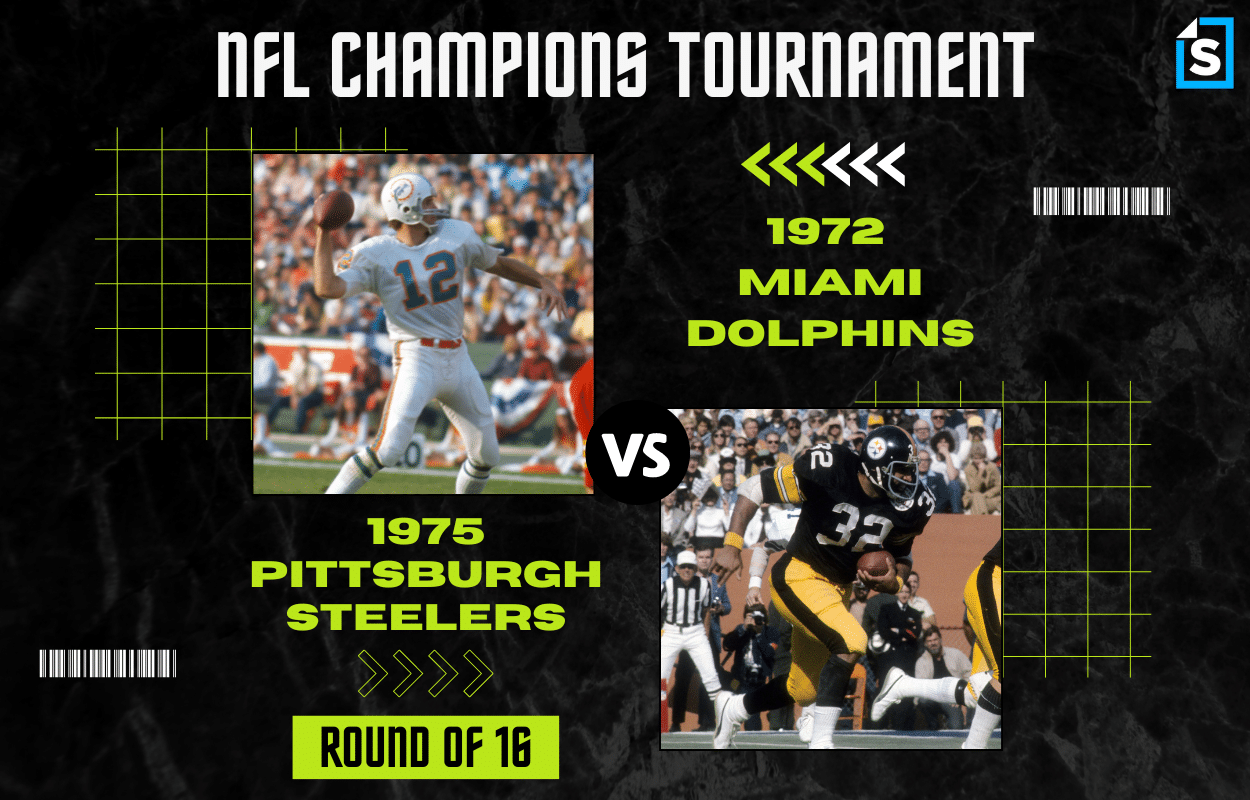
Everyone knows the 1972 Miami Dolphins are still the only undefeated Super Bowl champion of all time. But what some may not realize is that the 1972 season was only the seventh in the history of the franchise.
Think about that for a second. That would’ve been like the Houston Texans going undefeated and winning the Super Bowl in 2008.
After four dreadful years in the AFL, where they won just 15 games in four seasons, the Dolphins’ fortunes changed in their first season in the NFL in 1970, which was also the first year Don Shula manned the sideline in South Beach.
Miami made the postseason for the first time that year following a 10-4 season and then made its first Super Bowl appearance the following year after a second straight 10-win campaign, losing to the Dallas Cowboys.
So by the time 1972 rolled around, the Dolphins were ready to take things to the next level. But nobody could have expected what they accomplished.
Despite starting quarterback Bob Griese breaking his ankle in Week 5, the Miami offense scored the most points in the league, averaging 27.5 per game, as Earl Morrall stepped in beautifully and won Comeback Player of the Year. Of course, it helps to have a pair of 1,000-yard rushers in Larry Csonka and Mercury Morris.
And the Dolphins’ defense was just as good, allowing a league-low 12.2 points per game. Of the Dolphins’ 14 regular-season victories, 11 were of the double-digit variety, the biggest being a 52-0 shellacking over the New England Patriots in Week 9.
The postseason, however, was another story. Miami was down in the fourth quarter to the Cleveland Browns but escaped with a 20-14 victory in the Divisional Round. In the AFC title game, the Dolphins again fell behind but took a 21-17 victory over the Pittsburgh Steelers. Their biggest win of the postseason was in the Super Bowl, where they bested Washington, 14-7.
Much has been made about Miami’s weak schedule that year, but that doesn’t diminish what the Dolphins did.
Unlike Miami, the Pittsburgh Steelers had nearly four decades of history prior to the merger. But similar to the Dolphins, the franchise’s fortunes changed during the 1970s, although not quite as quickly. Founded in 1933, the Steelers didn’t win their first playoff game until 1972 on Franco Harris’ famous Immaculate Reception.
Two years later, Pittsburgh won its first Super Bowl (more on that team in the next game), and a second came with this 1975 squad that went 12-2, at the time the best record in franchise history.
Of the Steelers’ dozen victories that season, nine were of the double-digit variety, and six were by 21 points or more. Pittsburgh’s +211 point differential remains the largest in franchise history to this very day.
The Steelers’ offense, led by the Pro Bowl trio of Terry Bradshaw, Franco Harris, and Lynn Swann, scored 373 points (26.6 per game), the most of any Pittsburgh team until the 2010 season.
And the defense, which sent a ridiculous eight players to the Pro Bowl, including NFL Defensive Player of the Year Mel Blount, posted the franchise’s best numbers in nearly three decades and allowed just 11.6 points per game.
After an easy 28-10 win over the Colts in the Divisional Round, the Steelers got a tough test from the rival Raiders in the AFC title game but pulled out a 16-10 win by scoring 13 fourth-quarter points.
And they got an even tougher test in the Super Bowl against the Dallas Cowboys, again needing a big fourth quarter (they scored 14 in the final frame this time) to earn a 21-17 victory. In just a decade of Super Bowl history, Pittsburgh became the third franchise to win back-to-back titles, joining the Green Bay Packers and, of course, the Miami Dolphins.
| Team | 1972 Dolphins | 1975 Steelers |
|---|---|---|
| Record | 14-0 | 12-2 |
| Super Bowl | Def. Washington Commanders 14-7 | Def. Dallas Cowboys 21-17 |
| SB MVP | Jake Scott | Lynn Swann |
In four years, just two teams won the Super Bowl, a stretch bookended by the 1972 Miami Dolphins and the 1975 Pittsburgh Steelers. So who’s going home, folks?
Winner: 1972 Miami Dolphins
The ’72 Dolphins remain undefeated and did so in convincing fashion, taking 100% of the vote to move to the next round.
(25) 1999 St. Louis Rams vs. (41) 1974 Pittsburgh Steelers
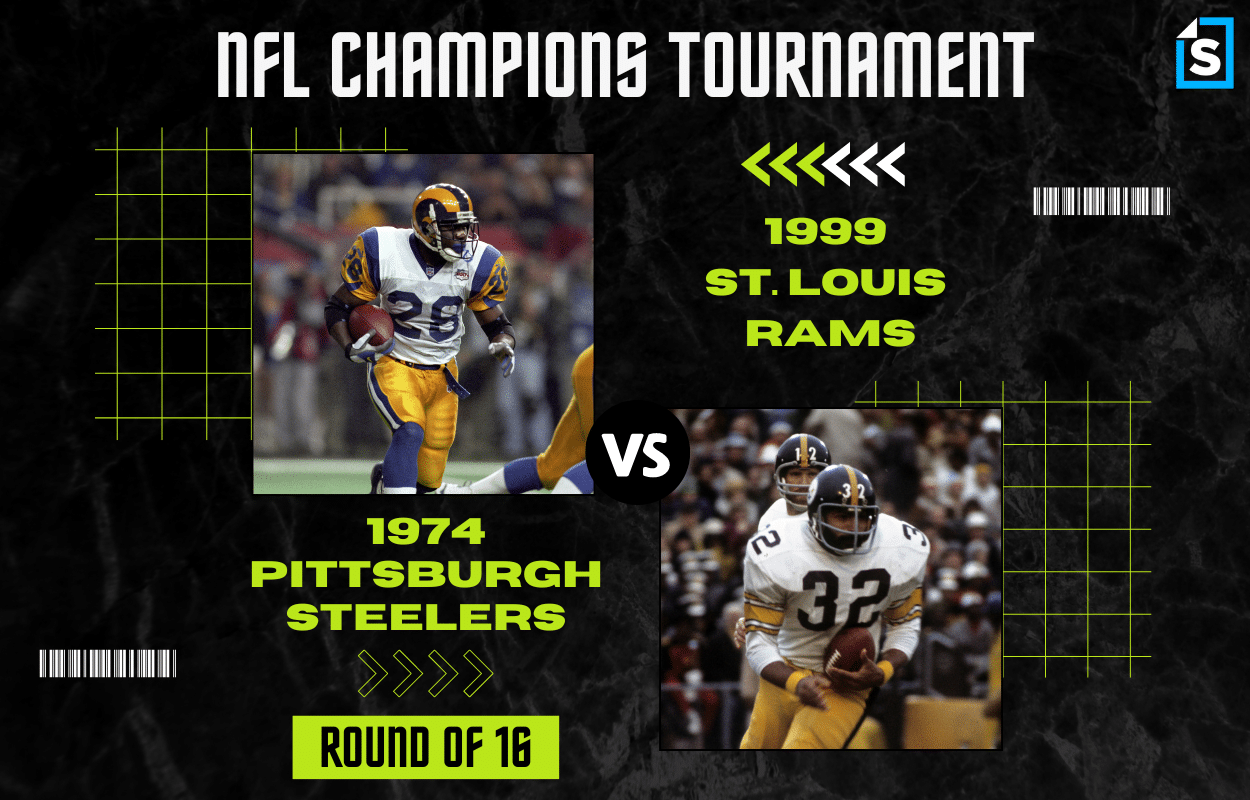
When discussing the 1999 St. Louis Rams, most of the conversation typically centers around the offense. And there’s certainly a reason for that, as “The Greatest Show on Turf” was one of the most dangerous and prolific units in NFL history, averaging 400.8 yards and 32.9 points per game. They’re one of just five teams in NFL history to score at least 30 points in 12 games.
Surprise signal-caller Kurt Warner, who was forced into action after a preseason injury to Trent Green, had attempted just 11 NFL passes prior to the ’99 season. But he looked like a seasoned vet throughout the year and completed 65.1% of his passes for 4,353 yards with a league-high 41 touchdowns against 13 interceptions en route to winning NFL MVP.
Newly-acquired running back Marshall Faulk, who was traded to St. Louis after spending the first five years of his career in Indianapolis, rushed for 1,381 yards and seven touchdowns and added another 1,048 yards and five scores as a receiver to finish second in the MVP vote.
And wideouts Isaac Bruce, Torry Holt, and Az-Zahir Hakim combined to catch 165 passes for 2,630 yards and 26 touchdowns.
But what often gets lost is how good the Rams’ defense was in 1999. St. Louis sent a trio of defensive players to the Pro Bowl, allowed the fewest rushing yards, the sixth-fewest total yards, and the fourth-fewest points. In addition, St. Louis recorded the second-most interceptions with 29 and returned seven for touchdowns, the third-most in NFL history.
So this team was stacked on both sides of the ball, which led to a 13-3 record in the regular season and the franchise’s first-ever Super Bowl victory.
While not the strongest of the Pittsburgh Steelers’ four Super Bowl-winning teams in the 1970s, the 1974 squad was still obviously a fantastic team that got the championship ball rolling in the Steel City.
The Pittsburgh offense improved as the decade went along, but the ’74 unit was solid enough, ranking eighth in total yards per game (312.5) and second in rushing yards (172.6), the latter thanks to a third 1,000-yard campaign in four years from Franco Harris.
What some may not know about the ’74 Steelers is that Terry Bradshaw lost his job as starting quarterback for a spell. In fact, Bradshaw started just seven of Pittsburgh’s 14 regular-season games. Joe Gilliam started six, and Terry Hanratty started one, which is perhaps why the Steelers ranked 21st out of 26 teams in passing yards per game (139.9).
Nevertheless, Pittsburgh scored the sixth-most points in the league, averaging 21.8 per game.
Of course, the offense wasn’t typically the star attraction of the Steelers’ dynasty, and the defense was certainly the dominant unit of this 1974 team. Of the six players Chuck Noll sent to the Pro Bowl that season, four came from the defense, Franco Harris and kicker Roy Gerela being the exceptions.
The Steelers allowed the fewest total yards (219.6 per game) and the second-fewest points (13.5) en route to a 10-3-1 regular-season record.
Both the offense and defense were even better in the postseason. Bradshaw resumed control of the offense and helped the Steelers average 24 points in their three playoff wins. And the defense allowed an average of just 11 in those same three victories.
The latter’s most dominant performance came in Super Bowl 9 against the Minnesota Vikings, who’d recorded the second-most total yards and the fifth-most points during the regular season. But the Pittsburgh defense shut the Vikings down, allowing just 119 total yards and six points in a 10-point win to clinch the first of Pittsburgh’s six Super Bowl titles.
| Team | 1999 Rams | 1974 Steelers |
|---|---|---|
| Record | 13-3 | 10-3-1 |
| Super Bowl | Def. Tennessee Titans 23-16 | Def. Minnesota Vikings 16-6 |
| SB MVP | Kurt Warner | Franco Harris |
So what do you think? Could the Steel Curtain stop the Greatest Show on Turf? Let’s find out.
Winner: 1999 St. Louis Rams
It’s a rough week for Pittsburgh as the ’99 Rams took two-thirds of the vote here to set up a Round of 8 matchup with the ’72 Dolphins, leaving the Steelers with just one team in the tournament.
(4) 1976 Oakland Raiders vs. (20) 1992 Dallas Cowboys
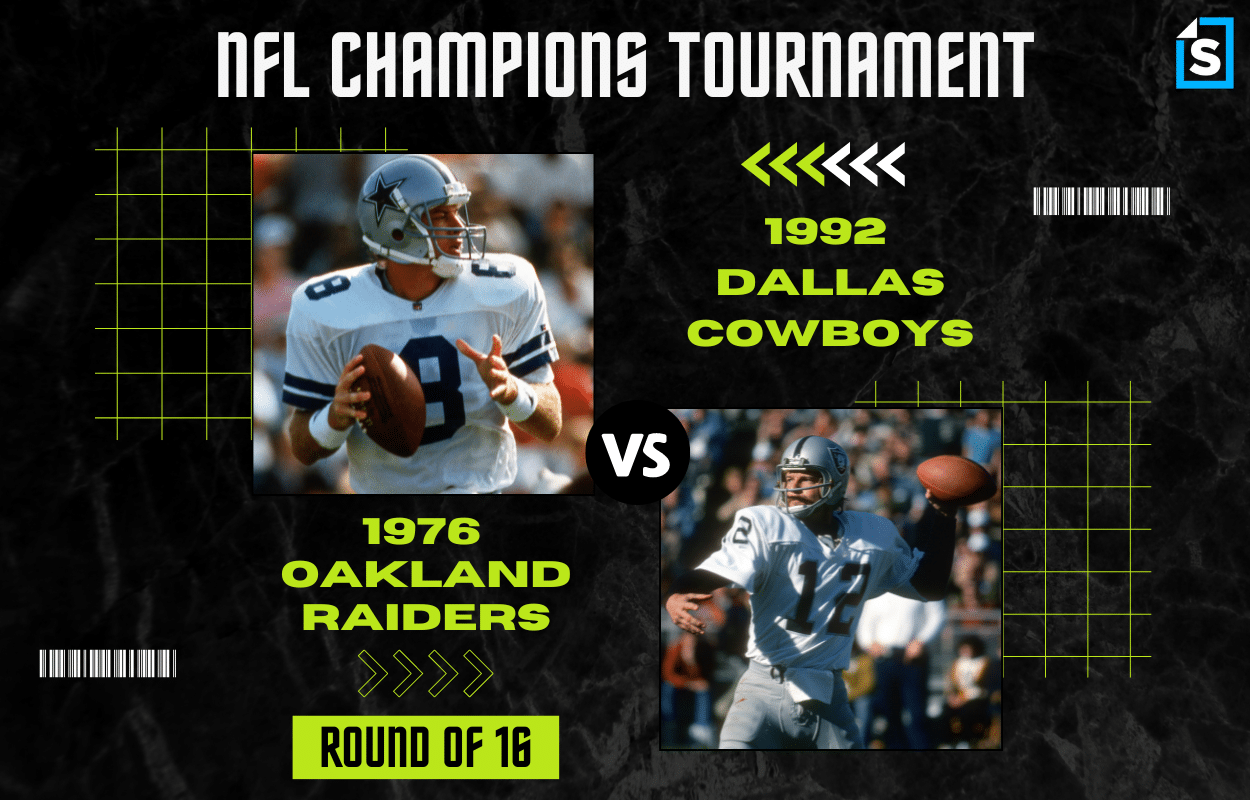
Coming off three consecutive losses in the AFC Championship Game, the Oakland Raiders changed the narrative that they couldn’t win the big one by knocking off the two-time defending champion Pittsburgh Steelers in the AFC title game en route to winning the franchise’s first Super Bowl.
But it was a Week 1 victory over those same Steelers that made it seem like John Madden was destined to finally lead his team to a title.
While the game was close early and tied 7-7 at the midway point, the Steelers took control in the second half and held a 28-14 lead with just over five minutes to play. But the Raiders refused to quit.
After the Oakland defense forced a Franco Harris fumble, Ken Stabler led a 75-yard scoring drive that culminated with a 10-yard touchdown pass to Dave Casper, cutting the lead to seven with 2:56 remaining.
The defense stepped up again on the ensuing possession, forcing a three-and-out, and the special teams stepped up as well as former Steeler Warren Blankston blocked the resulting punt to give the Raiders offense excellent field position as Charles Phillips returned the ball to the Pittsburgh 29.
Stabler threw three straight incompletions to begin the drive but connected with Cliff Branch for 27 yards on fourth down and followed it up with a two-yard touchdown run to tie the game with 1:05 on the clock.
On the ensuing possession, the Oakland defense made yet another big play as Willie Hall intercepted Terry Bradshaw’s very first pass of the drive and returned it to the Pittsburgh 12-yard line. After a couple of runs from Pete Banaszak got the ball to the four, Fred Steinfort kicked a 21-yard field goal to give the Raiders an improbably 31-28 win.
And that victory set the tone for the entire season. The Raiders believed they could beat anybody and nearly beat everybody, their only loss coming in Week 4 to the New England Patriots, a loss they avenged to open the postseason. Another win over the Steelers and a victory over the Vikings later, Madden had his Super Bowl title.
Like the ’76 Raiders, the 1992 Dallas Cowboys opened their regular season against the defending Super Bowl champions. In fact, the Cowboys, who’d won their first playoff game in nearly a decade the season before, opened their season against the winners of the two previous Super Bowls — and beat them both. Neither was quite as dramatic, however.
In Week 1, Dallas dominated Washington, 23-10, behind a 140-yard night from Emmitt Smith, who went on to win his second consecutive rushing title. And in Week 2, the Cowboys notched a 34-28 victory over the New York Giants behind a 238-yard, two-touchdown performance from Troy Aikman.
Like the Raiders, the Cowboys took a bad loss in their fourth game of the year as they were soundly beaten by the Philadelphia Eagles, 31-7. And like Oakland, Dallas avenged that loss in its postseason opener.
Following that first loss, the Cowboys didn’t run the table as the Raiders did but lost just twice more by a combined seven points, finishing 13-3, which remains the best record in franchise history. But despite having a worse record than Madden’s Oakland squad, Jimmy Johnson’s Dallas team averaged more points per game (25.6 to 25.0) and allowed fewer (15.2 to 16.9).
And in their postseason victories over the Eagles, 49ers, and Bills, the Cowboys scored 38.6 points per game while allowing an average of 15.6.
| Team | 1976 Raiders | 1992 Cowboys |
|---|---|---|
| Record | 13-1 | 13-3 |
| Super Bowl | Def. Minnesota Vikings 32-14 | Def. Buffalo Bills 52-17 |
| SB MVP | Fred Biletnikoff | Troy Aikman |
Trust me. There are plenty more similarities between the ’76 Raiders and the ’92 Cowboys, the most obvious being that both won the Super Bowl. But only one can move on to have the chance of being crowned the greatest Super Bowl champion in history. So who’s it going to be?
Winner: 1992 Dallas Cowboys
Honestly, I expected this vote to be much closer, but the ’92 Cowboys are moving on after taking 90% of the tally here, setting up a classic rivalry matchup in the Round of 8.
(21) 1994 San Francisco 49ers vs. (37) 2006 Indianapolis Colts
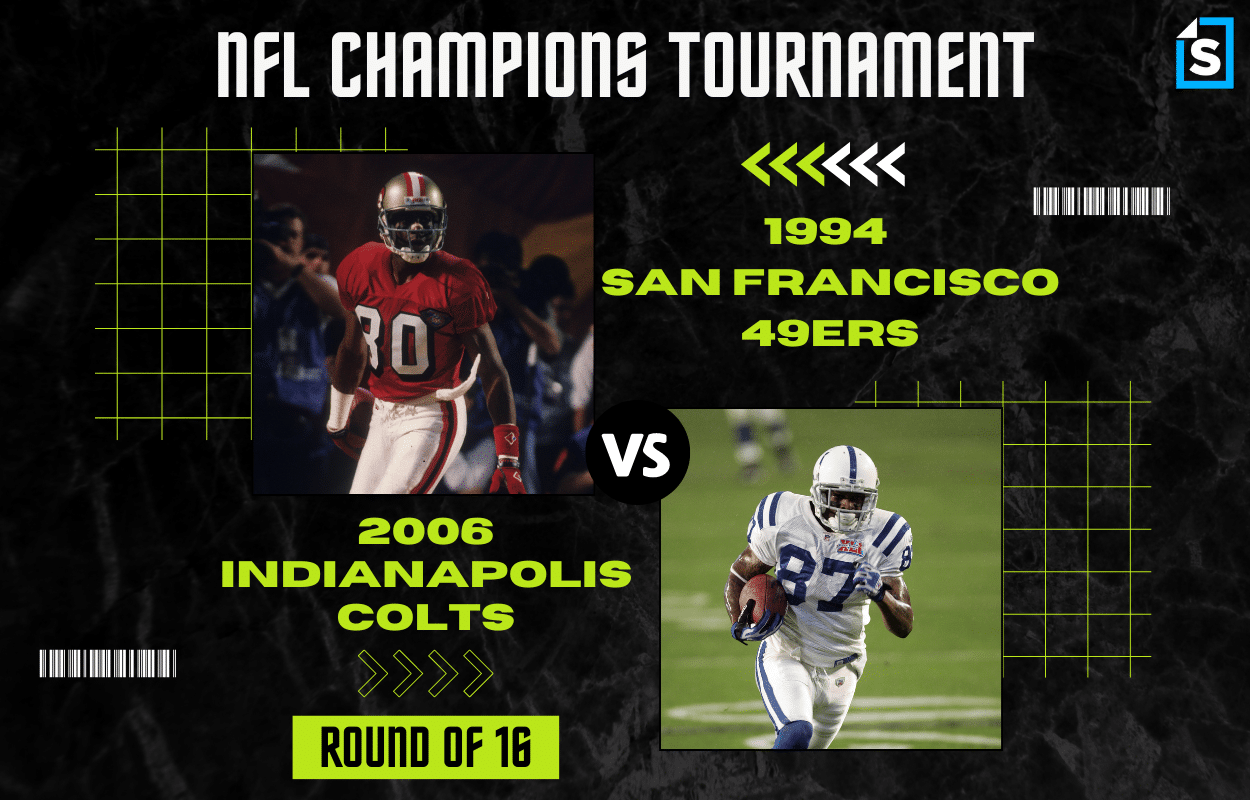
After two consecutive years of losing to the Dallas Cowboys in the NFC Championship Game, the San Francisco 49ers spent a lot of money ahead of the 1994 season to put themselves in a better position not to let that happen again.
While the offense didn’t require much additional help, some assistance was needed on the defensive side of the ball, and the Niners certainly got it. Gary Plummer and Rickey Jackson were brought in, but the most significant acquisitions were easily former Cowboys linebacker Ken Norton Jr. and, of course, Deion Sanders, who went on to win 1994 NFL Defensive Player of the Year.
But while the defense was undoubtedly improved, let’s not pretend it was the superior unit for George Seifert that season as the offense, led by the incredible duo of Steve Young and Jerry Rice, was absolutely phenomenal, averaging a league-best 31.6 points per game.
What some may not remember, however, is that things weren’t great early in the season. The Niners lost two of their first five, and during a 40-8 beating at the hands of the Philadelphia Eagles in Week 5, Young was actually benched for Elvis Grbac. And Young certainly wasn’t happy about it, later saying he legitimately wanted to fight his head coach.
But that may have been the best thing to happen to the 49ers, as the rest of the team saw how much their quarterback cared about winning. And after that loss, San Francisco did a lot of winning, losing just one game the rest of the season. But that was the regular-season finale against the Vikings that meant nothing as the Niners had already locked up the No. 1 seed. Young, who later won NFL MVP, threw just 13 passes that day before willfully sitting down.
And let’s not forget that 10-game winning streak included a 21-14 win over Dallas in Week 11. But that wasn’t the win over their rivals the 49ers needed. That, of course, came in a third straight showdown with the Cowboys in the NFC title game. And both the offense and defense came through that day.
The defense picked off Troy Aikman three times while Young threw a pair of touchdowns, one to Rice and the other to Ricky Watters, in a 38-28 victory. The Niners then easily won Super Bowl 29 over the Chargers, 49-26, behind a record six TD passes from Young.
Like the 1994 Niners, the strength of the 2006 Indianapolis Colts was the offense. While not quite as potent as Young’s group, the Colts averaged 26.7 points per game in ’06, good for second in the league. And that was despite the loss of Edgerrin James, who left Indy in the offseason after seven years to sign a big contract with the Arizona Cardinals.
But the tandem of rookie Joseph Addai and Dominic Rhodes picked up the slack nicely, rushing for a combined 1,722 yards and 12 touchdowns.
Peyton Manning, of course, had another fantastic season, completing 65% of his passes for 4,397 yards, at the time the third-highest total of his career, with a league-best 31 touchdowns against nine interceptions.
More than 60% of Manning’s passing yards went to the Pro Bowl duo of Marvin Harrison and Reggie Wayne, who combined for 181 receptions for 2,676 yards and 21 touchdowns.
It’s a good thing that Tony Dungy had a strong offense because the Colts’ defense in ’06 wasn’t great, allowing 22.5 points per game to rank 23rd out of 32 teams. The pass defense was solid and allowed the second-fewest yards in the league (159.3 per game). But the run defense was atrocious and allowed the most yards per game (173) and the most yards per carry (5.33). The latter was the worst mark since the 1970 AFL-NFL merger and ranked as the seventh-worst in NFL history.
Nevertheless, the Colts finished 12-4 to win the AFC South for a fourth straight year and earned the No. 3 seed in the AFC. And oddly enough, the defense allowed an average of just seven points in Indy’s first two playoff wins over the Chiefs and Ravens.
The offense was certainly the highlight in the Colts’ AFC Championship Game victory over Tom Brady and the rival New England Patriots, scoring 38 points in a four-point win. But after Devin Hester’s touchdown on the opening kickoff of Super Bowl 41, Indianapolis allowed just 10 more points in a 29-17 victory.
| Team | 1994 49ers | 2006 Colts |
|---|---|---|
| Record | 13-3 | 12-4 |
| Super Bowl | Def. San Diego Chargers 49-26 | Def. Chicago Bears 29-17 |
| SB MVP | Steve Young | Peyton Manning |
So while not the strongest unit overall, the Colts’ defense showed up when it mattered most.
The question, however, is if that Indy defense could contain Steve Young, Jerry Rice, and that vaunted ’94 Niners offense. The ’06 Colts have already pulled off two upsets in this tournament. Can they do it a third time? Let’s find out.
Winner: 1994 San Francisco 49ers
Unlike the previous matchup, I wasn’t expecting this one to be close, and it certainly wasn’t, as the ’94 Niners took 100% of the vote here to set up a matchup with the ’92 Cowboys.
(2) 1985 Chicago Bears vs. (15) 1973 Miami Dolphins
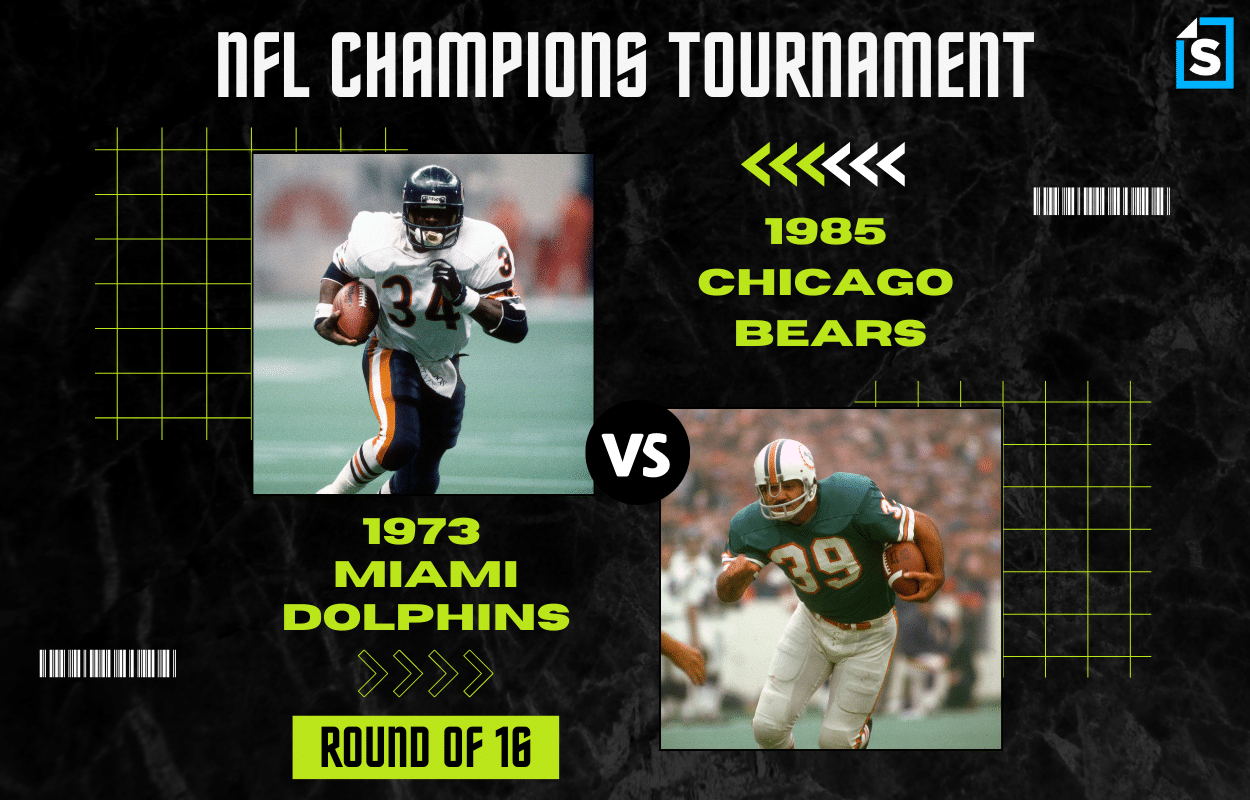
Coming into the 1985 NFL season, it had been more than two decades since the Chicago Bears had won their last NFL Championship, and the franchise had yet to appear in the Super Bowl.
They’d come close a season earlier, going 10-6 and getting past Washington in the Divisional Round before losing to the eventual Super Bowl champion San Francisco 49ers (the No. 3 seed in this tournament) in the NFC Championship Game. And they didn’t just lose that game. They were embarrassingly shut out, 23-0, which fueled their ’85 campaign.
And what a campaign it was.
Now, when discussing the ’85 Bears, who went 15-1, losing only to reigning NFL MVP Dan Marino and the Miami Dolphins, the defense usually gets the majority of the attention. And for good reason, as Buddy Ryan’s roster of ruthless defenders allowed a league-low 12.4 points per game and became the first unit to post back-to-back shutouts in NFL playoff history.
But the Chicago offense that season shouldn’t be overlooked. Now, nobody has ever overlooked Walter Payton, who, as always, was absolutely incredible, recording 2,034 yards from scrimmage and 11 touchdowns to finish second in the NFL MVP vote behind Marcus Allen. And let’s not forget that one touchdown pass he threw.
But Sweetness wasn’t the Bears’ only offensive weapon. While never a truly elite NFL quarterback, Jim McMahon threw for 2,392 yards and 15 touchdowns while starting only 11 games. Underrated fullback Matt Suhey averaged 4.1 yards per carry, good for 29th in the league overall, and ranked 11th at his position in rushing yards with 471 yards.
Chicago also had four receivers surpass the 400-yard mark in Willie Gault, Dennis McKinnon, Emery Moorehead, and Tim Wrightman. And that list obviously doesn’t include Payton, who reached the mark as well. Gault and Dennis Gentry were also dangerous on kickoffs, each averaging more than 25 yards per return.
Add all that up, and you’ve got a team that averaged 364.8 yards per game, good for seventh in the league, and averaged 28.5 points, second only to the San Diego Chargers.
And both units got to show off in Super Bowl 20 as the Bears rolled to a 46-10 win over the New England Patriots. Sadly, while Payton finally got the ring he deserved, he never reached the end zone in the victory.
While the 1972 Miami Dolphins obviously get much more press as they remain the only undefeated Super Bowl champion in history, many believe the 1973 team was better. And that includes several of the players that were on both squads.
The main argument there centers around strength of schedule. In 1972, the Dolphins played a famously weak slate in which they never faced a team during the regular season that finished with a mark better than 8-6. Now, that doesn’t take away from what they accomplished, as they beat everyone they were supposed to beat and still had to get through the postseason.
But this 1973 unit played a much more challenging regular-season schedule that included games against several playoff-caliber teams. And while these Dolphins didn’t go undefeated, they still finished with an impressive 12-2 record.
Like the ’85 Bears, the ’73 Dolphins are best known for their defense, which actually allowed fewer points per game than the ’72 unit, giving up just 10.7 per game. A prime example of just how good that defense was occurred in Week 6.
1973 was the season in which O.J. Simpson became the first player in NFL history to rush for 2,000 yards. However, in the Buffalo Bills’ Week 6 matchup with Miami, “The Juice” did not run loose and recorded a season-low 55 yards. Sure, he ran for 120 against them three weeks later, but you get the point. Besides, the Dolphins won both games, the second in a shutout.
And also like the ’85 Bears, the ’73 Dolphins’ offense was defined by their rushing attack as Larry Csonka, and Mercury Morris combined for 2,030 yards from scrimmage and 15 touchdowns.
The Miami passing attack wasn’t quite as strong, but nevertheless, the Dolphins averaged 24.5 points per game, good for fifth in the NFL.
If you need an example of just how much the Dolphins relied on the run, look no further than their Super Bowl 8 win over the Minnesota Vikings. Of the 60 offensive plays Miami ran that day, only seven were pass attempts from Bob Griese.
| Team | 1985 Bears | 1973 Dolphins |
|---|---|---|
| Record | 15-1 | 12-2 |
| Super Bowl | Def. New England Patriots 46-10 | Def. Minnesota Vikings 24-7 |
| SB MVP | Richard Dent | Larry Csonka |
So here we go. In 1985, the Chicago Bears took their only loss to the Miami Dolphins. Can they avoid such a fate in this tournament?
Winner: 1985 Chicago Bears
This was much closer than I expected, and we actually got a new first in this tournament. While the ’73 Dolphins won the Twitter vote, the ’85 Bears just squeaked out the overall victory, 54% to 46%, by way of Facebook votes and direct messages, setting up a Round of 8 matchup with the franchise against which they won the Super Bowl.
(7) 1986 New York Giants vs. (10) 2016 New England Patriots
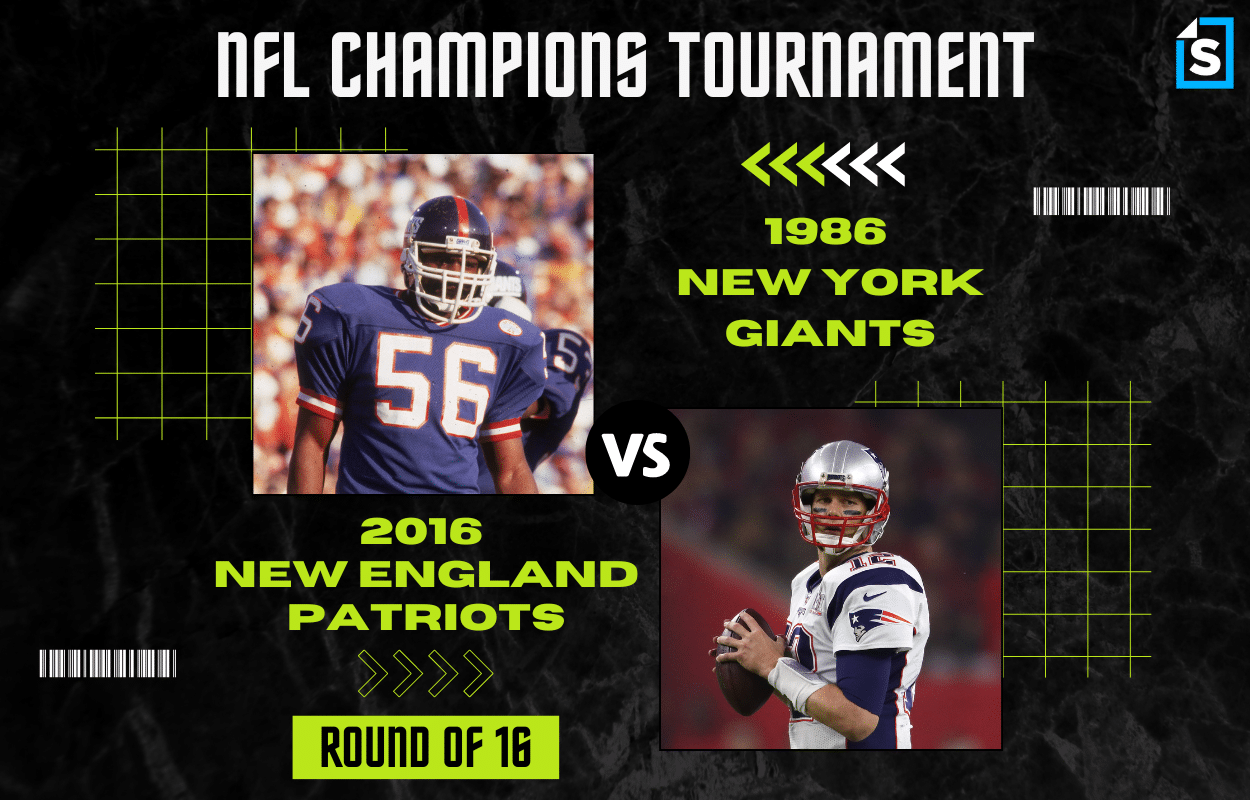
In Bill Parcells’ first year as the head coach of the New York Giants in 1983, the team went 3-12-1. A year later, they went 9-7 and won a playoff game before getting bounced in the Divisional Round by the eventual Super Bowl champion San Francisco 49ers.
In 1985, the Giants improved yet again, going 10-6. And while they got their revenge on the 49ers in the Wild Card Round, they again lost to the eventual champs in the Divisional Round as they took a 21-0 loss to the Chicago Bears.
So coming into the 1986 NFL season, New York was certainly one of the favorites to win the Super Bowl. But the season didn’t get off to a great start as the G-Men took a 31-28 loss to the rival Dallas Cowboys.
And Giants defensive coordinator Bill Belichick must have taken that loss personally, as his unit never allowed that many points again.
Led by Lawrence Taylor, who went on to win his third Defensive Player of the Year trophy and also became just the second defensive player to win NFL MVP, the Big Blue Wrecking Crew held opponents to single-digit totals in four of the next five games and only allowed 20 points or more three additional times during the season.
On average, the New York defense allowed just 14.8 points per game. And LT & Co. were even better in the postseason. In the Divisional Round, they knocked Joe Montana out of the game and held the 49ers to just three points in a lopsided 46-point win. And after New York shut out Washington in the NFC title game, John Madden remarked that the Giants’ defense was as good as any he’d ever seen, which speaks volumes.
In Super Bowl 21, the Giants picked off John Elway three times in a 39-20 win to claim the franchise’s first championship in three decades. And let’s not forget that while not the first to do it, this team popularized the Gatorade shower.
When most discuss the New England Patriots’ dynasty, the conversation, at least in terms of players as Bill Belichick obviously comes up, usually begins with Tom Brady. And he certainly deserves that, given all he did for that franchise. And he certainly deserves praise for his 2016 campaign.
Despite missing the first four games due to his suspension stemming from the Deflategate scandal, TB12 threw for 3,554 yards, finished fourth in passing yards per game (296.2), and tied for seventh in touchdown passes with 28. But his most impressive stat? How about the fact that he only threw two interceptions in 12 games for a ridiculous touchdown-to-interception ratio of 14:1?
So even with younger and more inexperienced versions of Jimmy Garoppolo and Jacoby Brissett handling a quarter of New England’s game that season, the Pats still averaged 27.6 points per game, good for third in the NFL.
But just as it is with the vast majority of Belichick’s Super Bowl-winning squads, the Patriots’ 2016 defense shouldn’t be overlooked for their accomplishments in helping New England to a 14-2 season.
Despite somehow only having two Pro Bowlers that year in Devin McCourty and Dont’a Hightower, the Patriots allowed the eighth-fewest total yards per game, the third-fewest rushing yards, and the fewest points, giving up just 15.6 per game.
Of the Patriots’ six title-winning teams, the 2016 squad owns the highest average per-game point differential.
| Team | 1986 Giants | 2016 Patriots |
|---|---|---|
| Record | 14-2 | 14-2 |
| Super Bowl | Def. Denver Broncos 39-20 | Def. Atlanta Falcons 34-28 |
| SB MVP | Phil Simms | Tom Brady |
I know I’ve said it multiple times, but you just have to love the formulaic seeding of this tournament. Everyone knows Tom Brady had trouble with the New York Giants in the Super Bowl. But in the Opening Round here, these same 2016 Patriots took down the ’07 squad that ruined TB12’s perfect season.
So what do you say here? Can Brady and the ’16 Pats get a second win over the Giants in this tournament? Or would Belichick’s New York defense shut him down?
Winner: 2016 New England Patriots
While Tom Brady’s real season — and maybe his career — ended this week as his Buccaneers lost to the Cowboys, he’ll have at least one team in the Round of 8 as his ’16 Patriots took down the ’86 Giants by taking two-thirds of the vote.
(3) 1984 San Francisco 49ers vs. (46) 2020 Tampa Bay Buccaneers
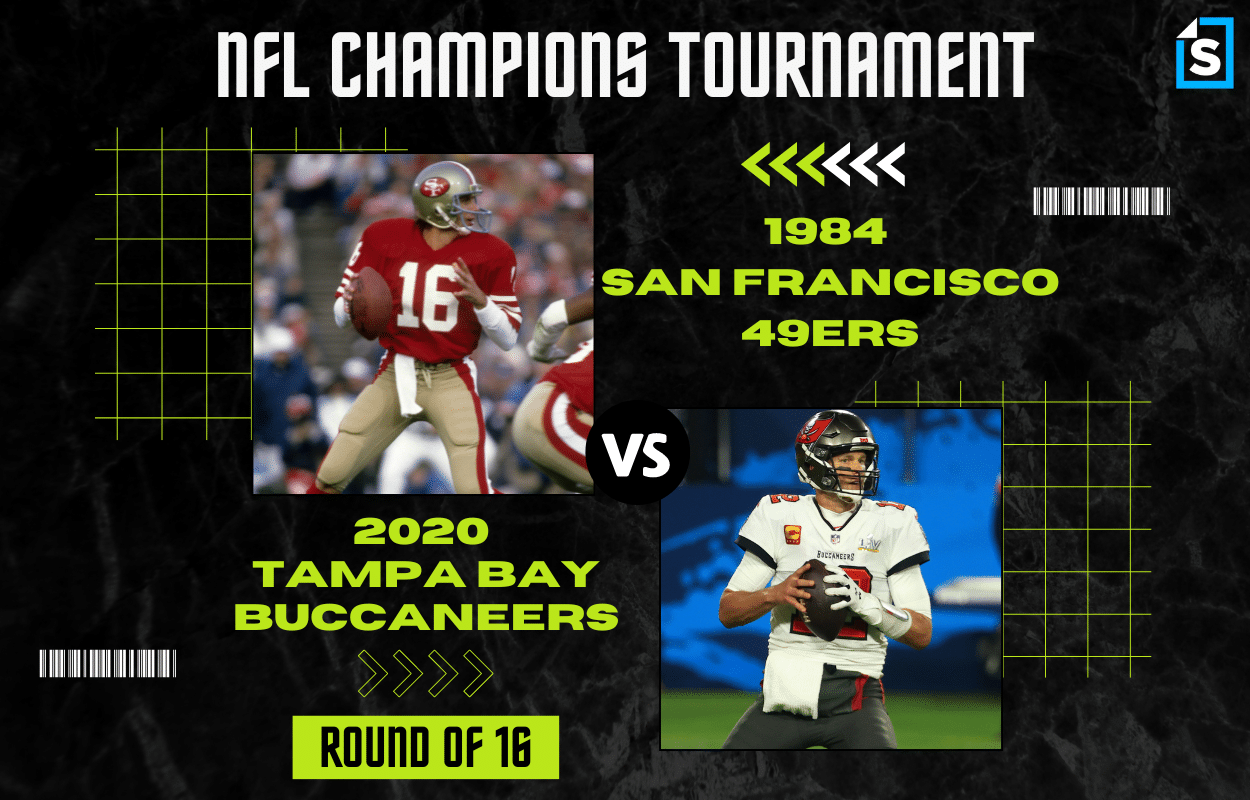
The 1984 San Francisco 49ers are seen by many as the greatest team in franchise history. And as I mentioned in the previous round, that’s certainly saying something seeing as Jerry Rice didn’t arrive in the Bay Area until the following year. Honestly, as the two will forever be linked as one of the greatest quarterback-receiver duos in NFL history, it’s often easy to forget that Joe Montana won two Super Bowls without Rice’s services.
But what shouldn’t be forgotten is that Montana had plenty of weapons on this ’84 squad that featured the second-highest-scoring offense in the league, averaging 29.7 points per game. Only the team they beat in the Super Bowl, the Miami Dolphins, averaged more at 32.1.
So while Montana, who had a solid season in completing 64.6% of his passes for 3,630 yards with 28 touchdowns against 10 interceptions, typically receives the credit for the 49ers’ success, he certainly wasn’t the only offensive star for San Francisco.
There are names many recognize, such as Dwight Clark, who caught 52 passes for 880 yards and six touchdowns. But then there’s Freddie Solomon, who caught 40 balls for 737 yards and 10 scores.
And you certainly know the name Roger Craig, who rushed for 649 yards and seven TDs and also caught 71 passes for 675 yards and three additional touchdowns. But do you know the name Wendell Tyler, who led the ’84 Niners in rushing with 1,262 yards and seven touchdowns? And did you know that he’s the only other player besides Montana of the names I just mentioned to get elected to the Pro Bowl that season? A trio of offensive linemen — Randy Cross, Keith Fahnhorst, and Fred Quillan — also got the call.
And what’s scary about this ’84 team is that the offense wasn’t even the best unit. The Niners’ defense, which also sent five players to the Pro Bowl, including all four starting defensive backs, allowed the fewest points in the league, giving up just 14.2 per game. And they gave up just 16 to NFL MVP Dan Marino and the aforementioned Miami Dolphins in Super Bowl 19.
The 49ers’ only loss that year was a Week 7 defeat at the hands of the Pittsburgh Steelers. And that was by only three points.
Unlike the ’84 Niners, who sent 10 players to the Pro Bowl, the 2020 Tampa Bay Buccaneers, as I mentioned last round, sent just one, that being Jason Pierre-Paul.
But that certainly doesn’t mean the Bucs didn’t have stars on both sides of the football. On the defensive side of things, in addition to Pierre-Paul, you had Devin White, who made a team-high 140 tackles. You had Antoine Winfield Jr., who made 94 tackles and forced a pair of fumbles.
There’s Shaquil Barrett, who had eight sacks, and Ndamukong Suh, who had six. Lavonte David. Sean Murphy-Bunting. Carlton Davis. The list goes on. While Todd Bowles’ unit ranked just eighth in the league in points allowed during an 11-5 regular season, you may recall this group held Patrick Mahomes and the Kansas City Chiefs to only nine points in Super Bowl 55.
And then, of course, you’ve got all the big stars on offense. Ronald Jones and Leonard Fournette combined for 1,743 yards from scrimmage and 14 touchdowns. The quintet of Mike Evans, Chris Godwin, Rob Gronkowski, Scotty Miller, and Antonio Brown combined to catch 385 passes for 3,453 yards and 34 touchdowns.
Who am I forgetting here? Oh, yes. Mr. Tom Brady. After two decades in New England, TB12 took his talents to Tampa and completely changed the culture, helping the Bucs to their first playoff berth in 13 years with a magnificent season.
At age 43, the then-six-time Super Bowl champ completed 65.7% of his passes for 4,633 yards with 40 touchdowns against 12 interceptions. And after leading the Bucs to three road wins to open the postseason, Brady completed 72.4% of his passes for 201 yards with three touchdowns and no picks to earn his seventh ring and fifth Super Bowl MVP trophy.
| Team | 1984 49ers | 2020 Buccaneers |
|---|---|---|
| Record | 15-1 | 11-5 |
| Super Bowl | Def. Miami Dolphins 38-16 | Def. Kansas City Chiefs 31-9 |
| SB MVP | Joe Montana | Tom Brady |
So here we go. Tom Brady squares off with the quarterback he grew up watching and idolizing in Joe Montana. Does it get much bigger than that?
Winner: 1984 San Francisco 49ers
As they dominated most of their opponents in 1984, the San Francisco 49ers dominated the 2020 Tampa Bay Buccaneers, taking 100% of the vote to move to the Round of 8.
(6) 1989 San Francisco 49ers vs. (11) 1978 Pittsburgh Steelers
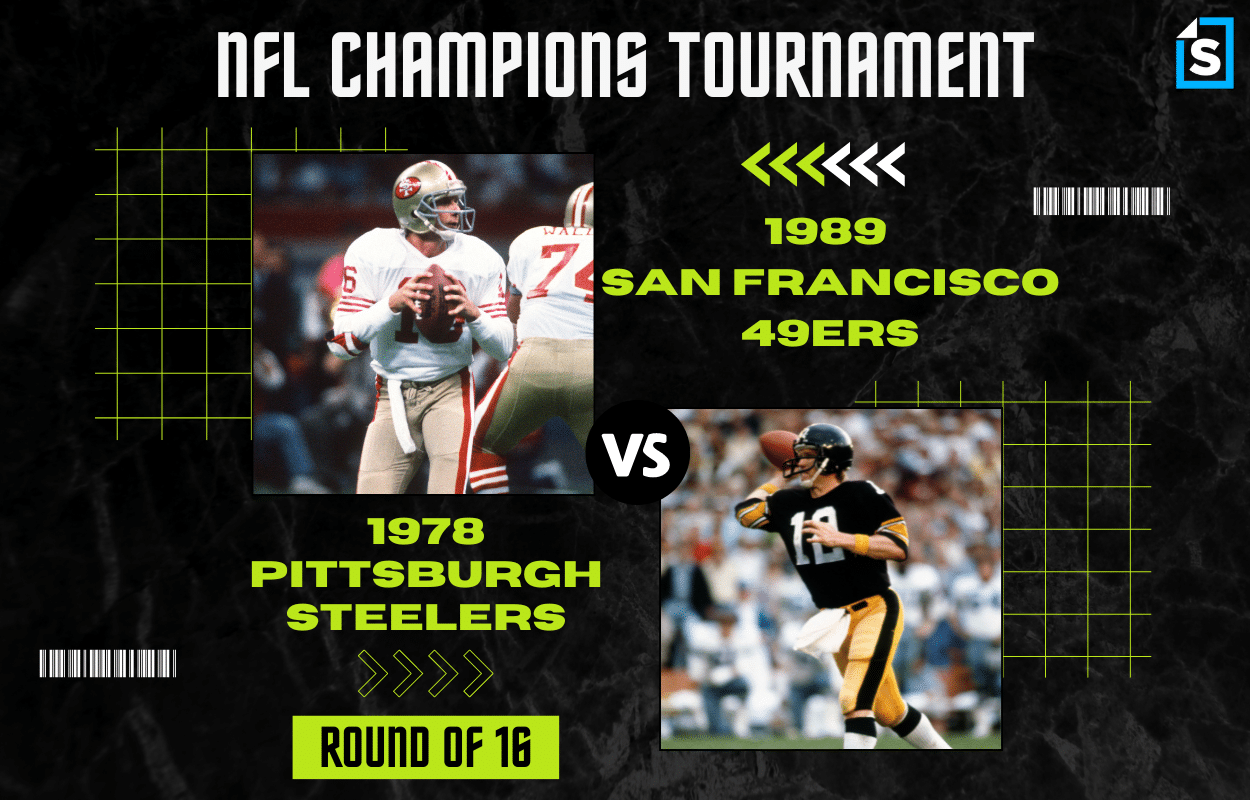
Remember in the previous game when I said that many believe the 1984 San Francisco 49ers are the best team in franchise history? Well, the folks not in that camp would likely go with this 1989 squad that went 14-2 in the regular season and dominated the playoffs.
We, of course, have to start with Joe Montana. After years of coming up short in the NFL MVP voting, the Notre Dame product finally got one. And what makes the feat even more impressive is the fact that “Joe Cool” played just 13 of the Niners’ 16 regular-season games. Steve Young started the other three and went undefeated.
Perhaps his most memorable performance came in a come-from-behind victory over the Philadelphia Eagles in Week 3. Down 18-10 after three quarters, Montana threw four touchdown passes in the fourth quarter to lead San Francisco to a 38-28 win, ultimately finishing the night with 428 yards and five touchdown passes.
For the season, Montana completed a career-best and league-high 70.2% of his passes for 3,521 yards with 26 touchdowns against eight interceptions. At the time, his 112.4 passer rating was the highest in NFL history. The 49ers led the league in scoring that year, averaging 27.6 points per game.
Jerry Rice and John Taylor combined for 142 receptions for 2,560 yards and 27 touchdowns, while Roger Craig earned 1,527 yards from scrimmage and found the end zone seven times.
But these Niners weren’t only dangerous on offense. The defense was damn good as well and allowed just 15.8 points per game, good for third in the NFL.
And do you know who allowed the fewest points in the regular season in 1989? That would be the Denver Broncos. And do you remember against whom the 49ers dropped 55 points in the Super Bowl? That would be the Denver Broncos. San Francisco’s 55-10 drubbing of Denver remains the largest margin of victory in Super Bowl history.
But it wasn’t just the Super Bowl that the Niners dominated in the postseason. In their three playoff wins, they outscored their opponents 126-26, which is simply absurd.
Like the ’89 Niners, the 1978 Pittsburgh Steelers went 14-2 during the regular season. And like Joe Montana, Terry Bradshaw won NFL MVP that season, throwing for 2,915 yards and 28 touchdowns for a Steelers offense that averaged 22.3 points per game, good for fifth in the NFL.
Also like Montana, Bradshaw had plenty of weapons surrounding him on the offensive side of the football. In the backfield, the trio of Franco Harris, Rocky Bleier, and Sidney Thornton combined for 2,357 yards from scrimmage and 17 touchdowns.
And the receiving quartet of Lynn Swann, John Stallworth, Randy Grossman, and Bennie Cunningham combined to catch 155 passes for 2,447 yards and 23 touchdowns.
But as it typically went for the 1970s Pittsburgh dynasty, the star unit of the team was the defense. Led by linebackers Jack Ham and Jack Lambert, who respectively finished second and fourth in Defensive Player of the Year voting, the Steelers allowed just 12.2 points per game.
Pittsburgh only gave up more than 20 points twice during the regular season, the first instance resulting in their first loss of the season, a 24-17 defeat in Week 8 on Monday Night Football at the hands of the Houston Oilers. The Steelers got their revenge on Houston in the AFC title game in a 34-5 victory.
In total, Pittsburgh sent 10 players to the Pro Bowl, four from the offense and six from the defense, and had five players selected to an All-Pro Team.
| Team | 1989 49ers | 1978 Steelers |
|---|---|---|
| Record | 14-2 | 14-2 |
| Super Bowl | Def. Denver Broncos 55-10 | Def. Dallas Cowboys 35-31 |
| SB MVP | Joe Montana | Terry Bradshaw |
So what do you think? Could Joe Montana and his supporting cast of Jerry Rice, John Taylor, and Roger Craig dominate the vaunted Pittsburgh defense? Or could Terry Bradshaw, Franco Harris, Lynn Swann, and John Stallworth get that defense enough points to come out on top? Legendary players. Legendary franchises. But one’s gotta go. Who’s it gonna be?
Winner: 1989 San Francisco 49ers
This was certainly a much closer vote than the previous game, but the result was the same as the ’89 Niners took 60% of the vote to knock the Pittsburgh Steelers out of the tournament for good. The win also sets up a Round of 8 battle between Joe Montana’s two greatest Super Bowl-winning squads.
Super Bowl Tournament Round of 8
Before we get into the four quarterfinal matchups, here’s a quick recap of the Round of 16. Of the eight games in this round, six were won by the higher seed. And sorry to disappoint you, Steelers fans, but all three remaining Pittsburgh teams were knocked out. On the flip side, all three remaining San Francisco 49ers squads advanced.
But that won’t be the case in the Round of 8 as two of those legendary Niners squads will square off for the right to advance to the semifinals.
While five of the top 10 seeds remain, we’ve also got three teams seeded 20th or lower, two of which will square off this week. Here’s a quick look at the results from the Round of 16.
- (1) 1972 Miami Dolphins def. (17) 1975 Pittsburgh Steelers
- (25) 1999 St. Louis Rams def. (41) 1974 Pittsburgh Steelers
- (20) 1992 Dallas Cowboys def. (4) 1976 Oakland Raiders
- (21) 1994 San Francisco 49ers def. (37) 2006 Indianapolis Colts
- (2) 1985 Chicago Bears def. (15) 1973 Miami Dolphins
- (10) 2016 New England Patriots def. (7) 1986 New York Giants
- (3) 1984 San Francisco 49ers def. (46) 2020 Tampa Bay Buccaneers
- (6) 1989 San Francisco 49ers def. (11) 1978 Pittsburgh Steelers
As we’ve got four games to get to, we’re keeping the writeups short and sweet this week. But we have added some new elements to our tale-of-the-tape tables to assist you with your voting decision. And if you do want a little more on each team, keep scrolling and find their games from the previous rounds, as we’ve already covered just about everything there is to know about each squad’s strengths, weaknesses (when applicable), and how their season went.
(1) 1972 Miami Dolphins vs. (25) 1999 St. Louis Rams
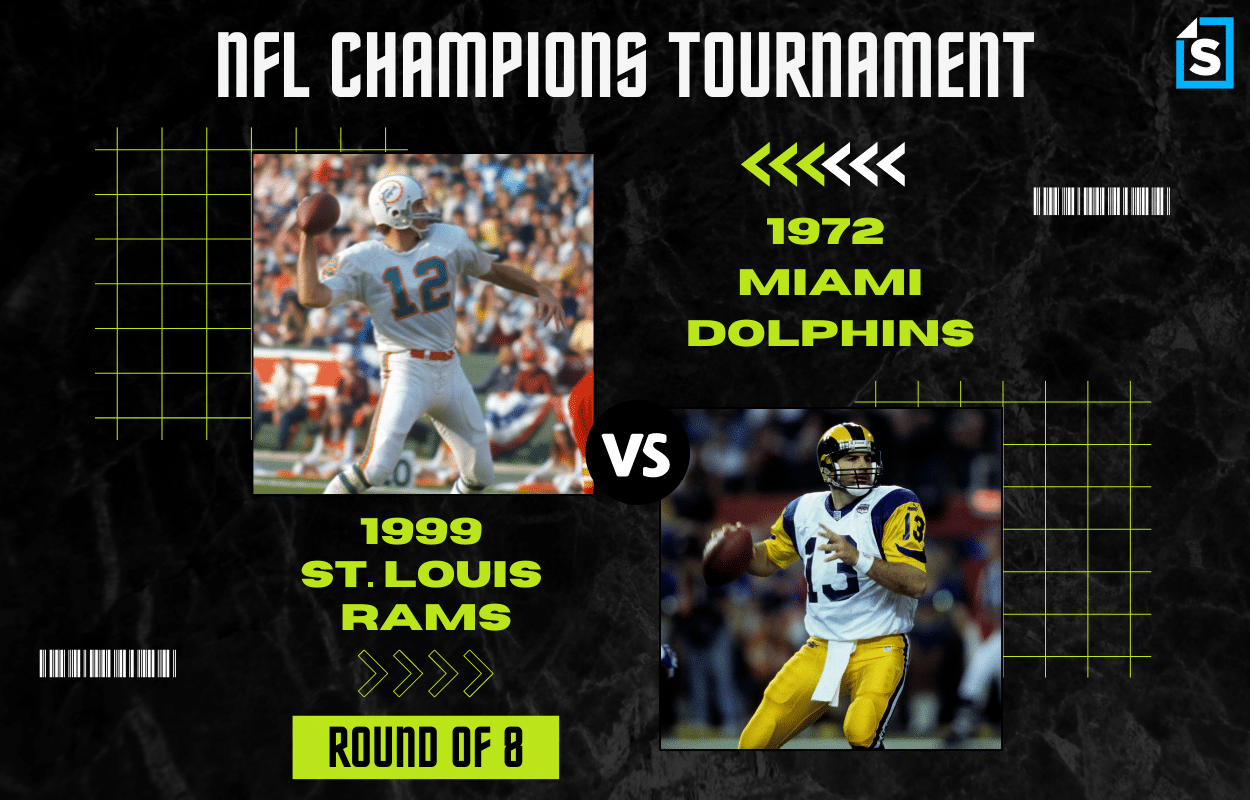
So the big question here is whether or not you think the 1972 Miami Dolphins’ defense can contain “The Greatest Show on Turf.” It’s not that the Miami offense versus the St. Louis defense isn’t fun as well, but I think most would agree that the former would decide this matchup.
One on hand, you’ve got the Dolphins’ defense, which never surrendered more than 24 points during Miami’s undefeated season. And on the other, you’ve got a St. Louis offense that surpassed that number in 15 of 19 games. And in two of the four in which they didn’t hit 24, they scored 23.
| Team | 1972 Dolphins | 1999 Rams |
|---|---|---|
| Regular Season Record | 14-0 | 13-3 |
| Points Scored | 385 (27.5/g-1st) | 526 (32.9/g-1st) |
| Points Allowed | 171 (12.2/g-1st) | 242 (15.1/g-4th) |
| Pro Bowlers | 9 | 7 |
| AP All-Pros | 8 | 7 |
| Conference Playoff Results | Def. Cleveland Browns 20-14 Def. Pittsburgh Steelers 21-17 | Def. Minnesota Vikings 49-37 Def. Tampa Bay Buccaneers 11-6 |
| Super Bowl | Def. Washington Commanders 14-7 | Def. Tennessee Titans 23-16 |
| SB MVP | Jake Scott | Kurt Warner |
So what do you think? Do the ’72 Dolphins keep their undefeated record intact, or do the ’99 Rams shock the world yet again?
Winner: 1972 Miami Dolphins
This was as close as close can get, folks, as the 1972 Miami Dolphins kept their winning streak alive by knocking out the 1999 St. Louis Rams by a single vote.
(20) 1992 Dallas Cowboys vs. (21) 1994 San Francisco 49ers
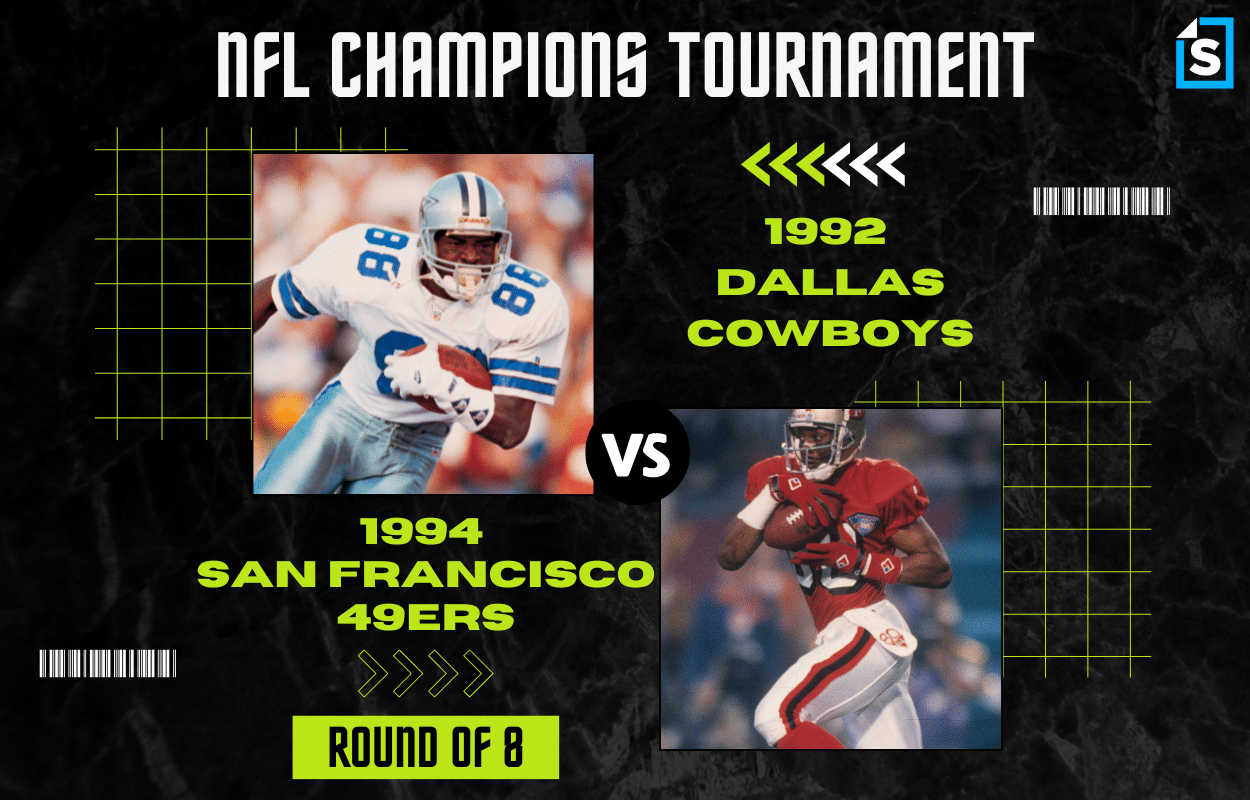
It’s only fitting that we get a ’90s Cowboys vs. ’90s 49ers matchup in this tourney, isn’t it? After all, the two legendary franchises met in three consecutive NFC title games in the early part of the decade, and we’ve got the bookends of that terrific trilogy battling it out here in the Round of 8.
Following the 1992 season, the Cowboys took down the Niners by 10 to advance to Super Bowl 27. And two years later, San Francisco defeated Dallas by 10 to advance to Super Bowl 29. For those unaware, the Cowboys won the middle matchup following the ’93 campaign by 17. But I digress.
As it pertains to this specific matchup, each won their respective Super Bowl in blowout fashion, the Cowboys by 35 over the Bills and the 49ers by 23 over the Chargers.
While we have to use our imaginations to picture the vast majority of the games in this tournament, we don’t have to do that here, as we saw this beautiful battle play out thrice back in the day. With all due respect to Buffalo and San Diego, Dallas vs. San Francisco was the real Super Bowl during that three-year stretch.
| Team | 1992 Cowboys | 1994 49ers |
|---|---|---|
| Regular Season Record | 13-3 | 13-3 |
| Points Scored | 409 (25.6/g-2nd) | 505 (31.6/g-1st) |
| Points Allowed | 243 (15.2/g-5th) | 296 (18.5/g-6th) |
| Pro Bowlers | 6 | 10 |
| AP All-Pros | 4 | 5 |
| Conference Playoff Results | Def. Philadelphia Eagles 34-10 Def. San Francisco 49ers 30-20 | Def. Chicago Bears 44-15 Def. Dallas Cowboys 38-28 |
| Super Bowl | Def. Buffalo Bills 52-17 | Def. San Diego Chargers 49-26 |
| SB MVP | Troy Aikman | Steve Young |
So while this particular Cowboys-49ers matchup won’t get the winner into the title game of this tournament, the victor does move one step closer to being crowned the greatest Super Bowl champion in history. So who’s it gonna be?
Winner: 1992 Dallas Cowboys
It’s been a long while since the Dallas Cowboys have been in a real position to compete for a championship, but the ’92 squad has moved into the semifinals here, taking 55% of the vote to knock the ’94 Niners out of the tournament. But they’ve got a daunting task in the Final 4 in the undefeated ’72 Dolphins.
(2) 1985 Chicago Bears vs. (10) 2016 New England Patriots
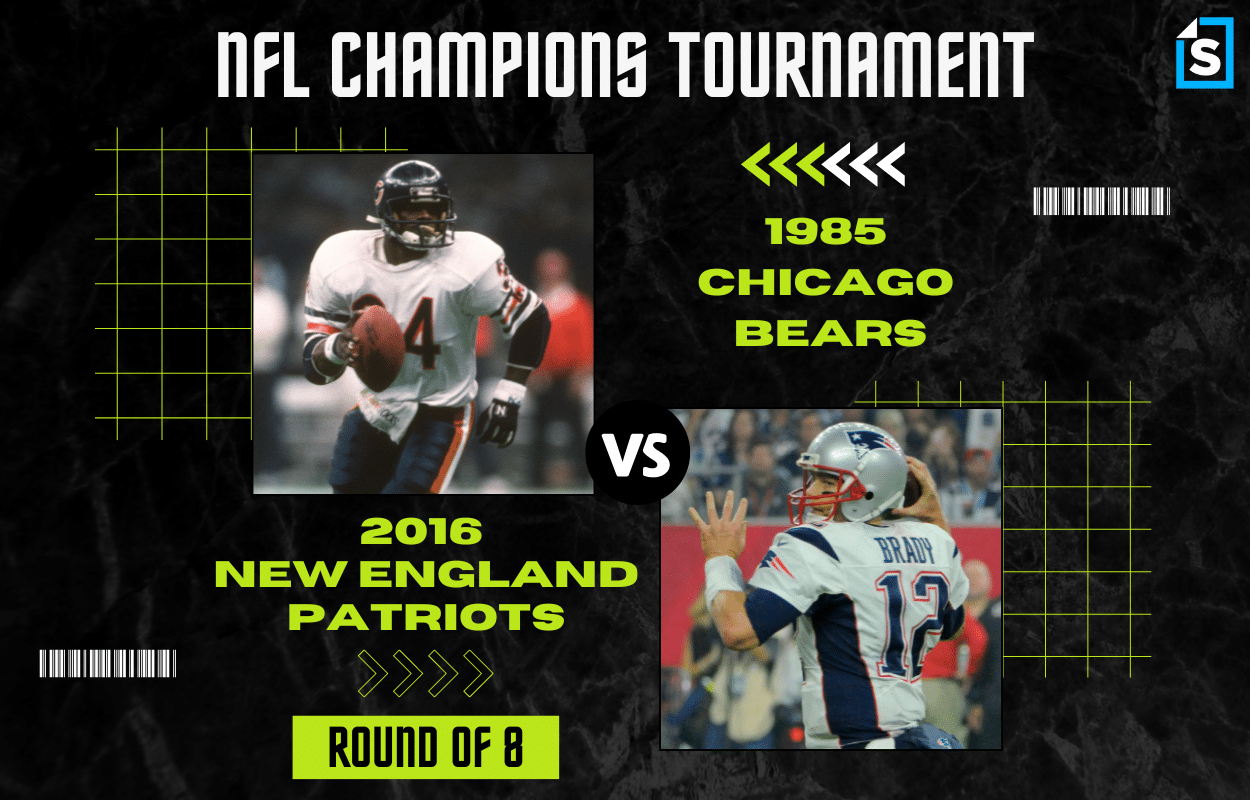
During the 1985 NFL season, the Chicago Bears put together one of the greatest campaigns in NFL history. The offense, anchored by the late, great Walter Payton, scored 28.5 points per game, while Buddy Ryan’s famed “46” defense allowed just 12.4 on a weekly basis as the Bears went 15-1.
And following two shutouts to open the postseason, the Monsters of the Midway defeated none other than the New England Patriots in Super Bowl 20 and did so in convincing fashion, 46-10.
However, this matchup with the Patriots is slightly different for the Super Bowl Shufflers. And we all know why, don’t we? With all due respect to those ’85 Patriots quarterbacks, Steve Grogan and Tony Eason, they ain’t Tom Brady. But let’s get real. Is anybody?
So let’s say the ’85 Bears got up big on the 2016 Patriots just as they did against the 1985 Patriots in Super Bowl 20. Would that lead be as safe as it was back then? As I’m sure you haven’t forgotten, those ’16 Pats faced a fairly sizable deficit against the Atlanta Falcons in Super Bowl 51 before engineering the greatest comeback in title game history. Anyone remember what that score was before New England fought all the way back?
| Team | 1985 Bears | 2016 Patriots |
|---|---|---|
| Regular Season Record | 15-1 | 14-2 |
| Points Scored | 456 (28.5/g-2nd) | 441 (27.6/g-3rd) |
| Points Allowed | 198 (12.4/g-1st) | 250 (15.6/g-1st) |
| Pro Bowlers | 9 | 4 |
| AP All-Pros | 8 | 7 |
| Conference Playoff Results | Def. New York Giants 21-0 Def. Los Angeles Rams 24-0 | Def. Houston Texans 34-16 Def. Pittsburgh Steelers 36-17 |
| Super Bowl | Def. New England Patriots 46-10 | Def. Atlanta Falcons 34-28 |
| SB MVP | Richard Dent | Tom Brady |
So what do you think? Do the ’85 Bears get another victory over the Patriots? Or does New England get its revenge?
Winner: 1985 Chicago Bears
Just as the ’85 Bears walloped the Patriots to win Super Bowl 20, the Monsters of the Midway mashed the ’16 Pats as well, taking 100% of the vote to knock Tom Brady out of this tournament for good.
(3) 1984 San Francisco 49ers vs. (6) 1989 San Francisco 49ers
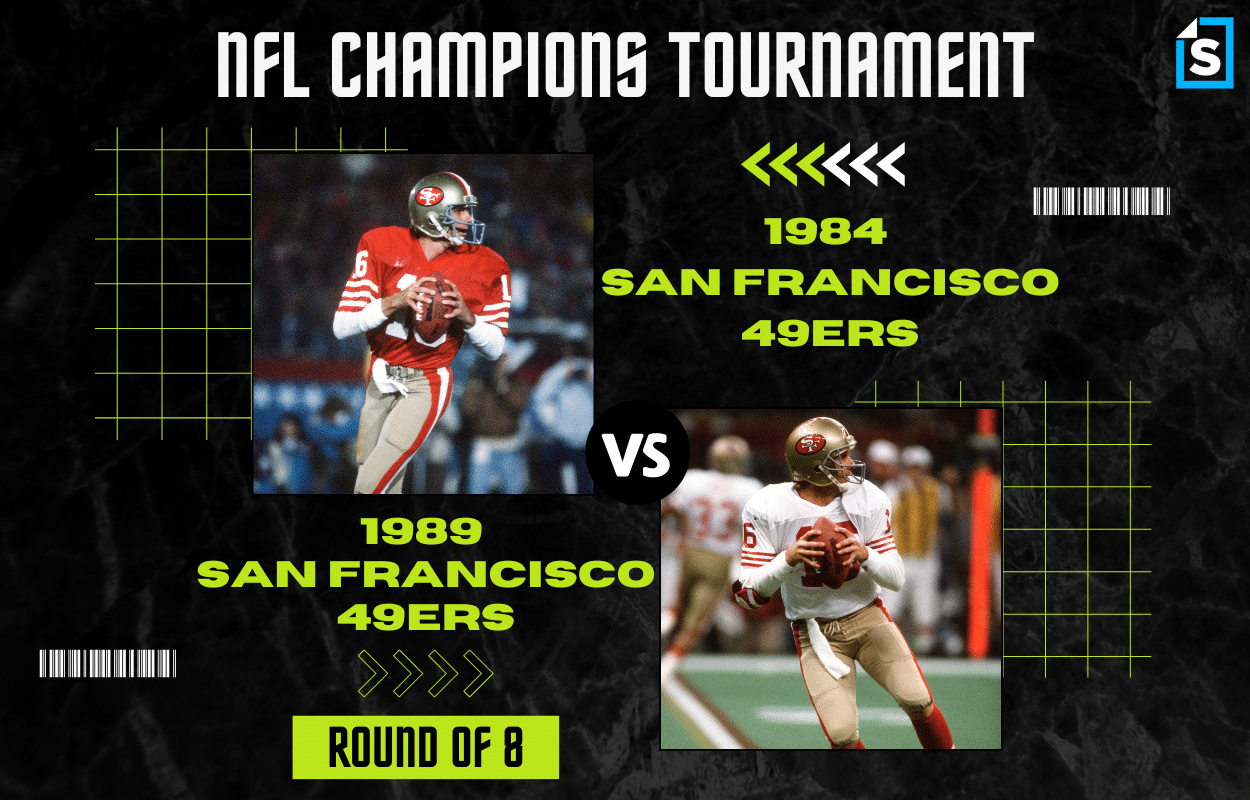
And look at what we have here. Of the four San Francisco 49ers teams Joe Montana led to Super Bowl titles, the 1984 and 1989 squads are easily the top two.
On one side, you’ve got the 1984 team, which went 15-1 in the regular season. As one would typically expect from a unit with Montana at the helm, the offense was fantastic, averaging 29.7 points per game. But the defense was spectacular in its own right. After allowing a league-low 14.2 points per game in the regular season, the Niners gave up just 26 total points in three postseason games. Remember that number.
On the other side, you’ve got the ’89 Niners, who went 14-2 in the regular season. As it was with the ’84 squad, the offense was incredible, averaging a league-high 27.6 points per game as Montana had one of the greatest seasons of his career and won the first of two straight NFL MVP awards.
And this defense was pretty damn good in its own right. After allowing just 15.8 points per game during the regular season, these Niners allowed — yep, you guessed it — just 26 total points in three postseason games.
Oh, and did I mention that the ’84 Niners beat Dan Marino in the Super Bowl and the ’89 Niners beat John Elway?
And one more thing — and this is in no way trying to persuade anyone how to vote. But it MUST be noted that while the ’84 team had the better record, the ’89 team had Jerry Rice.
| Team | 1984 49ers | 1989 49ers |
|---|---|---|
| Regular Season Record | 15-1 | 14-2 |
| Points Scored | 475 (29.7/g-2nd) | 442 (27.6/g-1st) |
| Points Allowed | 227 (14.2/g-1st) | 253 (15.8/g-3rd) |
| Pro Bowlers | 10 | 6 |
| AP All-Pros | 4 | 5 |
| Conference Playoff Results | Def. New York Giants 21-10 Def. Chicago Bears 23-0 | Def. Minnesota Vikings 41-13 Def. Los Angeles Rams 30-3 |
| Super Bowl | Def. Miami Dolphins 38-16 | Def. Denver Broncos 55-10 |
| SB MVP | Joe Montana | Joe Montana |
It’s really unfortunate that the 49ers have to lose a team here, but that’s the way the cookie crumbles. This is the only matchup in the Round of 8 in which both teams are single-digit seeds. So who’s going home?
Winner: 1989 San Francisco 49ers
In a recent YouTube roundtable with my fellow NFL experts here at Sportscasting, I said that the 1989 San Francisco 49ers were the greatest team in franchise history. And all of you who voted apparently agreed with me, as the ’89 squad took 100% of the vote against the ’84 unit, setting up a delicious matchup with the ’85 Bears in the semis.
Super Bowl Tournament Final 4
Before we get into the Final 4, let’s take a quick look at the results from the Round of 8.
Of the four quarterfinal matchups, three were won by the higher seed, the only exception being the sixth-seeded 1989 San Francisco 49ers, who eliminated the third-seeded ’84 Niners. But is that really that much of an upset, given the strength of that unit? While the 49ers had three of the final eight teams, which is impressive, just one remains, as the ’92 Cowboys knocked out Steve Young’s 1994 squad.
This past round also saw the last gasp of Tom Brady in this tournament as his 2016 Patriots were eliminated by the second-seeded 1985 Chicago Bears. And joining them in the Final 4 is the tourney’s top seed, the undefeated ’72 Dolphins, who squeaked by Kurt Warner’s 1999 Rams.
- (1) 1972 Miami Dolphins def. (25) 1999 St. Louis Rams
- (20) 1992 Dallas Cowboys def. (21) 1994 San Francisco 49ers
- (2) 1985 Chicago Bears def. (10) 2016 New England Patriots
- (6) 1989 San Francisco 49ers def. (3) 1984 San Francisco 49ers
We added some new elements to our tale-of-the-tape tables in the quarters, and we’ll keep those here in the semis as well. So without further ado, let’s get to it.
(1) 1972 Miami Dolphins vs. (20) 1992 Dallas Cowboys
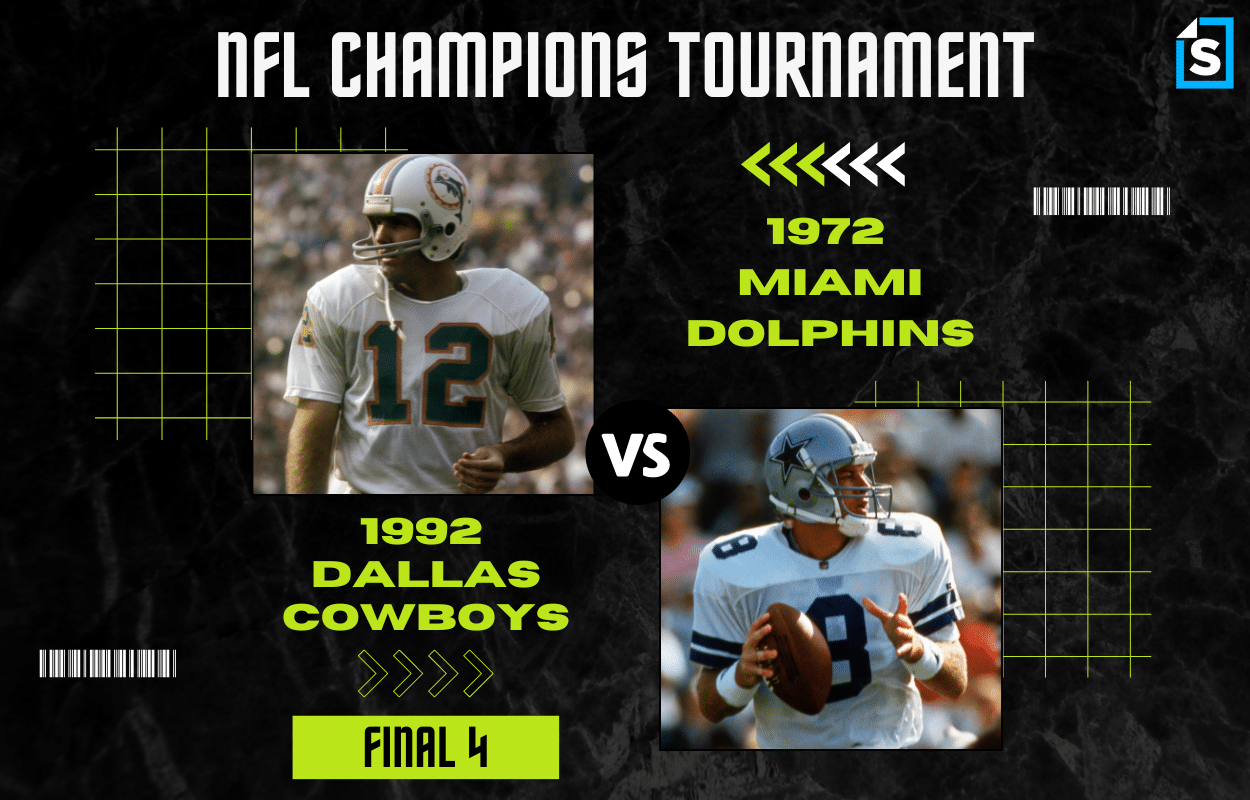
Much has been made over the past half-century about the weak schedule the 1972 Miami Dolphins played en route to becoming the only undefeated Super Bowl champion in history. But here’s the thing with that. They didn’t make the schedule. And how many teams that have played a statistically weak schedule have gone undefeated and won a Super Bowl?
The Dolphins had 14 teams put in front of them in the regular season, and they defeated all 14. Does every team win every game they’re supposed to win? No. But Miami did. And they did so in historic fashion.
The ’72 Dolphins offense gained more yards and scored more points than any other team in the league that year. And the defense allowed the fewest yards and the fewest points. Taking the undefeated part out of it, no other team in NFL history has led the league in yards and points on each side of the football and won a championship. Period.
Were the Dolphins dominant in their three postseason wins? No, they weren’t. But, again, they still beat every team that was put in front of them. And they beat solid squads. The Browns were 10-4. The Steelers, who they had to play in Pittsburgh in the AFC title game due to a silly rule that’s since been changed, were 11-3. And their Super Bowl opponent, Washington, had the best record in the NFC at 11-3.
So you can take the weak schedule argument and run it down the road.
The 1992 Dallas Cowboys have certainly never been accused of playing a weak schedule, not with the last two Super Bowl champions in their division in the New York Giants and the team now known as the Washington Commanders. Dallas went 3-1 against those teams, by the way, losing only to Washington in Week 15. And that defeat was only by three points.
Their other two losses came to the Philadelphia Eagles, who went 11-5, and the LA Rams, who went 6-10. There’s really no excuse for that last one, as they just got outplayed by a weaker team.
Outside of that, however, the ’92 Cowboys dominated. Of their 13 regular-season victories, nine were of the double-digit variety, as were all three of their postseason wins. And their playoff run was undoubtedly more impressive on paper than that of the ’72 Dolphins.
In the Divisional Round, they beat the 11-5 Eagles by a score of 34-10. In the NFC title game against the San Francisco 49ers, who went 14-2 in the regular season, Dallas took a 30-20 victory. And in Super Bowl 27 against a Buffalo Bills team that went 11-5 and was playing in their third consecutive title game, America’s Team waltzed to a 52-17 win.
So while the ’72 Dolphins had the higher margin of victory in the regular season (27.5/12.2 versus 25.6/15.2), the ’92 Cowboys easily have the advantage in the postseason (38.7/15.7 versus 18.3/12.7).
| Team | 1972 Dolphins | 1992 Cowboys |
|---|---|---|
| Regular Season Record | 14-0 | 13-3 |
| Points Scored | 385 (27.5/g-1st) | 409 (25.6/g-2nd) |
| Points Allowed | 171 (12.2/g-1st) | 243 (15.2/g-5th) |
| Pro Bowlers | 9 | 6 |
| AP All-Pros | 8 | 4 |
| Conference Playoff Results | Def. Cleveland Browns 20-14 Def. Pittsburgh Steelers 21-17 | Def. Philadelphia Eagles 34-10 Def. San Francisco 49ers 30-20 |
| Super Bowl | Def. Washington Commanders 14-7 | Def. Buffalo Bills 52-17 |
| SB MVP | Jake Scott | Troy Aikman |
So here we go, folks. Can the 1972 Miami Dolphins remain unbeaten and advance to our title game, or can the 1992 Dallas Cowboys pull off the upset? Let’s find out.
Winner: 1992 Dallas Cowboys
And down go the Dolphins! In a stunning upset, the 1992 Dallas Cowboys took 56.3% of the vote to eliminate the 1972 Miami Dolphins and advance to the title game, where they’ll face a familiar rival.
(2) 1985 Chicago Bears vs. (6) 1989 San Francisco 49ers
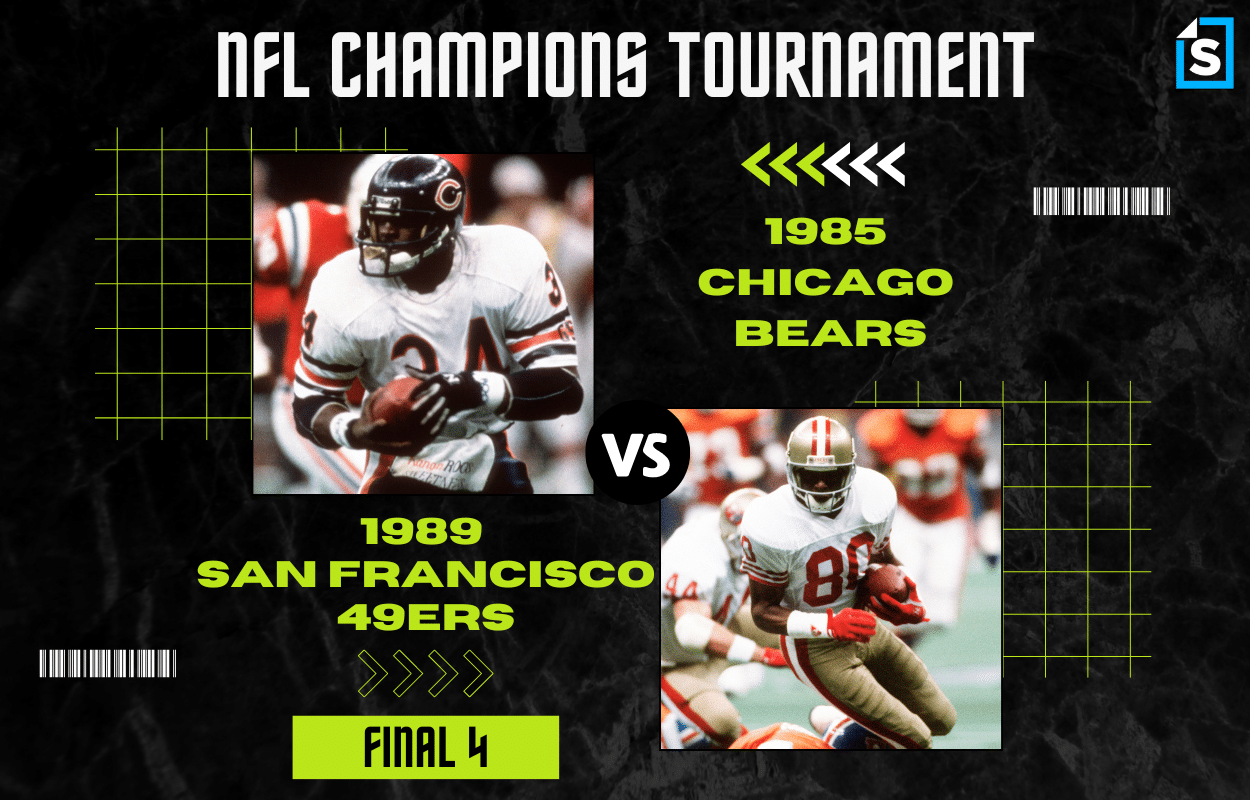
There’s not much more we can say about these two teams that hasn’t been said already throughout this tournament, but I’ll give it a shot.
Simply put, in my eyes, the 1985 Chicago Bears and the 1989 San Francisco 49ers are the top two teams of that decade, which is certainly saying something, given the overall strength of the 1980s. Honestly, I’d even rank several of the losing Super Bowl teams from that decade ahead of some of the teams we saw in this tournament.
One of the big (and easy) knocks on the Bears is that they somehow managed to win just one Super Bowl. And that was perplexing with all the talent they had on that roster on both sides of the ball. But take away one dirty hit on Jim McMahon in 1986, and Chicago likely wins back-to-back titles.
What some may not realize is that while the Bears’ 1985 defense was incredible, the ’86 unit was actually even better, at least in terms of points allowed. But that’s for another day.
The ’85 Bears were just phenomenal. As I’ve mentioned, the defense gets a lot of the credit, as it should, but the offense was excellent as well. In fact, they actually averaged more points per game, at least in the regular season, than did the ’89 Niners (28.5 to 27.6). And that’s not me trying to sway the vote. That’s just a fact.
The postseason, however, is a different story. While the Bears averaged 30.3 points per game in their three playoff victories, the 49ers averaged 42, which is just absurd. And Joe Montana was just unstoppable during that run, a run in which the Niners outscored their opponents 126-26, by the way.
After putting together one of the great regular seasons in NFL history en route to winning the first of two consecutive MVP awards, Montana was lights out in the playoffs. In the 49ers’ trio of trouncings, Montana completed 78.3% of his passes for 800 yards with 11 touchdowns against zero interceptions and took just one sack.
His overall passer rating for that three-game stretch was a ridiculous 146.4. To put that in perspective, his lifetime passer rating in the postseason was 95.6.
But I’ll tell you what. While he certainly didn’t put up the stats Montana did, Chicago quarterback Jim McMahon had a 106.6 rating during the Bears’ playoff run.
And how’s this for a fun connection? In Super Bowl 20, the 1985 Bears set new records for points scored (46) and the largest margin of victory (36). Those marks stood for only four years, however, as both were broken in Super Bowl 24 when the 1989 49ers scored 55 points and beat the Broncos by 45, both of which remain records to this very day.
| Team | 1985 Bears | 1989 49ers |
|---|---|---|
| Regular Season Record | 15-1 | 14-2 |
| Points Scored | 456 (28.5/g-2nd) | 442 (27.6/g-1st) |
| Points Allowed | 198 (12.4/g-1st) | 253 (15.8/g-3rd) |
| Pro Bowlers | 9 | 6 |
| AP All-Pros | 8 | 5 |
| Conference Playoff Results | Def. New York Giants 21-0 Def. Los Angeles Rams 24-0 | Def. Minnesota Vikings 41-13 Def. Los Angeles Rams 30-3 |
| Super Bowl | Def. New England Patriots 46-10 | Def. Denver Broncos 55-10 |
| SB MVP | Richard Dent | Joe Montana |
Overall, this is easily one of my favorite matchups of the entire tournament. And it really is a shame that we’ll have to say goodbye to one of these teams. But that’s the way it goes. So who’s it gonna be?
Winner: 1989 San Francisco 49ers
In yet another upset (at least as far as seeding is concerned), the 1989 San Francisco 49ers also took 56.3% of the vote in their semifinal matchup to knock out the 1985 Chicago Bears, setting up a championship showdown with the rival Dallas Cowboys.
Super Bowl Tournament Championship Game
Ahead of our Championship Game, let’s take a quick look at the semifinal results.
- (20) 1992 Dallas Cowboys def. (1) 1972 Miami Dolphins
- (6) 1989 San Francisco 49ers def. (2) 1985 Chicago Bears
While both were technically upsets as far as seeding is concerned, can we really consider either a surprise at this point in the tournament? And given the storied history between the San Francisco 49ers and Dallas Cowboys, how upset can anyone really be that these two teams ended up in the title game?
Before we get to this championship matchup, let’s take a quick look at the path each of these historic teams took through this tourney to get here.
| 1989 San Francisco 49ers | Opponent | Vote % |
| Opening Round | Bye | N/A |
| Round of 32 | (38) 2019 Kansas City Chiefs | 71.4% |
| Round of 16 | (11) 1978 Pittsburgh Steelers | 60% |
| Round of 8 | (3) 1984 San Francisco 49ers | 100% |
| Final 4 | (2) 1985 Chicago Bears | 56.3% |
| 1992 Dallas Cowboys | Opponent | Vote % |
| Opening Round | (45) 2021 Los Angeles Rams | 75% |
| Round of 32 | (13) 2003 New England Patriots | 100% |
| Round of 16 | (4) 1976 Oakland Raiders | 90% |
| Round of 8 | (21) 1994 San Francisco 49ers | 55% |
| Final 4 | (1) 1972 Miami Dolphins | 56.3% |
Let’s crown a winner, shall we?
(6) 1989 San Francisco 49ers vs. (20) 1992 Dallas Cowboys
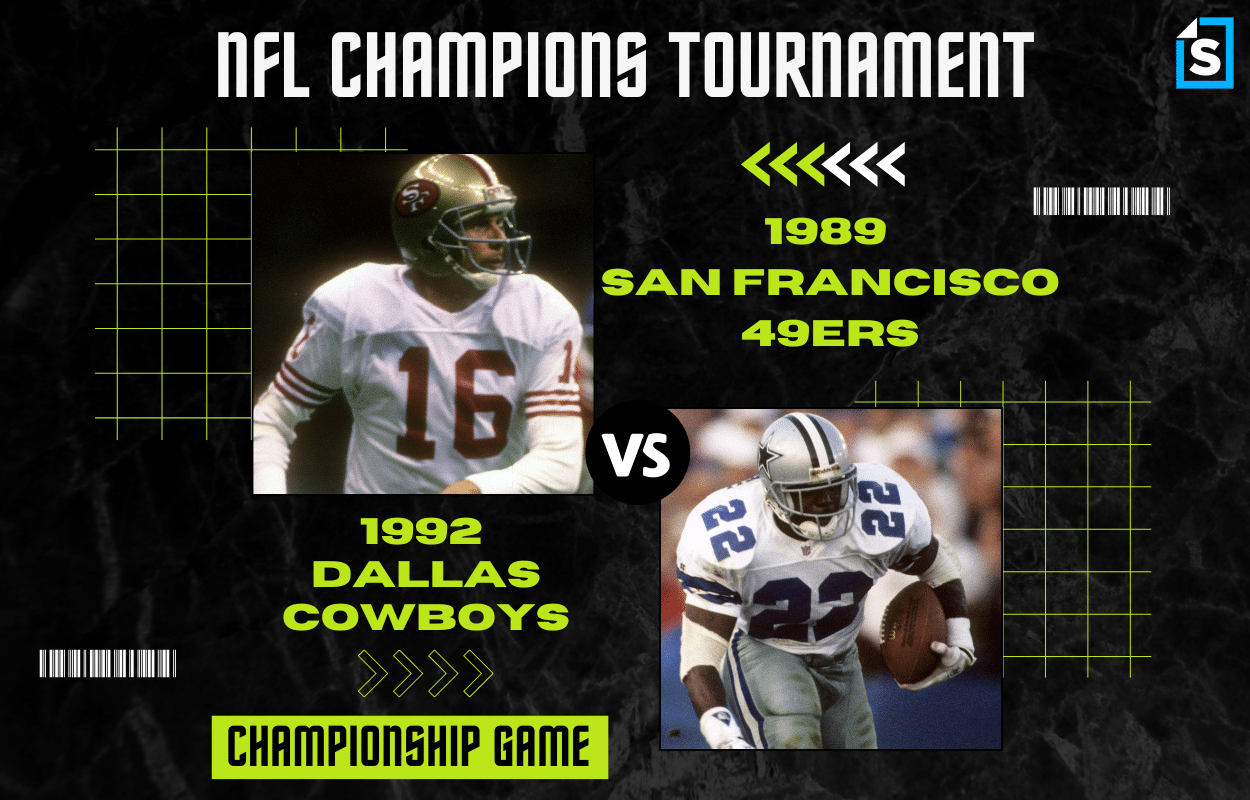
There’s not much more I can say about these two teams that hasn’t already been said as I’ve covered them throughout this tournament. I’ve discussed each squad’s strengths and weaknesses (there aren’t many, if any at all, for either on the latter). I’ve recapped each team’s run through their respective regular seasons. And I’ve gone through just how dominant each was during their separate runs to the Lombardi Trophy.
So I don’t need to run through all of those things again. If you’re just joining us or want a refresher on some of the more specific details on either, I invite you to find their games from the previous rounds and read through those. Or just take a quick peek at this tale of the tape.
| Team | 1989 49ers | 1992 Dallas Cowboys |
|---|---|---|
| Regular Season Record | 14-2 | 13-3 |
| Points Scored | 442 (27.6/g-1st) | 409 (25.6/g-2nd) |
| Points Allowed | 253 (15.8/g-3rd) | 243 (15.2/g-5th) |
| Pro Bowlers | 6 | 6 |
| AP All-Pros | 5 | 4 |
| Conference Playoff Results | Def. Minnesota Vikings 41-13 Def. Los Angeles Rams 30-3 | Def. Philadelphia Eagles 34-10 Def. San Francisco 49ers 30-20 |
| Super Bowl | Def. Denver Broncos 55-10 | Def. Buffalo Bills 52-17 |
| SB MVP | Joe Montana | Troy Aikman |
As an added bonus for this final round, here’s a look at the starting lineups for each team in their respective Super Bowl victories.
Offense
| 1989 49ers | Position | 1992 Cowboys |
| Joe Montana | QB | Troy Aikman |
| Roger Craig | RB | Emmitt Smith |
| Tom Rathman | FB | Daryl Johnston |
| Jerry Rice | WR | Michael Irvin |
| John Taylor | WR | Alvin Harper |
| Brent Jones | TE | Jay Novacek |
| Bubba Paris | LT | Mark Tuinei |
| Guy McIntyre | LG | Nate Newton |
| Jesse Sapolu | C | Mark Stepnoski |
| Bruce Collie | RG | John Gesek |
| Harris Barton | RT | Erik Williams |
Defense
| 1989 49ers | Position | 1992 Cowboys |
| Pierce Holt | LE | Tony Tolbert |
| Michael Carter | ← NT — LT → | Russell Maryland |
| Kevin Fagan | ← RE — RT → | Tony Casillas |
| Charles Haley | ← LB — RE → | Charles Haley |
| Matt Millen | LB | Vinson Smith |
| Michael Walter | LB | Robert Jones |
| Keena Turner | LB | Ken Norton Jr. |
| Darryl Pollard | CB | Kevin Smith |
| Don Griffin | CB | Larry Brown |
| Chet Brooks | SS | Thomas Everett |
| Ronnie Lott | FS | James Washington |
The number of Pro Bowlers, All-Pros, and Hall of Famers in this dream matchup is absolutely ridiculous. And however this title game turns out, Charles Haley wins. So that’s fun.
So here’s how I see things. At quarterback, the edge would have to go to Joe Montana over Troy Aikman. And that’s not a slight on Aikman at all. But ask just about any NFL fan, and you’d get that same answer.
In the backfield, I’d take Emmitt Smith and Moose Johnston over Roger Craig and Tom Rathman. And part of that decision is undoubtedly due to the strength of the 1992 Cowboys’ offensive line, which I firmly believe is superior to that of the ’89 Niners.
At wide receiver, Dallas had a fantastic duo in Michael Irvin and Alvin Harper. But San Francisco had arguably the greatest football player of all time in Jerry Rice. And John Taylor was no slouch himself. In the tight end battle, I’d call Jay Novacek vs. Brent Jones a wash.
On the defensive side of things, we’ve already discussed how Charles Haley is a member of both units. So both teams get points for that. Outside of Haley, the best overall player on either side is San Francisco safety Ronnie Lott, followed by Dallas linebacker Ken Norton Jr. But even beyond those guys, both teams were loaded with talent, which is why both allowed under 16 points per game.
So you now have to ask yourself which defense could make more stops. Both offenses were obviously loaded with talent and could beat you in so many ways. So this game would come down to defense, and both were so ridiculously strong, especially when it mattered most.
The Niners’ defense held John Elway and a high-octane Broncos offense to 10 points in Super Bowl 24, not allowing No. 7 to throw a touchdown pass while picking him off twice.
And the Cowboys’ defense held the Buffalo Bills’ offense to just 17 points in Super Bowl 27 while forcing a record nine turnovers.
So here we go, folks. It’s the 1989 San Francisco 49ers versus the 1992 Dallas Cowboys for the title of the greatest Super Bowl winner of all time. Who you got?
After six rounds and 55 games, we finally have a winner.
Drumroll, please. (Just do it in your head for a second, will ya?)
With 80% of the vote in our Championship Game, the winner of Sportscasting’s season-long Super Bowl Tournament is…
The 1989 San Francisco 49ers.
And given the talent on that team on both sides of the ball, one would be hard-pressed to argue with this overall result.
I’d like to thank each and every one of you who voted throughout the season, and I hope you learned some things about these historic squads that maybe you didn’t know before.











